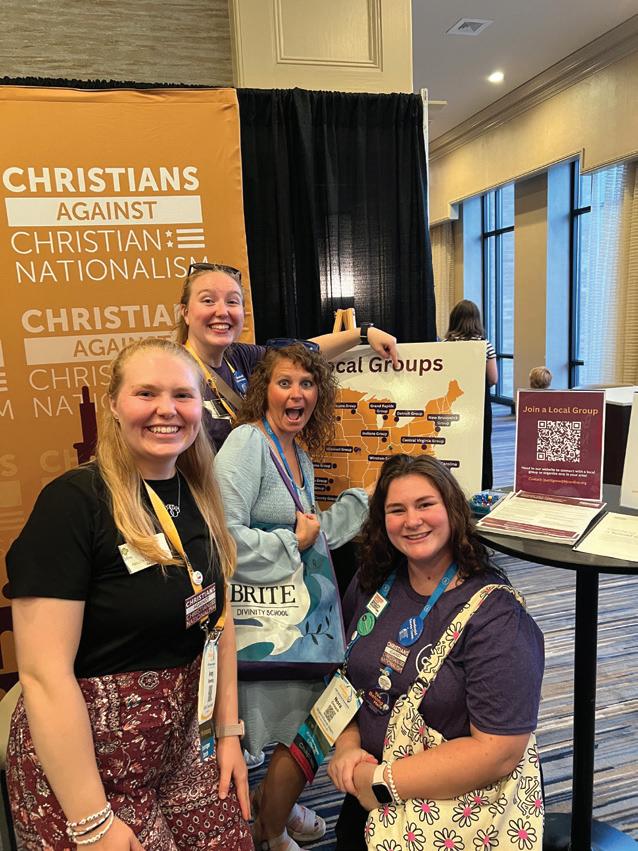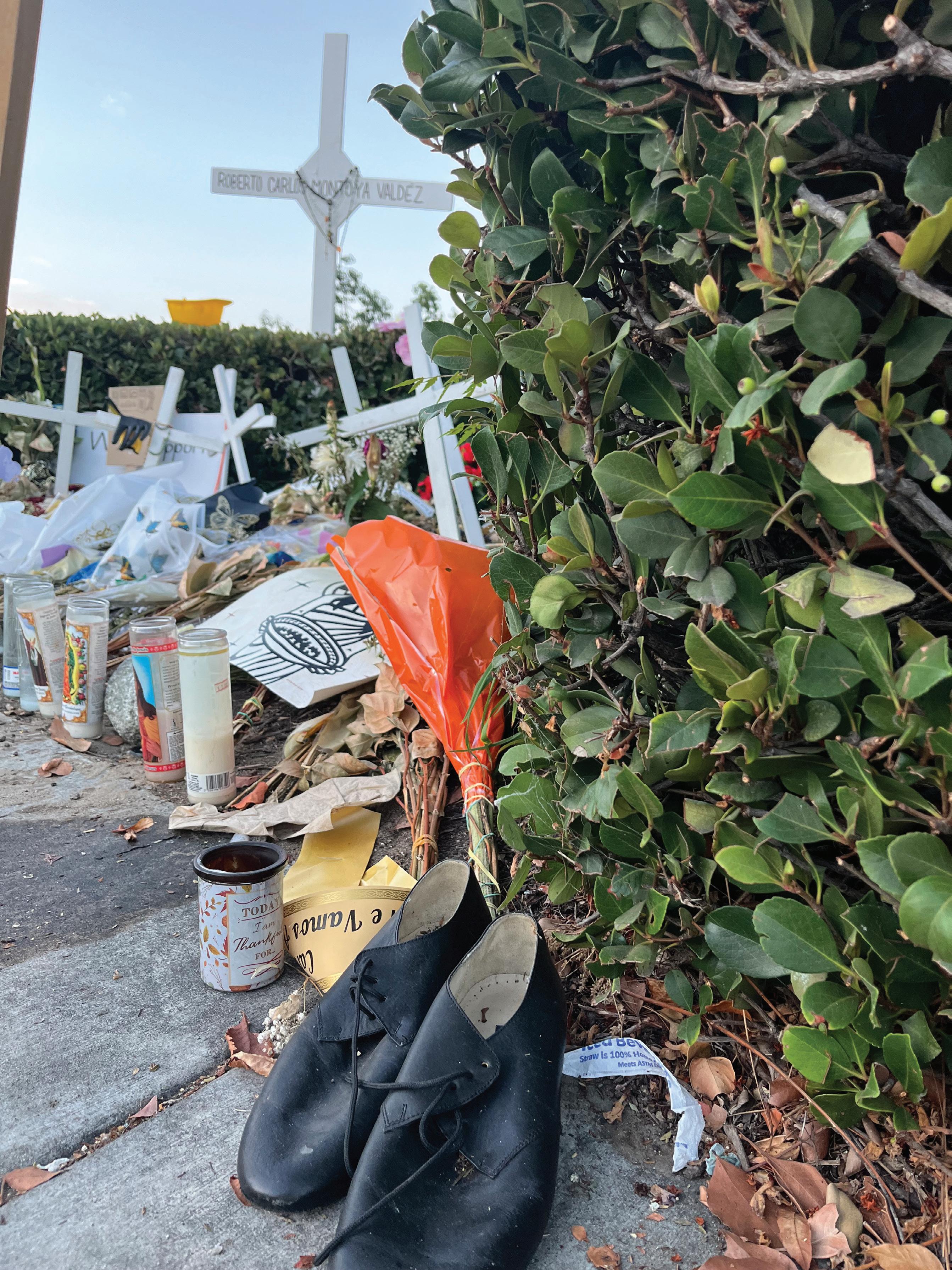
Finding hope amid constant challenges to faith freedom
AMANDA TYLER explains an attack on pulpit protections
HOLLY HOLLMAN explores a case the Supreme Court got right Meet the 2025 class of BJC Fellows


Finding hope amid constant challenges to faith freedom
AMANDA TYLER explains an attack on pulpit protections
HOLLY HOLLMAN explores a case the Supreme Court got right Meet the 2025 class of BJC Fellows
Nine months into the second Trump administration, once-hypothetical threats to religious freedom are now a reality. Mass deportations, a new travel ban, efforts to weaken the Johnson Amendment, voting rights rollbacks, and a nationwide school voucher program that was passed through the budget reconciliation bill are reshaping the legal and cultural landscape.
At the state level, proposals such as mandatory displays of the Ten Commandments and Texas’s S.B. 11 — which pushes state-organized prayer in schools — signal a resurgence of policies that blur the church-state line. The Supreme Court has added to this shift, issuing decisions in three key religion cases this term.
BJC continues to raise the alarm while equipping readers to respond. This issue provides tools to understand current threats, take action, and find hope in the future.
Get a full picture of the latest attempt to undermine the protections of the JOHNSON AMENDMENT in Amanda Tyler’s column on page 3, and look at the illusion of choice created by a court filing on page 7.
Learn more about the three recent church-state decisions from the U.S. Supreme Court on page 4, and hear from Holly Hollman on page 5 about why the deadlocked decision in the RELIGIOUS CHARTER SCHOOL CASE is a victory for faith freedom — at least for now. We also have good news to share about a ruling STRIKING DOWN LOUISIANA’S TEN COMMANDMENTS LAW on page 9.
The “Big Beautiful Bill” signed into law this summer is more like a big, bad betrayal of religious freedom in order to provide tax cuts for the wealthy and create a SCHOOL VOUCHER SCHEME. We explain what happened on page 6. Meanwhile, in Texas we’re seeing an absurd STATE-ORGANIZED PRAYER law that undercuts religious freedom for all in schools (see page 8). And Dr. Sabrina E. Dent discusses ongoing threats to the RIGHT TO VOTE on page 24.
Immigration enforcement is creating chaos and undermining religious freedom for many. Learn more about the intersection of RELIGIOUS FREEDOM AND IMMIGRATION on pages 10-15, including a reflection from the Rev. Janna Louie about what’s HAPPENING IN LOS ANGELES, a way you can push back on the new TRAVEL BAN, and how you can join us for this year’s Shurden Lectures, which focus on SANCTUARY AND GOVERNMENT REPRESSION OF MIGRANT JUSTICE.
What else can you do in this time?
Consider joining or starting a LOCAL GROUP to counter Christian nationalism — see the options on pages 16-17.
Check out our latest class of BJC FELLOWS on pages 18-23, who are ready to create change now and throughout their careers.
Stay current on what’s happening with BJC’s RESPECTING RELIGION PODCAST. Go to page 26 for a list of recent episodes.
And, be inspired by others doing this work. Remember the LEGACY OF JAMES DUNN on page 27, and meet the newest MEMBERS OF OUR TEAM on page 31. We are all in this together.
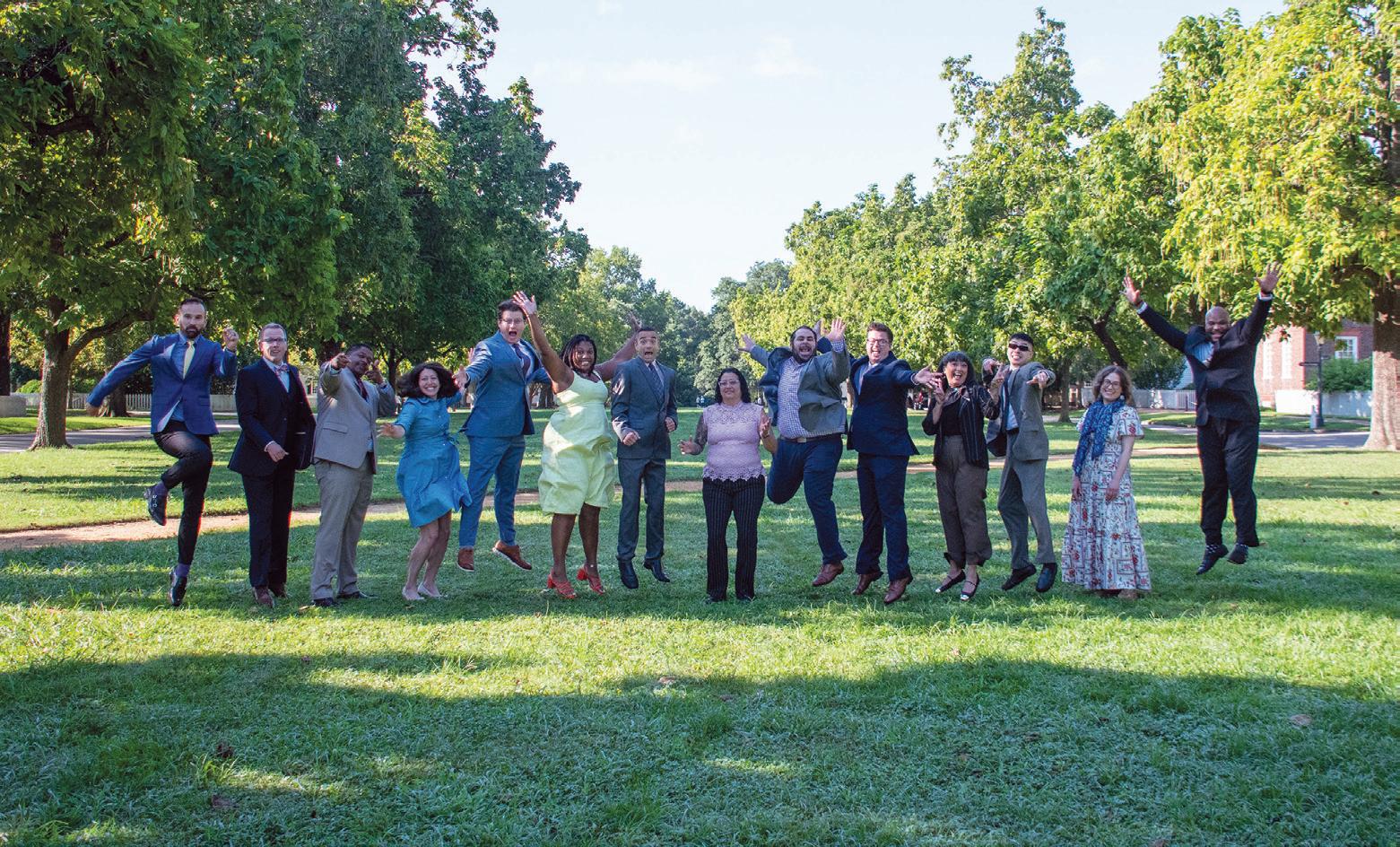
COVER PHOTO: A memorial in Monrovia, Calif., in Los Angeles County remembers Roberto Carlos Montoya Valdez, a 52-year-old man from Guatemala who died fleeing ICE agents. He ran from a Home Depot parking lot where the enforcement was taking place, and he was struck and killed by an SUV. Photo by the Rev. Janna Louie. For more on the impact of our country’s immigration policies, see pages 10-15 of this magazine.
By Amanda Tyler, BJC Executive Director
Readers of this magazine and supporters of BJC will know that we have faced many challenges to religious freedom — and to pluralistic democracy more broadly — this year. But, after months of troubling executive orders, acts of Congress, bills in state legislatures and court decisions, the latest challenge in early July came from an unlikely source: a filing in a federal district court in East Texas. Its target? The part of the tax code commonly known as the “Johnson Amendment.”
The Johnson Amendment provides that all 501(c)(3) organizations may not “participate in, or intervene in … any political campaign on behalf of (or in opposition to) any candidate for public office” without risking their tax-exempt status.
On July 7, we saw a novel interpretation of the Johnson Amendment that is at odds with the official guidance from the IRS, not to mention the longtime understanding of it. The parties in this litigation — which include the commissioner of the Internal Revenue Service, the National Religious Broadcasters and a couple of churches — filed a joint motion claiming that “[w]hen a house of worship in good faith speaks to its congregation, through its customary channels of communication on matters of faith in connection with religious services, concerning electoral politics viewed through the lens of faith” it does not violate the law. Rather, they argue, these communications should be viewed as “a family discussion concerning candidates.”
As I write this column, it is not certain that the judge will grant this joint motion. But if he does, the law will become even murkier than it is today. The parties are bypassing all the normal avenues for making law, such as amending the law by filing and passing a bill in Congress or by engaging in the usual rulemaking and guidance process at the IRS. Therefore, any reinterpretation of the law put forward here applies only to the parties in this case and not more broadly. (Read more on page 7.)
It is unsurprising that those who would want to invite partisan politicking into houses of worship are not going to Congress to make that happen. When they tried that in 2017, their efforts failed given how deeply unpopular the proposal is. BJC helped organize opposition to the proposed change in the law from the faith community, raising the concerns we heard from many about how partisan campaigning would cause deep divisions and distraction from mission in diverse communities all across the country. This time,
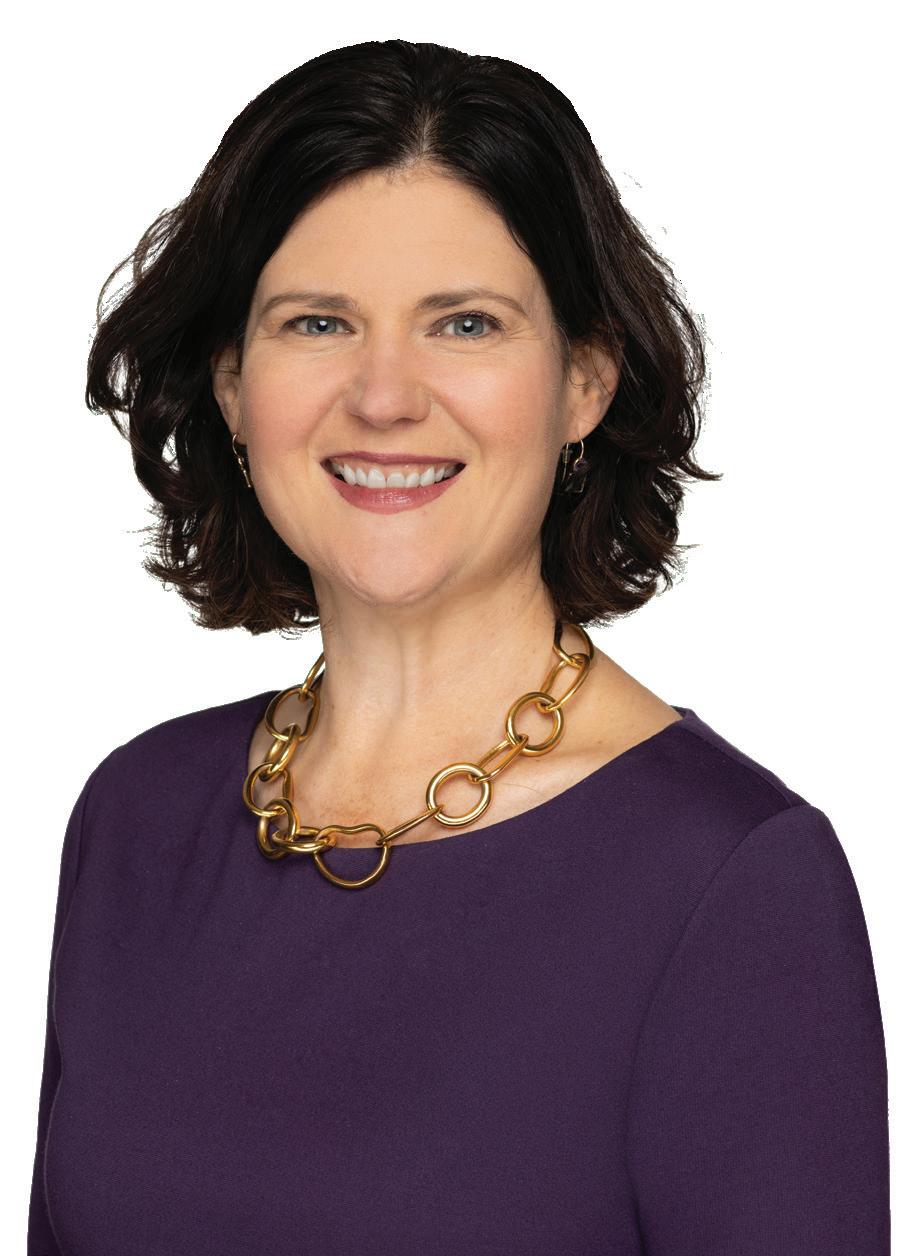
we are again raising our voice about the dangers of the proposed change, including by joining nearly 2,000 nonprofit organizations from across the country that have come together to defend the Johnson Amendment.
Though the litigants in the court case couch the issue in terms of speech and conversation, this issue is really about money in politics. In 2017, the nonpartisan Joint Committee on Taxation scored what the impact of a change in the law would be. They estimated that billions of dollars in campaign contributions would begin to flow through the nonprofit community, causing enormous changes in both campaign finance and in the integrity of charities — including houses of worship.
Those that claim that communications in churches are just “family conversations” that happen in person without further repercussions must have not been paying attention to religious life lately. For decades, houses of worship of all sizes have used technology to broadcast their messages to greater audiences. That tendency only increased during and since the COVID-19 pandemic. Many — if not most — churches livestream their services, posting the recordings on their websites and social media for viewing later. Knowing that endorsements on behalf of candidates in partisan races, up and down the ballot and in primary and general elections, could be broadcast in these ways invites candidates, parties and their supporters to target houses of worship for their endorsements.
The 501(c)(3) organizations, including houses of worship, that want to get involved in partisan races are the exceptions and not the general rule. Most nonprofits regularly fulfill their missions while participating in nonpartisan ways in civic life. All 501(c)(3) organizations can encourage voting, improve voter education, speak out regarding moral issues of concern and call for strong leadership from elected leaders — all while avoiding partisan engagement in candidate elections.
BJC will continue to advocate for nonpartisanship for nonprofits. Your donation helps fuel this important work. You can give online at BJConline.org/give or go to the back of this magazine for our mailing address. In this moment when the institutions of pluralistic democracy and our freedoms are under attack, we need more involvement from a civic society that is not co-opted by partisanship and money in politics.
In what is starting to feel like a yearly tradition, the recent Supreme Court term was another consequential one, with three decisions that have the potential to influence the legal landscape of religious liberty for years to come.
Deadlocked Court denies religious charter school
First, a case that could have changed the trajectory of religious liberty in public schools instead fizzled out in an anticlimactic 1-page, deadlocked, unsigned opinion in May.
The case, Oklahoma Statewide Charter School Board, et al. v. Drummond, dealt with the question of whether Oklahoma could be required to include a religious charter school — St. Isidore of Seville Catholic Virtual School — in its public school system. Such a requirement would force public funding of Catholic education — counter to Oklahoma law — and fundamentally undercut the institutional separation of church and state.
The case began when the Oklahoma Statewide Charter School Board approved the application of the decidedly Catholic school, making it the first religious charter school in the country. The Oklahoma Supreme Court struck down its application, and the case made its way to the U.S. Supreme Court.
The 4-4 deadlock, thanks to the recusal of Justice Amy Coney Barrett, means the lower court decision stands and states cannot be forced to run religious schools.
BJC and other religious groups filed a brief with the Court in April, arguing that our nation’s history of protecting religious liberty for all has required that the government refrain from engaging in or directly funding religious education.
For more on this decision, see BJC General Counsel Holly Hollman’s column on page 5.
Unanimous SCOTUS focuses on ‘religious purposes’ in exemption
The second of the three cases, Catholic Charities Bureau v. Wisconsin Labor & Industry Review Commission, was a 9-0 unanimous decision.
The June decision held that denying a religious exemption under Wisconsin’s unemployment statute to Catholic Charities Bureau was “textbook discrimination” and a violation of the First Amendment. The state of Wisconsin originally denied the unemployment compensation exemption, finding that Catholic Charities was not “operated primarily for religious purposes.” The reasons included that the charity was neither engaged in proselytization nor serving people only of their faith.
All nine justices disagreed. Wisconsin’s definition of “religious purposes,” they held, was too narrow and discriminated between different faith perspectives in violation of the First Amendment.
The Court reiterated: “‘The clearest command of the Establishment Clause’ [of the First Amendment] is that the government may not ‘officially prefe[r] one religious denomination over another.’”
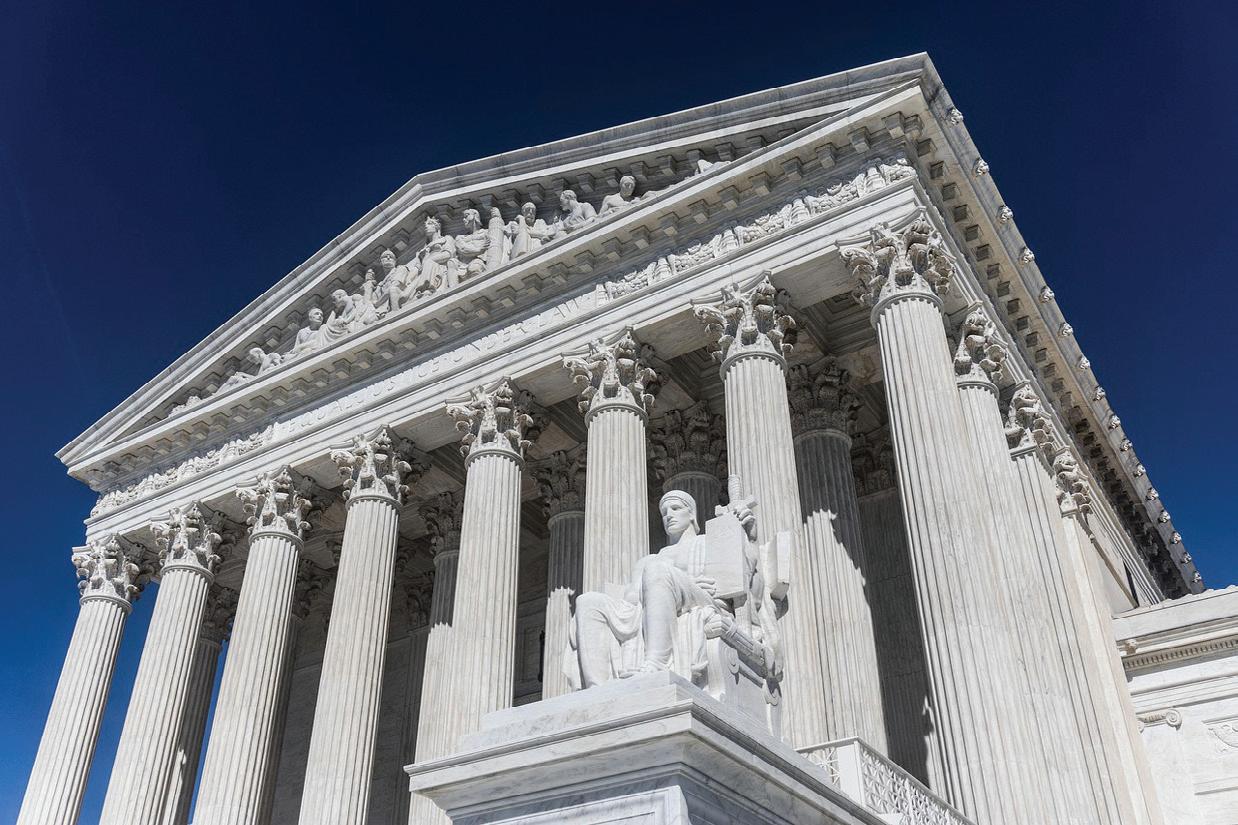
service-based ministries, not just worship or proselytizing,” Hollman said. “Religious liberty is best secured when accommodations are tailored, fair, and sustainable.”
Court says parents have opt-out right from school instruction interfering with religious upbringing
Finally, in a controversial case about public education and LGBTQ+ inclusion, the Supreme Court sided with a group of parents seeking notice and the opportunity to opt their children out of public school curriculum that conflicts with the parents’ religious beliefs.
The dispute central to Mahmoud v. Taylor arose after the Montgomery County (Maryland) Board of Education decided to withhold parental opt outs (after first allowing them) from curriculum involving LGBTQ+ inclusive stories in their children’s elementary school.
In its 6-3 ruling, the Court said stories for young children that celebrate same-sex marriage and affirm transgender identity are both “hostile” to parents whose religious beliefs reject those ideas and coercive to their children. The decision grants a preliminary injunction, which entitles parents in that school district to receive both notice and the ability to opt out.
The ruling emphasized that it does not take a stance on the educational value of the storybook program or on the school board’s stated goals of teaching children to learn to live together in a multicultural society. The opinion also does not confer on parents a general right to control curriculum according to their religious beliefs.
“[This] decision recognizes the importance of religious formation in the lives of children and the heavy responsibility of public schools to serve all families,” Hollman said. “This decision does not provide a general right to veto or reshape public school curriculum based on religious objections or to undermine the educational mission of public schools and the shared civic space they represent.”
—BJC staff reports
By Holly Hollman, BJC General Counsel
As we head toward a new Supreme Court term this October, the consequential decisions of the most recent term are continuing to make an impact. Amanda and I discussed several in our season finale of the Respecting Religion podcast (see page 26), with three squarely on the religious freedom front (see page 4).
Among the most significant decisions was one about which the Court said the least.
The full unsigned opinion in Oklahoma Statewide Charter School Board, et al. v. Drummond states: “The judgment of the Supreme Court of Oklahoma was affirmed by an equally divided Court.”
With that one sentence, the Court rejected a proposed religious charter school, one dedicated to the evangelizing mission of the Catholic Church. BJC applauded the decision, which was issued surprisingly soon — less than a month! — after thorough and vigorous oral arguments.
In addition to breathing a sigh of relief, those of us who advocate for religious freedom for all should take stock, seek to understand what is at stake, and reinforce our commitment to the institutions that serve everyone. There is more work ahead.
The proposed Catholic charter school, St. Isidore of Seville Catholic Virtual School, was controversial from the start. BJC spoke out, opposing the notion of a government-established religious school as a threat to religious freedom and supporting litigation efforts by organizing and joining with other religious groups to file a brief in the case. People of all faiths and no faith decried the proposal as a fundamental threat to religious freedom and the charter school movement. Yet, the school made it to the highest court, claiming a First Amendment right to operate within Oklahoma’s public school system. Thankfully, and based on a 4-4 split among the participating justices, it failed. Justice Amy Coney Barrett took no part in the proceedings, although she never gave a reason for recusing herself from this case.
The identity of how the justices voted is unknown, but many presume Chief Justice John Roberts joined the three liberal-leaning justices for this deadlocked result. Chief Justice Roberts authored three cases in recent years that sided with challengers to state laws designed to keep the institutions of religion and government separate.
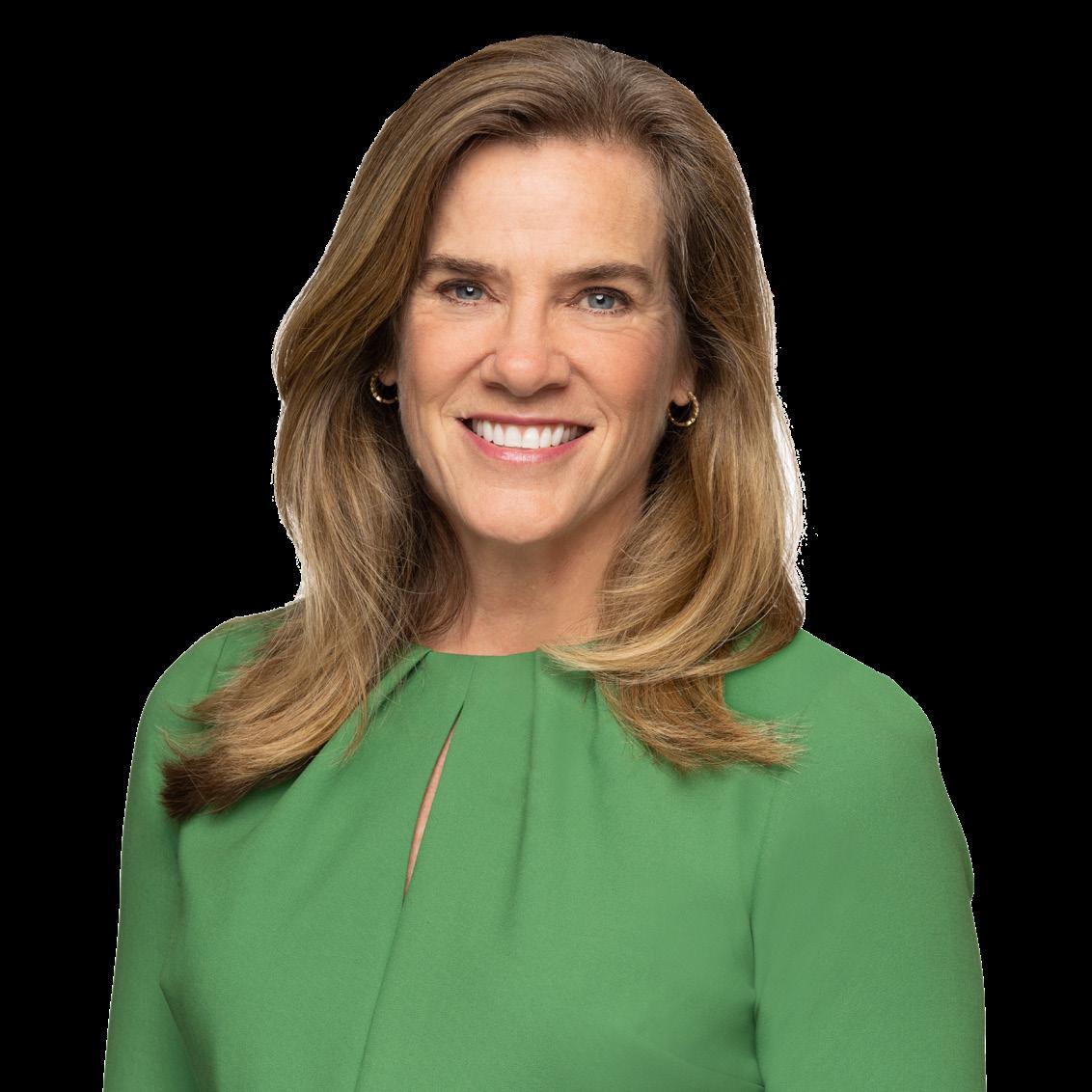
This case, however, may have presented a bridge too far for him. During oral argument, the Chief pointedly noted that St. Isidore’s argument to require Oklahoma to establish and fund a Catholic charter school relied heavily on those three cases: Trinity Lutheran, Espinoza and Carson. BJC also was involved in all three of those by filing friend-of-the-court briefs in defense of separation principles.
During the arguments, the Chief said, “Those [cases] involved fairly discrete state involvement. … I mean, this does strike me as a much more comprehensive involvement, and I wonder what case you think supports the position with respect to that level of involvement.” No good answer came from the attorney for the school.
As counsel for the other side — representing Oklahoma Attorney General Gentner Drummond — said repeatedly during the arguments: Charter schools are public schools. Public schools by definition must be open for all and are constitutionally prohibited from sponsoring prayer, religious instruction and other religious exercises.
Of course, the fact that four justices on the Supreme Court would have ruled differently is cause for continuing concern and illuminates the need for continued advocacy. I was particularly troubled by questions from Justice Brett Kavanaugh at oral argument. As a justice who often seems to be working hard to be viewed as moderate, he was surprisingly aggressive in support of the school’s position. Kavanaugh’s questions suggested he viewed the case as about parental choice or private religious organizations participating in a program open to all. In a long line of questioning, he seemed to be pleading to help him understand why religion should be treated differently. Oklahoma, however, forcefully pushed back. Charter schools are public schools — established, fully-funded, operated and supervised by the state. They don’t indoctrinate in religion.
BJC will continue to oppose state-sponsored religion. We welcome and defend the participation of religious entities in public life, and we believe that religious freedom works best when there is meaningful separation between the institutions of religion and government. As we said in our brief, religious and civil institutions must remain distinct. Our Constitution’s First Amendment sets it up that way, and it’s been reaffirmed across generations that doing so safeguards the integrity of religious communities as well as the legitimacy of the state.
By Israel Igualate, BJC Communications Director
For the first time in our nation’s history, Congress has created a national school voucher scheme that directs federal tax dollars to private, often religious, schools. Disguised as a tax credit, the program was tucked into the “One Big Beautiful Bill,” the budget reconciliation package which passed with only Republican support and was signed by President Donald Trump on July 4.
Under this new law, individuals can claim a dollar-for-dollar fed eral tax credit (up to $1,700 each year) for contributions to nonprofit scholarship-granting organizations. There is no other federal tax program that provides a full refund for donations. Those organizations then provide tuition scholarships to families sending their children to private schools, including religious schools. On paper, it looks like philanthropy. In practice, it means every taxpayer is now draining public funds to subsidize religious education.
This scheme threatens two pillars of American life: our public schools and our religious freedom.
Public schools, already stretched to serve the vast majority of America’s children, will face even deeper shortfalls as federal dollars are rerouted into private institutions. The promise of equal opportunity for all students weakens when resources are drained away to fund private education for a select few.
Even more alarming, this voucher system erodes the very principle of religious liberty. The First Amendment ensures that government stays out of religious formation, leaving families and faith communities free to teach and practice their faith without interference. By using federal tax credits to fund religious schools, Congress has entangled government and religion in ways our Founders warned against.
But this story is not finished. The voucher program only takes effect in states that opt in. Through a yet-to-be-determined process, states will soon be tasked with deciding whether to bring this scheme to their states. That means communities still have a choice: to stand for public schools and for religious freedom, or to accept a system that undermines both.
The decision before us is stark. On a holiday meant to celebrate liberty, Congress chose to erode it. It will soon be up to the states, and to all of us, to insist on upholding it.
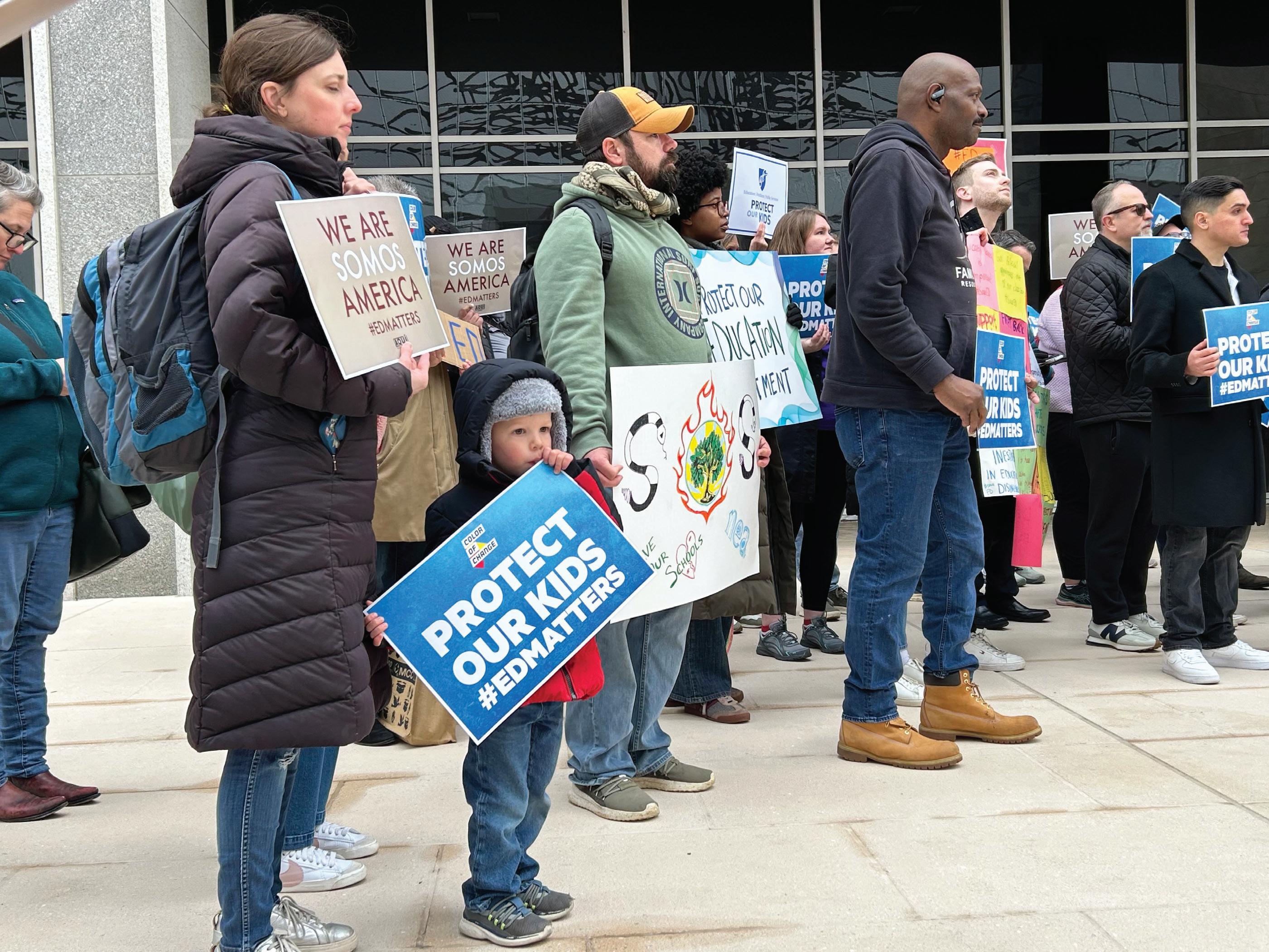
Protesters gather outside the Department of Education in Washington, D.C., on March 14 to rally against mass firings as the Trump administration targeted the Department of Education.
by
The Budget Reconciliation Bill — also known as the “One Big Beautiful Bill” — passed the Senate July 1, with Vice President JD Vance casting a tiebreaking vote, and it passed the House on July 3. It retains a modified version of the National School Voucher Program in which states can opt into the program. The House of Representatives originally passed a version of the bill May 22 that included a more robust voucher program, but on June 27, the Senate Parliamentarian ruled that the program violates the Byrd Rule and had to be removed from the bill. However, a modified version was added back in before the Senate vote on July 1.
The “Big Beautiful Bill” really is a big, bad betrayal of religious freedom in order to provide tax cuts for the wealthy, offsetting trillions in tax cuts by cutting health care and nutrition programs. Even with those cuts, according to the Congressional Budget Office, it will add nearly $3.5 trillion to the deficit over the next decade. Meanwhile, the national school voucher program alone is projected to add $26 billion to the national deficit over the next ten years.
By Israel Igualate, BJC Communications Director
In the bowels of a turreted chateau a block north of the Grauman’s Chinese Theatre in Los Angeles are magicians, illusionists, and their students, teaching and learning the fundamentals of the black arts of magic. One of the first and most fundamental illusions an aspiring magician learns on day one is called “the force,” or the “magician’s choice.”
The illusion is simple: the magician gives the audience the impression they have the freedom to influence the trick, all while controlling the outcome. In layman’s terms, it’s sleight of hand used to conceal what’s really happening.
In a Texas courthouse, a different kind of sleight of hand recently unfolded. In a filing in a lawsuit brought by two churches and the National Religious Broadcasters, the IRS suggested that churches could endorse candidates from the pulpit without violating the Johnson Amendment, the long-standing part of the tax code that bars tax-exempt organizations from partisan campaigning. On its surface, this looked like a change in the law. But as with the magician’s choice, the appearance of what is said masks the reality: the law itself has not changed.
The illusion of choice is what makes the magician’s trick work. Here, too, the illusion is dangerous. By suggesting that a pulpit endorsement is merely a “family discussion concerning candidates,” the IRS risks turning churches into political action committees while allowing them to keep their tax-exempt status. Such a shift would upend decades of established guidance and undermine the very integrity of religious communities.
Polling consistently shows that Americans, including clergy themselves, oppose pulpit endorsements. They know what is at stake: sacred spaces should not become platforms for political candidates. The majority prefers the clarity and integrity the Johnson Amendment has long ensured. The law has been a safeguard against the co-opting of faith by politics, and preserving it is essential for protecting both religious liberty and democratic institutions.
For more than 70 years, the Johnson Amendment has preserved the independence of houses of worship by shielding them from political pressure and the risks of becoming tools of partisan campaigns. It has never prevented clergy from speaking out on moral issues or leading their congregations in civic engagement. What it has done is draw a bright line between sacred spaces and electoral contests. Diluting that line now would create new pressures on religious leaders to align with candidates, risk dividing congregations, and entangle churches in campaign agendas.
The trick of the force is not in what the audience sees, but in what it fails to notice. The same is true here. The filing may appear to open the door to political endorsements, but it conceals the risks and pressures that follow. The freedom it promises is not freedom at all, but entanglement. And the cost of falling for the illusion could be the very independence of the pulpit.
For resources on this issue, visit our website at BJConline.org/JohnsonAmendment
IRS Proposal to Allow Political Speech in Churches Is Bad Advice
By Holly Hollman for Bloomberg Tax
Unfortunately, if the IRS’ recent litigation position sticks, we can expect to see more political operatives prowling the pews, more congregations fractured by party lines, and more threats of charitable donations misdirected into the coffers of political campaigns.
The IRS Says Churches Can Endorse Political Candidates. In Texas, Many Already Were.
By Robert Downen for Texas Monthly
A weakened Johnson Amendment is likely to embolden already politicized institutions, and it could lead to an influx of untraceable political contributions via churches, which are exempt from most financial disclosures. ... “It makes it more likely that [churches] will be co-opted for political gain, and that their mission will be compromised,” said Amanda Tyler, executive director of [BJC].
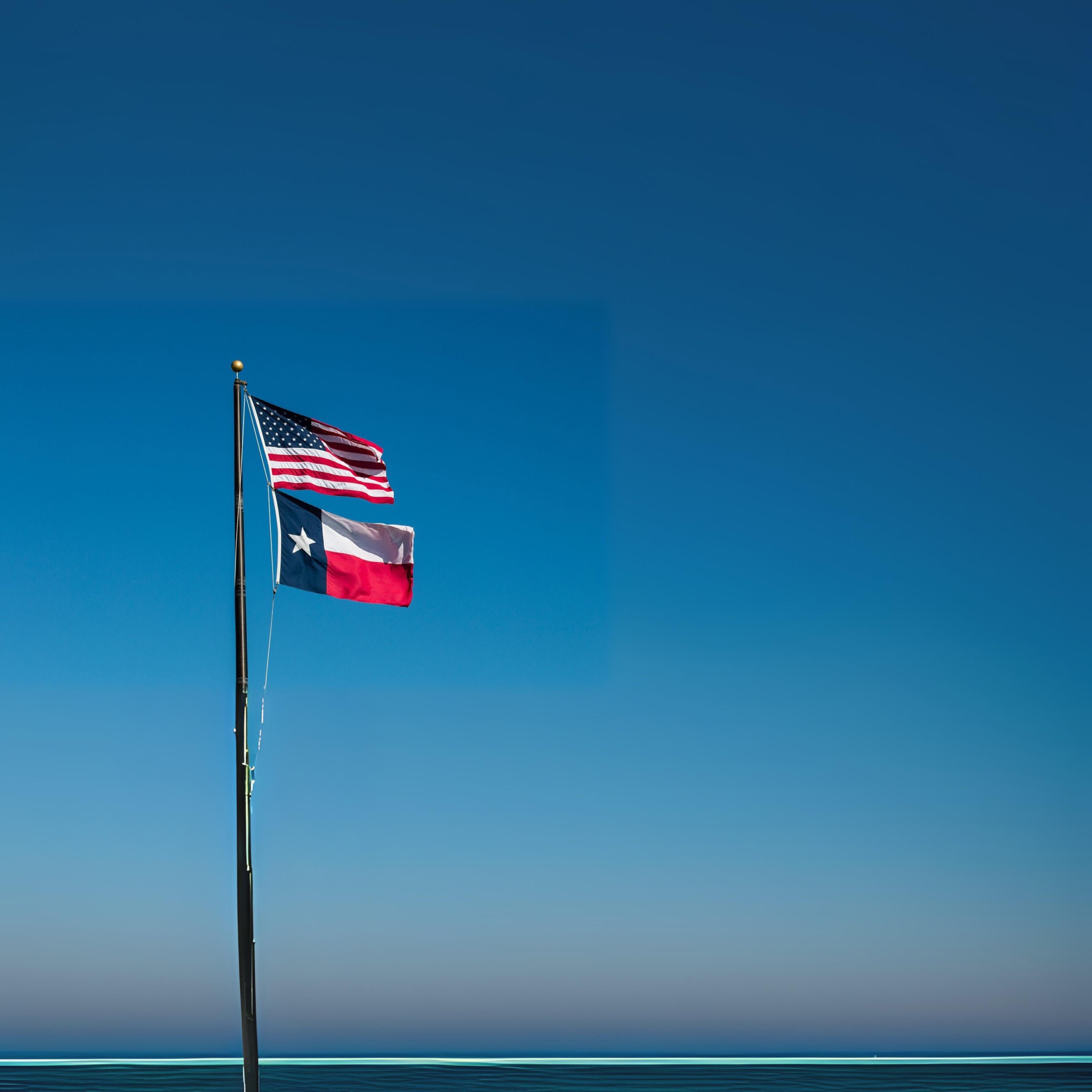
No kid should have to choose between faith and fitting in, and no teacher should have to moonlight as a referee for who prayed, how they prayed, and whether the right form was filed.
By Israel Igualate, BJC Communications Director
said prayers? Students, teachers, administrators? Doesn’t say. What falls in the category of “other religious text” and who leads that? Doesn’t say.
doesn’t exist. For, to quote the late Rev. Dr. James Dunn, a former executive director of BJC: “As long as there are math tests, there will be prayer in schools.”

ruling is an important victory for Establishment Clause principles in the public school context, where advocates of Christian nationalism have sought to advance a narrow religious agenda and promote a false historical narrative.
pressing a preference in long-standing religious debates among — and between — religious denominations.
The 5th U.S. Circuit Court of Appeals agreed with the families, issuing a unanimous decision June 20 that stopped the law from taking
The appeals court explained that the matter was decided by the U.S. Supreme Court in a 1980 case, Stone v. Graham. There, the Supreme Court invalidated a similar Kentucky law requiring Ten Commandments postings in every classroom. In , the Court said there was no
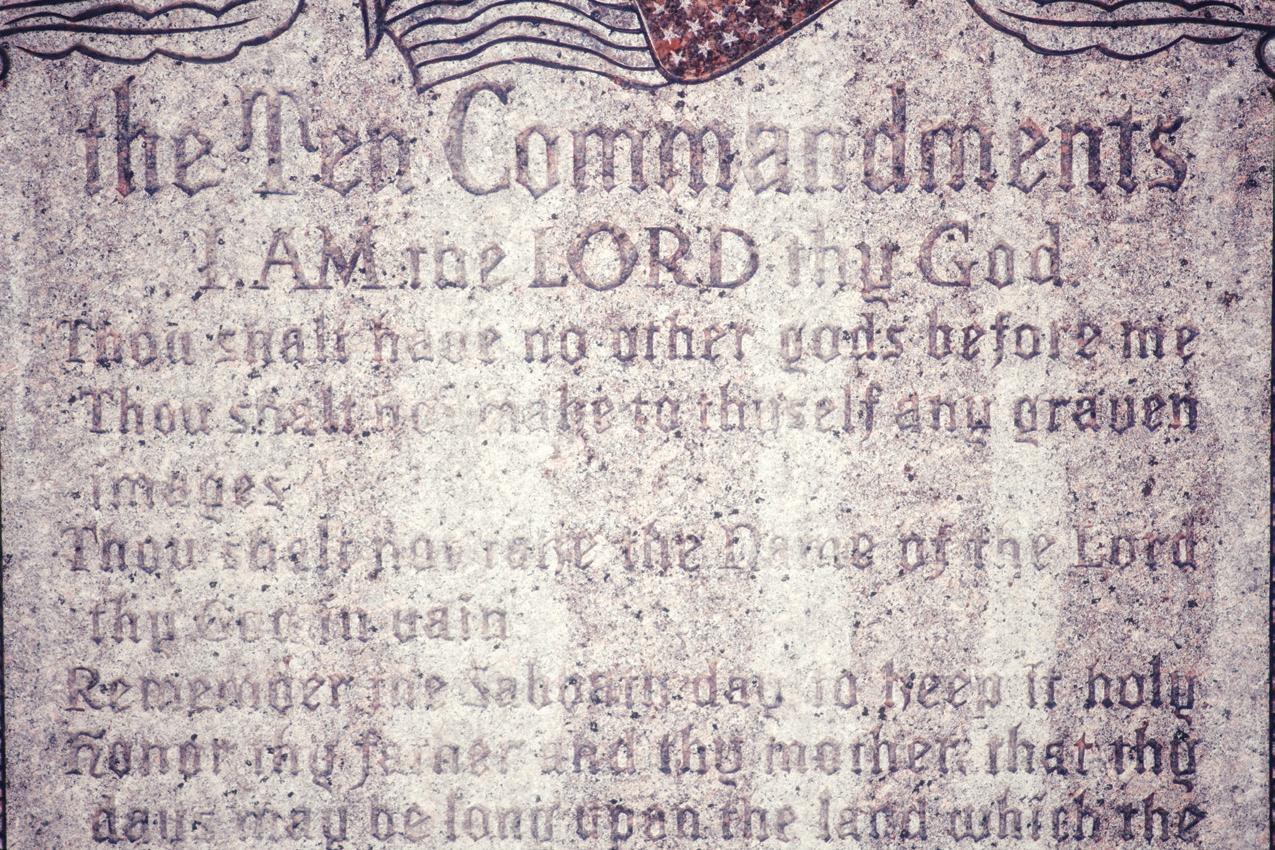
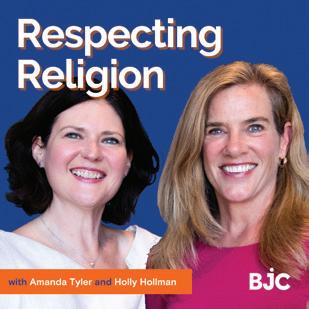
Want to hear more?
law (as needed to pass the Court’s “Lemon” test from the 1971 Lemon v. Kurtzman decision) and that the required posters were not integrated into a curriculum, thus serving no educational purpose.
In this 2025 case, Louisiana argued that because the Supreme Court abandoned the Lemon test in the 2022 Kennedy v. Bremerton decision (which instead calls for a “history and tradition” test), that Stone is no longer controlling. The 5th Circuit rejected that argument. The ruling is an important victory for Establishment Clause principles in the public school context, where advocates of Christian nationalism have sought to advance a narrow religious agenda and promote a false historical narrative.
Louisiana is not the only state testing whether Stone v. Graham is still intact: Texas and Arkansas both passed laws this year that require the posting of the Ten Commandments in classrooms, and both are being challenged in court. If another state law gets a different court ruling, the issue could make its way back up to the U.S. Supreme Court.
—BJC staff reports
Amanda Tyler and Holly Hollman discuss this decision in detail, as well as several Supreme Court rulings, during season 6 of BJC’s Respecting Religion podcast. Listen on your favorite podcast platform, and see a list of episodes on page 26.
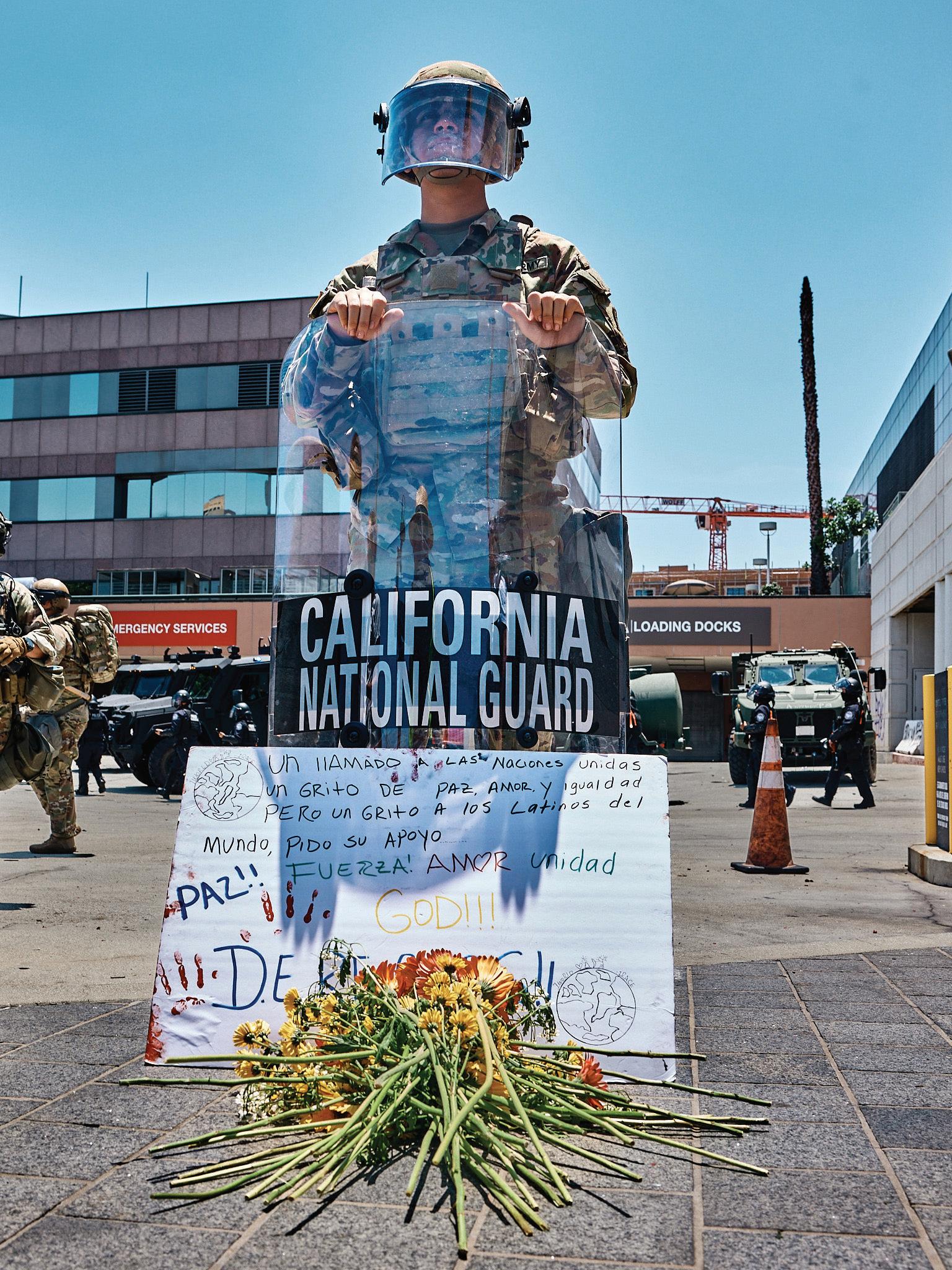

Faith freedom includes having the ability to follow the dictates of our conscience in community with our neighbors. With a litany of changes to our nation’s immigration policies and enforcement activities over the past few months, we continue to see faith communities leading as they exercise their religious freedom to do their work freely, boldly and without fear. Many have been doing ministry among immigrants and refugees, and taking that ability away now undermines the autonomy of congregations and people of faith. Here is a brief reminder of some of the changes we’ve seen and are continuing to see:
Executive Order 14160 sought to limit birthright citizenship to children with at least one U.S. citizen or lawful permanent resident parent. Federal courts blocked the order.
The Trump administration removed long-standing protections that restricted ICE enforcement in schools, hospitals and churches. Several of BJC’s member bodies joined lawsuits challenging this order, noting that it violates congregations’ religious freedom and hinders worship and ministry. The Cooperative Baptist Fellowship joined a legal challenge Feb. 4 alongside a group of Quaker meetings and the Sikh Temple Sacramento, and a judge issued a temporary injunction that blocked immigration enforcement at houses of worship tied to those groups. Fellowship Southwest and the Hispanic Baptist Convention of Texas joined a different lawsuit filed Feb. 11, and the Alliance of Baptists and American Baptist Churches USA are involved in a third one filed July 28. All three cases are ongoing.
A proposed $5 million “Gold Card” offered wealthy investors a fast track to residency and eventual citizenship. Details remain vague.
Using the Alien Enemies Act, President Trump deported suspected Venezuelan gang members to El Salvador’s maximum-security CECOT prison. Among those removed was Kilmar Ábrego García, a Salvadoran national protected by court order. Despite the ban, he was sent to CECOT; on April 10, the Supreme Court ordered his return. Hear more about his case on a special episode of the Respecting Religion podcast, released April 21. At press time, his legal battles are ongoing.
Harvard University lost approval to enroll international students on May 22. Days later, the State Department paused student visa processing for expanded vetting. On June 5, the Trump administration barred new foreign students from Harvard, though a court overturned the order on June 30. Thousands of visas were revoked nationwide.
Migrants began to be deported to countries other than their own, including Djibouti, South Sudan and Eswatini. Eight men were stranded with ICE officers at a U.S. base in Djibouti after a court blocked their transfer to South Sudan. Confined in a converted shipping container, both detainees and staff fell ill. Courts later intervened to return some deportees.
A sweeping travel ban blocked or restricted entry from 19 countries, including 12 under full suspension. The order went into effect on June 9, despite legal challenges. See page 13 for more information, including how you can counter it.
ICE raided Ambiance Apparel and other L.A. worksites on June 6, detaining hundreds and igniting protests. President Trump responded by sending 2,000 National Guard troops into the city on June 7-9, with another 2,000 mobilized June 17. Legal challenges argue the deployment violated the Posse Comitatus Act.
A new detention facility opened in the Florida Everglades. Nicknamed “Alligator Alcatraz,” it drew condemnation for harsh conditions and environmental damage.
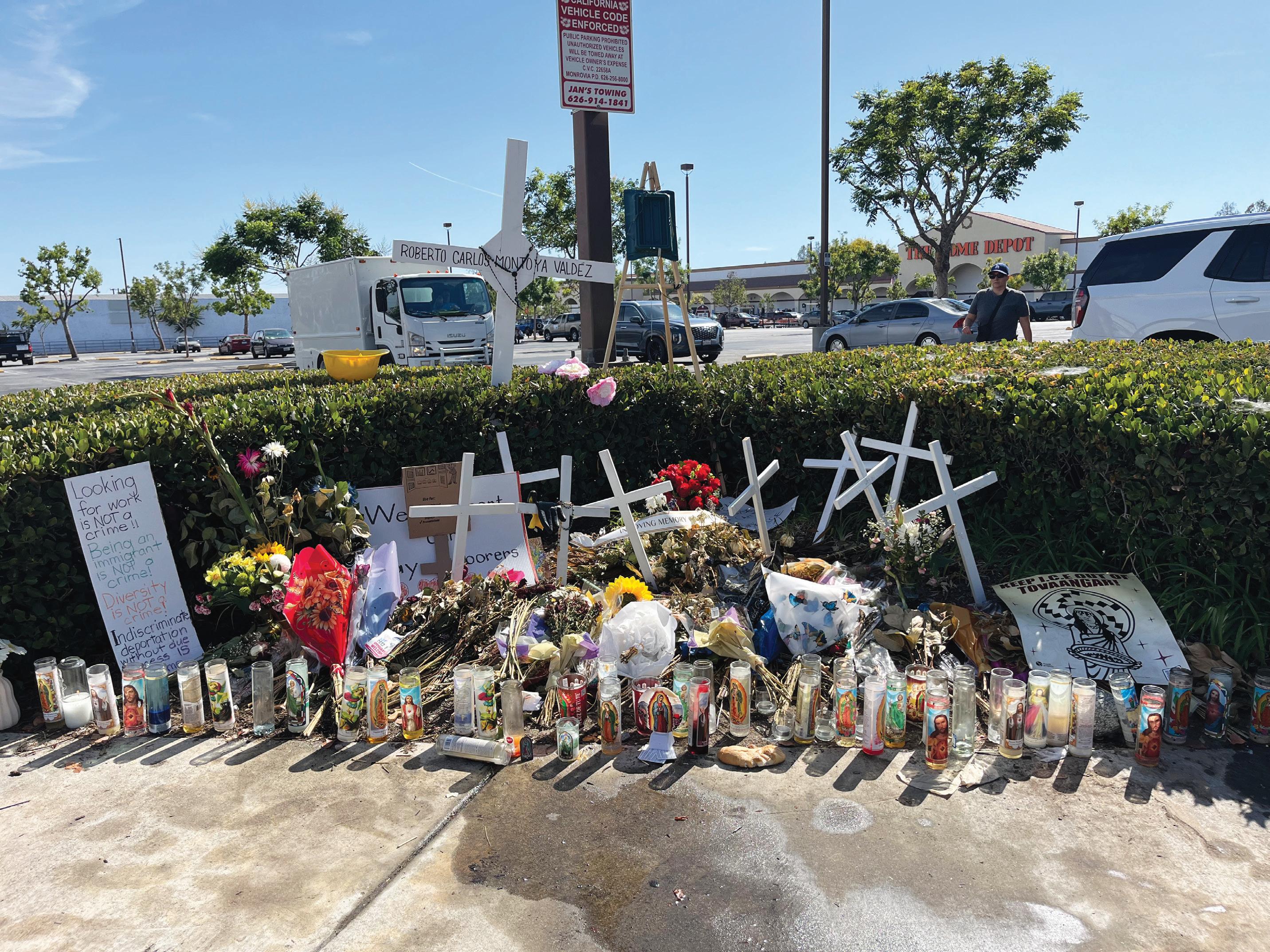
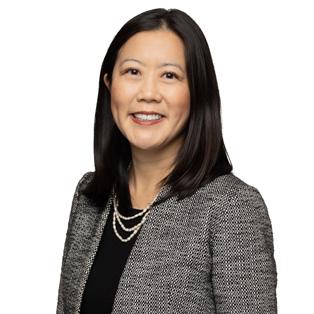
IBy Rev. Janna Louie, BJC Chief of Staff
was returning home to Los Angeles from BJC’s D.C. headquarters when I received a flurry of texts and notifications from friends and neighbors: ICE raids at Home Depots across the city.
disappearances have upon a city that is still struggling to recover from the fires at the start of this year.
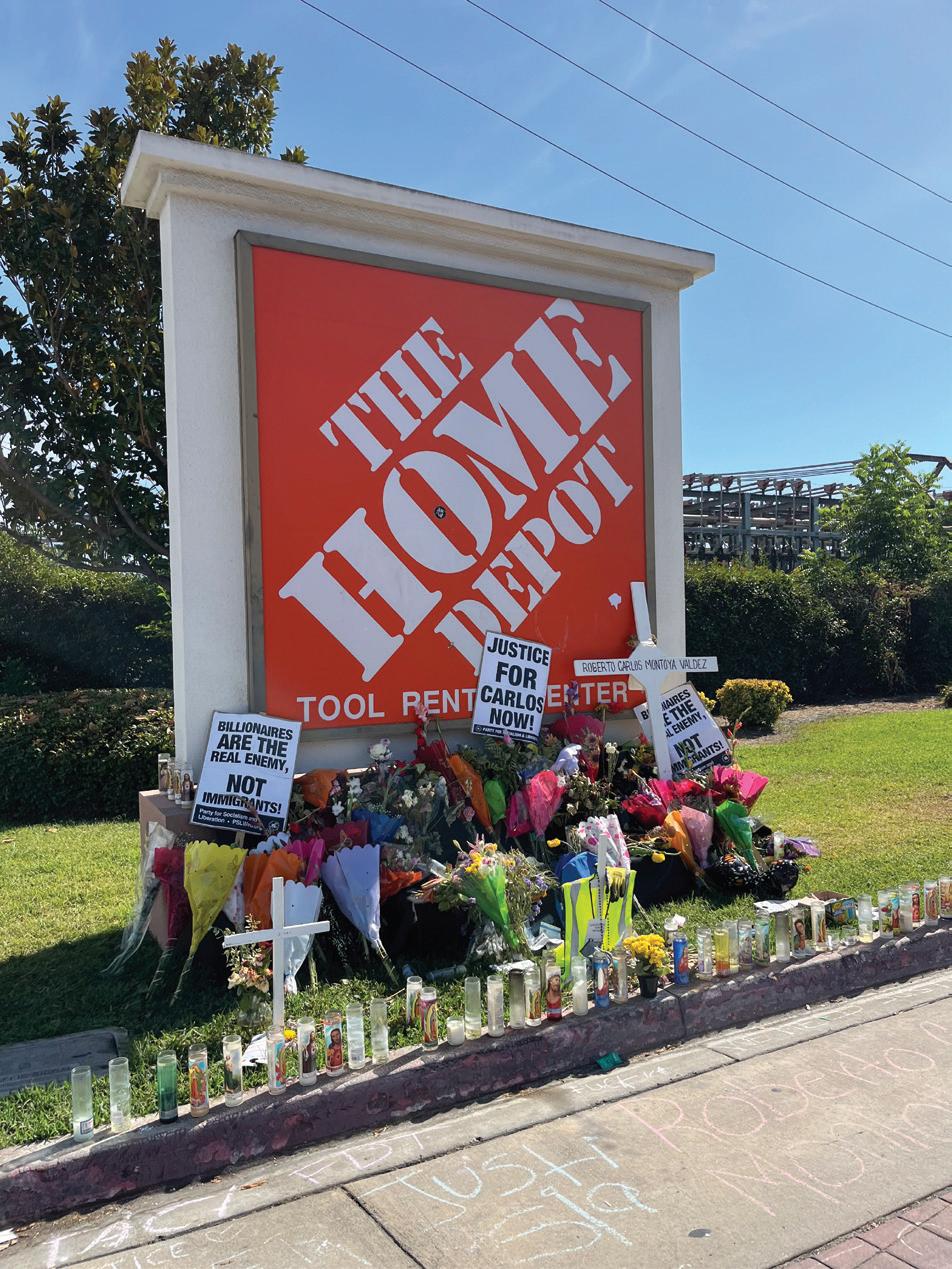
How do I explain the shock of elderly faith leaders met with tear gas, flash bangs and pepper spray as they knelt in peaceful witness before ICE agents abducting workers? Do I talk about the women and children in chains, shuffled between vans at the base of the Federal Building in downtown? Do I talk about the betrayal of seeing the National Guard arm themselves against us when months earlier they protected our fire-scorched homes?
How do I share the story of a local pastor who witnessed a man shoved into a van in her church parking lot? Do I talk about how they pointed a weapon at her and laughed? Do I lament that no amount of training in or knowledge of rights matters when they shout back at you, “The whole country is our property!”? How do I share about immigrants who faithfully show up to their routine court hearings only to be abducted by ICE agents just outside the courtroom? How do I share the story of the woman who was taken from her hospital room — before she was discharged — to be detained in another state?
Do I talk about stripping hardworking people from working, creating barriers
for families to eat? How do I explain the eerie stillness of our bus stops and train stations after a raid at a transit center? How do I explain the quietness of our streets in a city that typically hosts vibrant night markets and faithful street vendors? Do I talk about our communal worry for the flower vendor whom we haven’t seen for weeks? Or, do I describe the children who work their parents’ fruit and tamale stands to protect their parents and provide for their families?
How do I share about the cruelty of raiding public parks in the early hours of the morning so parents no longer bring their children to receive their free summer lunches? How do I talk about families whose fathers vanish after going to the park to buy tamales for their weekly breakfast?
I don’t know how to share stories, yet, I know the stories we must tell.
We must tell the stories of hope through faithful witness. The hope that arises from our collective songs of protest and the collective action that builds upon our joy. The joy of seeing a key union leader released from custody after he was arrested for protecting our community. The joy of bearing peaceful witness of faith leaders at rallies, press conferences, the courts and our streets. And the joy of

seeing organizers from Clergy and Laity United for Economic Justice (CLUE-LA) training more than 80 clergy and faith leaders to accompany immigrants and refugees in Los Angeles immigration courts. These are the stories I will tell.
I will talk about the women who lead the weekly Godmothers of the Disappeared vigil in front of stationed Marines, members of the National Guard and ICE
agents, laying flowers and honoring those abducted. I will share about the cards left on the sidewalk outside a detention facility on Father’s Day to honor the fathers separated from their families. I will talk about the largest non-violent direct action training in the country, where nearly 2,000 faith leaders and workers practiced non-violent principles. I will share about how we learned to be better neighbors,
“I will pastor with deeper resolve for our faith community to be marked by hope in action. I will preach that practicing courage deepens our faith.”
President Donald J. Trump announced a travel ban in June, fully restricting entry into the United States by nationals from 12 countries and giving partial restrictions to seven other nations.
The full suspension applies to people from Afghanistan, Burma, Chad, Republic of the Congo, Equatorial Guinea, Eritrea, Haiti, Iran, Libya, Somalia, Sudan and Yemen. The executive order partially restricts entry by people from Burundi, Cuba, Laos, Sierra Leone, Togo, Turkmenistan and Venezuela.
“Cloaked in national security language, it continues a pattern of singling out individuals based on their faith, race and national origin,” said BJC Executive Director Amanda Tyler. “It is not a genuine security measure — it is state-sanctioned discrimination.”
The travel ban has a history that goes back to statements candidate Trump made in 2015, proposing the United States close its borders to people who are of the Muslim faith. After taking office in January 2017, President Trump’s first ban blocked entrance from seven majority-Muslim countries, citing national security concerns. The administration was forced to re-issue the ban twice with new language — including to address religious discrimination claims — and the policy went to the Supreme Court in the case of Trump v. Hawaii in 2018. Ultimately, the Supreme Court upheld the policy as constitutional, and BJC blasted the Court’s 5-4 decision as a “refusal to repudiate policy rooted in animus.”
President Joe Biden repealed the travel ban on his first day in office in 2021.
creating networks for grocery delivery and transportation. I will talk about the ways we are learning to be creative so our neighbors can continue to work and provide food on the table.
And I will pastor with deeper resolve for our faith community to be marked by hope in action. I will preach that practicing courage deepens our faith.
There is no end to this terror in our city. However, our work as clergy and faith leaders is clearer than ever. Our disciplines and practices of faith continue to be deeper than the tactics of fear and control from the government. Thank you, City of Angels, for teaching me how to better love God and love our neighbors.
The 2025 travel ban cites national security concerns but reeks of discrimination. In announcing the ban, President Trump referenced a June attack in Colorado as an example of the dangers posed by foreign nationals, but the person charged in that attack was from a country not on the restricted list.
To counter the travel ban, BJC supports the NO BAN Act (S. 398/H.R. 924). It would prohibit discrimination based on religion in visa and immigration decisions, and it would require travel restrictions to be based on facts and narrowly tailored to serve a compelling government interest.
People from more than a dozen countries will continue to be barred from traveling to the United States if Congress does not act — contact your members of Congress and ask them to support the NO BAN Act. You can call them or scan the QR code on this page to be taken to a form you can use to email them.
—BJC staff reports
Want to stop the travel ban? Scan this code to ask your members of Congress to support the NO BAN Act (S. 398/H.R. 924).
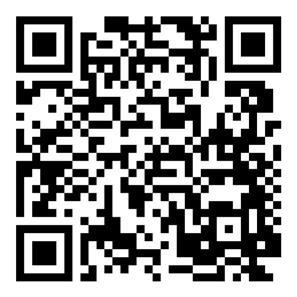
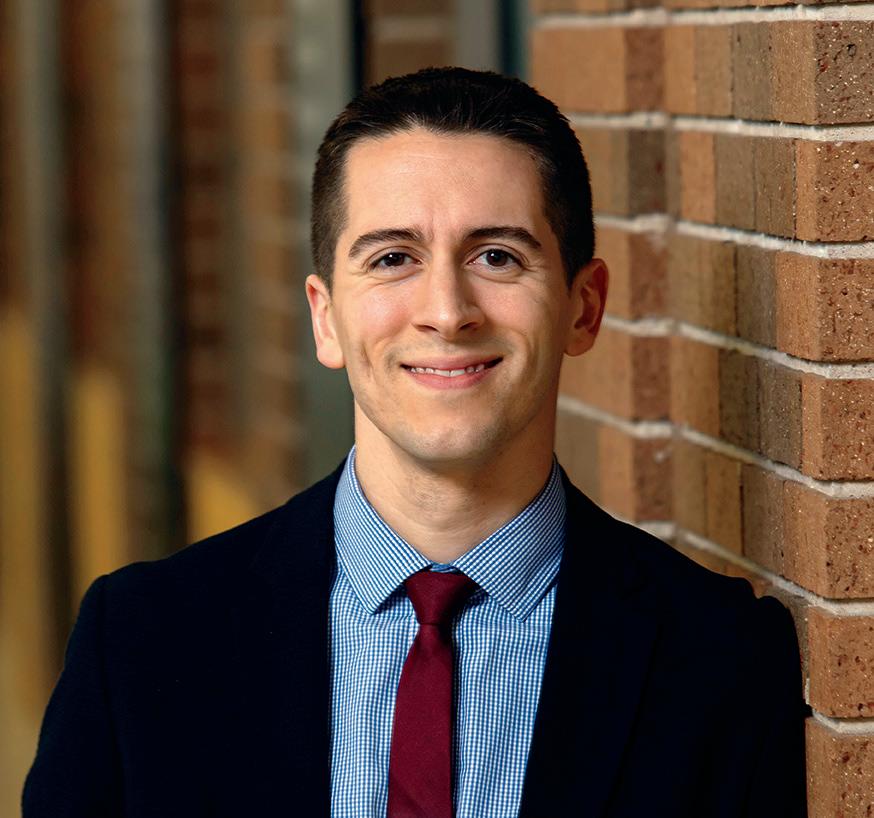
Focusing on sanctuary in an era of government repression of migrant justice, Dr. Sergio M. González will deliver the 2025 Walter B. and Kay W. Shurden Lectures on Religious Liberty and Separation of Church and State, held in partnership with the University of St. Thomas, from Oct. 21-23 in St. Paul and Minneapolis, Minn. Visit BJConline.org/ShurdenLectures for details, including how you can join us.
A historian of U.S. immigration, labor and religion, Dr. González teaches at Marquette University and is a co-founder and former organizer for the Dane Sanctuary Coalition. He spoke with Report from the Capital to preview some of his topics.
You’ve spent years studying the sanctuary movement. When you look at what’s happening now — mass deportations, renewed attention on sanctuary spaces, people being sent to third countries — what connections do you see to the past?
The current immigration landscape echoes many concerns that sanctuary movements, both in the 1980s and across the 21st century, have confronted.
In the original movement of the 1980s, Christian and Jewish faith communities provided safe harbor to Central American asylum seekers fleeing U.S.-backed violence, as the federal government failed to grant them refuge as mandated by national and international laws. In the 2010s, meanwhile, houses of worship revived the concept of faith-based sanctuary to provide shelter to undocumented residents, many of whom had called this country their home for years.
Today, we see similar dynamics — mass and what feel like indiscriminate detention and deportations, often targeting the most vulnerable, as well as the outsourcing of asylum responsibilities to third countries. This reflects a continued attempt to externalize borders and criminalize migration, all of which is built upon over a century of U.S. military and economic intervention abroad and resurgent nativism at home. What’s different now is the scope and visibility of these attacks on undocumented residents as well as asylum seekers and refugees; deportations today affect a broader range of nationalities, and technology has amplified federal surveillance while making the threats and arrests against migrants ever more present on social media.
Across each of these eras however, grassroots responses have emerged in defiance, with sanctuary spaces once again today becoming vital sites of resistance and protection. The movement’s moral framework — emphasizing human dignity and solidarity — remains as relevant as ever. The enduring
struggle, what sanctuary activists have continually referred to as a form of “sacred resistance,” highlights how sanctuary is not just a place but a political and ethical stance against unjust state policies.
What do you think today’s faith communities can learn from earlier sanctuary movements, especially when it comes to legal risks and public witness?
Today’s faith communities can draw valuable lessons from earlier sanctuary mobilizations about the power of moral conviction and collective action, even when facing down potential government persecution. Historically, sanctuary has not just been about providing shelter — those who have practiced sanctuary have understood it as a physical manifestation of their faith, a bold public witness that challenges unjust laws and policies. Faith communities have learned to navigate legal risks by building local, regional, national and even transnational networks with lawyers, advocacy groups and other congregations, emphasizing solidarity and shared responsibility. Today, those lessons are crucial. Faith communities must educate themselves on immigration law, understand the potential legal consequences for providing safe harbor to those fearing detention and deportation, and work closely with legal experts to protect both themselves and those they support. And in light of the enhanced legal risks that faithbased immigration activists are facing, equally important is reclaiming sanctuary as a prophetic act — one that centers the humanity and dignity of immigrants while pushing back against fear-driven narratives. By standing publicly with immigrant communities, faith groups can shift public discourse, hold institutions like the federal government accountable, and affirm that offering refuge is a sacred moral tradition, not a criminal act.
“Sanctuary” is such a loaded word. How has its mix of political and spiritual definitions impacted the work of people of faith?
The term “sanctuary” carries both spiritual and political weight, which has both empowered and complicated the work of faith communities invested in immigrant justice.
Spiritually, “sanctuary” evokes the concept of hospitality and a sacred duty to protect the vulnerable, the disenfranchised and those who have been pushed to the margins of society. Because this is a deep-rooted tradition across many religions, the potential for interfaith and ecumenical solidarity is ripe. This moral clarity can galvanize congregations of many faiths, offering a powerful framework for action rooted in compassion and justice.
Like any effective social movement, however, “sanctuary” has engendered a powerful political countermovement, one which I
would argue today defines restrictive immigration politics in our nation. Politicians and pundits regularly deploy “anti-sanctuary” arguments in government and across the media, arguing that providing sanctuary — practiced in both sacred and secular spaces — promotes criminality and a disregard for the law. Crackdowns on sanctuary efforts, either by threating to send immigration officers into churches or by defunding “sanctuary cities,” can create confusion or fear within faith communities about legal consequences or public backlash. Historically, however, faith communities have not been deterred by these threats, arguing their obligation is ultimately to a higher power. By framing sanctuary as a spiritual commitment, faith leaders can offer a counternarrative surrounding immigration, one that emphasizes human dignity over demonization and fear.
21-23 in St. Paul and Minneapolis, Minnesota, in partnership with the University of St. Thomas Details: BJConline.org/ShurdenLectures
Fellowship Southwest’s work to create greater equity in communities was recognized with a 2025 Dr. Emmanuel McCall Racial Justice Trailblazer Award.
The award was presented June 25 at the annual Dr. Emmanuel McCall Racial Justice Trailblazer Luncheon, hosted by the Cooperative Baptist Fellowship’s (CBF) Pan African Koinonia during the CBF General Assembly in St. Louis, Mo.
One of BJC’s member bodies, Fellowship Southwest works with churches from California, Oklahoma, Texas and Northern Mexico. It is a network affiliated with CBF, which also is a BJC member body.
Fellowship Southwest’s racial justice efforts began when it supported communities impacted by 2017’s Hurricane Harvey, and that became a catalyst for deeper engagement with historically marginalized people groups. The organization fully stepped into its public witness for justice by protesting family separation at the U.S. border in 2018. It has organized prayer vigils and held conversations with people on the border while centering the
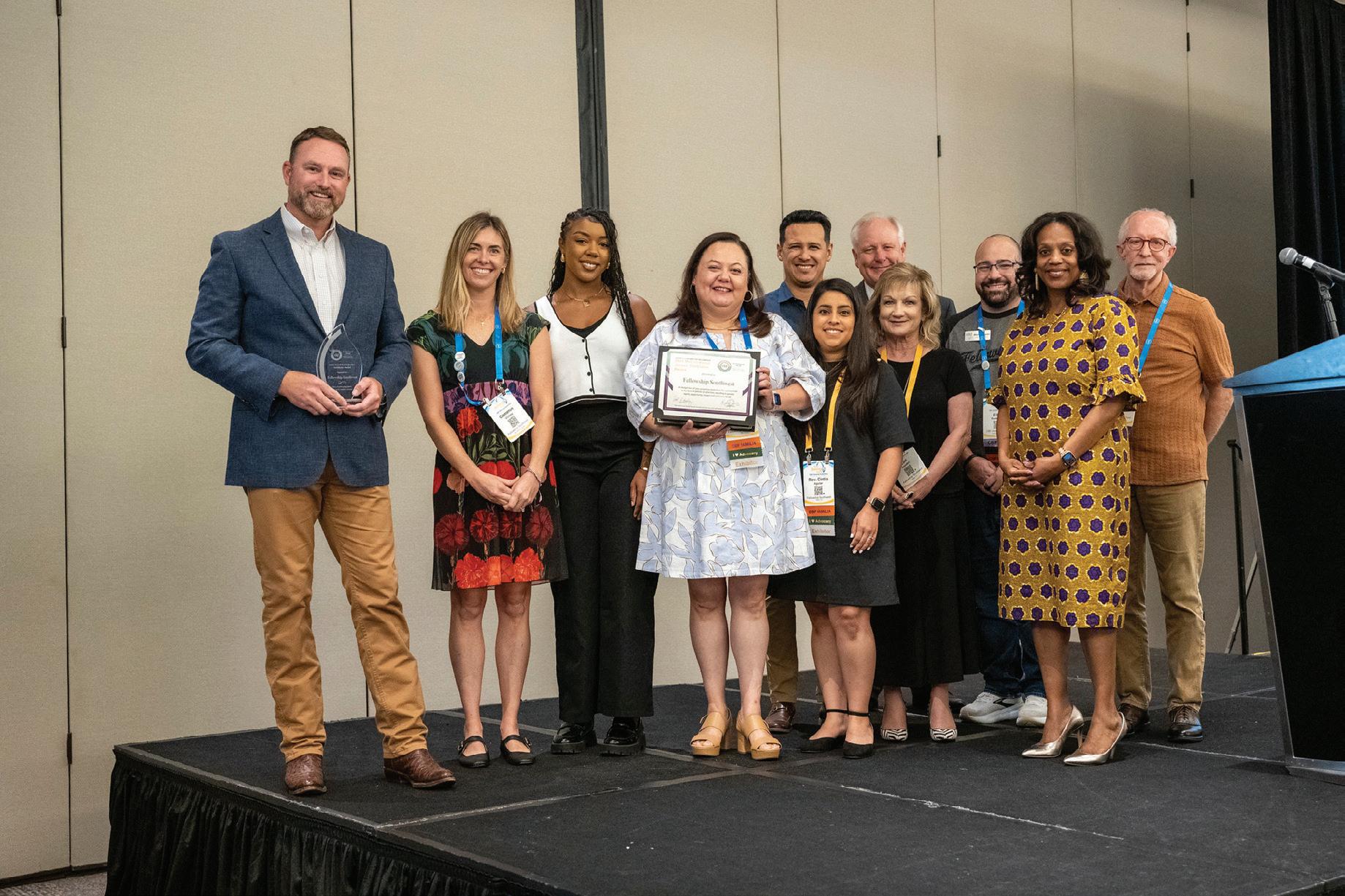
voices and experiences of immigrants and asylum seekers.
In partnership with the Lilly Endowment, Fellowship Southwest is launching a five-year Thriving Congregations Immigration Ministry project, equipping churches to lead immigrant justice efforts in their communities.
Broadway Baptist Church in Fort Worth, Texas, also received a Dr. Emmanuel McCall Racial Justice Trailblazer Award at the event. Their work in racial justice began amid the 2020 civil rights
protests sparked by the police killing of George Floyd. Under the guidance of senior pastor the Rev. Ryon Price, the church launched an intentional effort to confront the church’s history of racism, make reparations and work toward racial equality in their church and their community.
CBF’s Dr. Emmanuel McCall Racial Justice and Leadership Initiative works to create avenues for God’s imperfect church to move toward meaningful unity between racially diverse communities.
—BJC and CBF Staff Reports
Christian nationalism gains strength when communities are silent. To challenge its influence, BJC’s Christians Against Christian Nationalism project is empowering local communities to organize. We have more than 20 active and developing groups across the country, and even more are on the way. We invite you to connect with and join others ready to take action!
These groups create spaces to strengthen connections, support vulnerable communities, and take tangible steps to uphold the dignity and inclusion of all people. They also ensure their efforts are championing religious freedom for everyone.
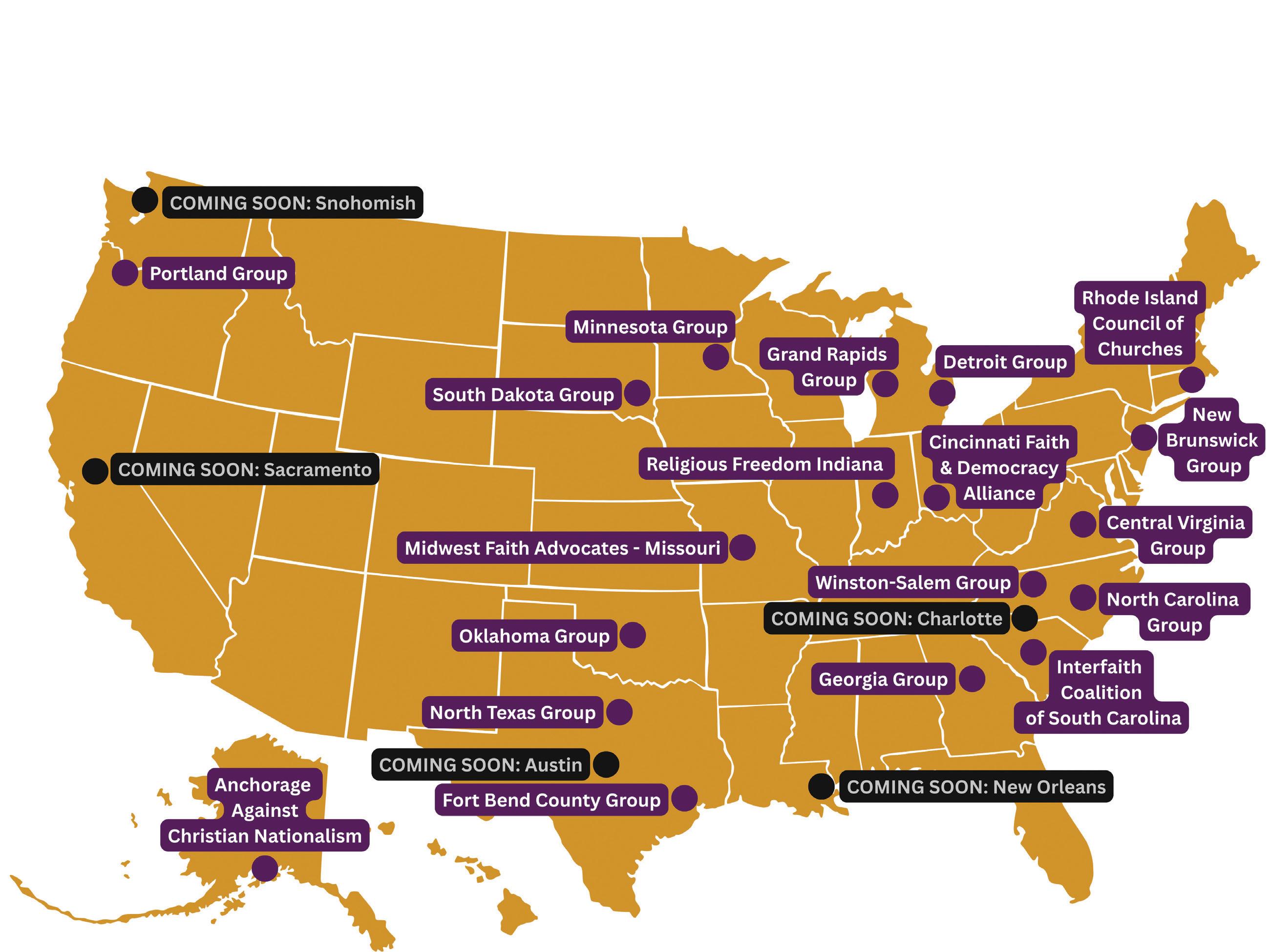
Don’t see a group near you? If a local group doesn’t exist in your community yet, consider organizing one! BJC and our campaign staff will provide resources and support to help you on your journey, but ultimately you and your group will operate independently to better respond to the needs of your community when it comes to the impact and influence of Christian nationalism. We have more details and resources for these steps at ChristiansAgainstChristianNationalism.org/localgroups
Make a list of people who could be good partners, and reach out to them with an invitation. We have people across the country who told us they want to get involved with a group, and we can share that list with you!
Set a date and time for an initial meeting, and invite people to join you. Outline what you will cover in advance and how long your meeting will take. We have sample meeting agendas and planning ideas that we can share with you!
Go to ChristiansAgainstChristianNationalism.org to explore our new “Start Here” guide and other resources for awareness, advocacy and organizing. Scan the QR code or use your desktop computer to see what’s new and get involved.
After your first meeting, it’s time to think about what’s next based on the issues you identified as a group. You will continue to build your team as you move into action steps.
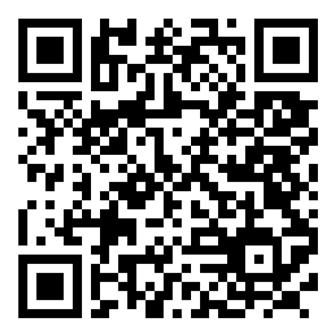
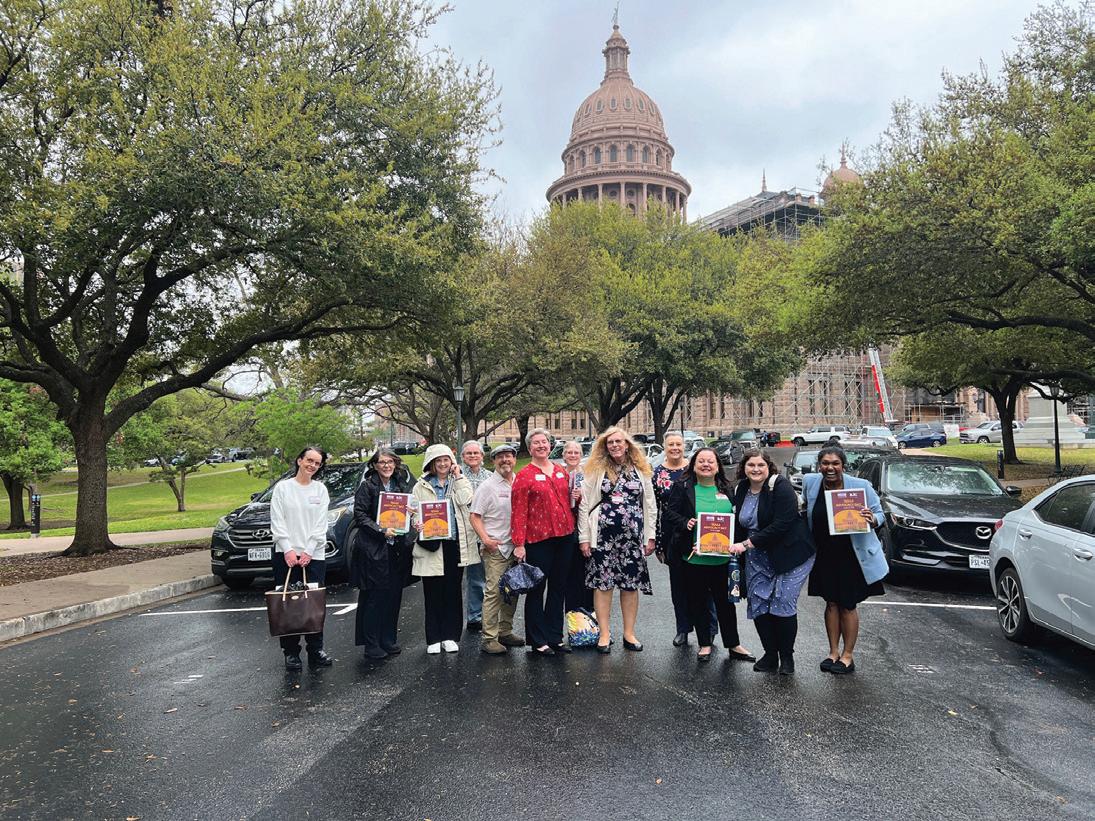

Over the past few months, BJC’s organizing team in North Texas has been busy strengthening coalitions and lifting up voices of faith for justice.
In March, the North Texas group held their first Advocacy Day at the Texas State Capitol. Participants gathered in Austin to learn from policy experts, meet with legislators and staff, and speak out on pressing issues, including school vouchers and unjust bail proposals. It was a powerful day of community, faith, and action.
In June, local pastors partnered with Vecinos Unidos to confront ICE’s presence at school campuses in Dallas. At a packed school board meeting, community members dressed in white to show unity as faith leaders called on the district to keep ICE away from families seeking safety and nourishment. Their message was clear: people of faith will not stay silent in the face of intimidation.
And in July, the North Texas group came together for Gather & Grow — a one-day experience of vision, strategy, and community. With breakout groups on immigration and education, the event sparked collaboration and renewed participants’ sense of purpose.
Through each of these efforts, BJC’s organizing work continues to demonstrate how faith communities can stand together for dignity, safety, and justice.
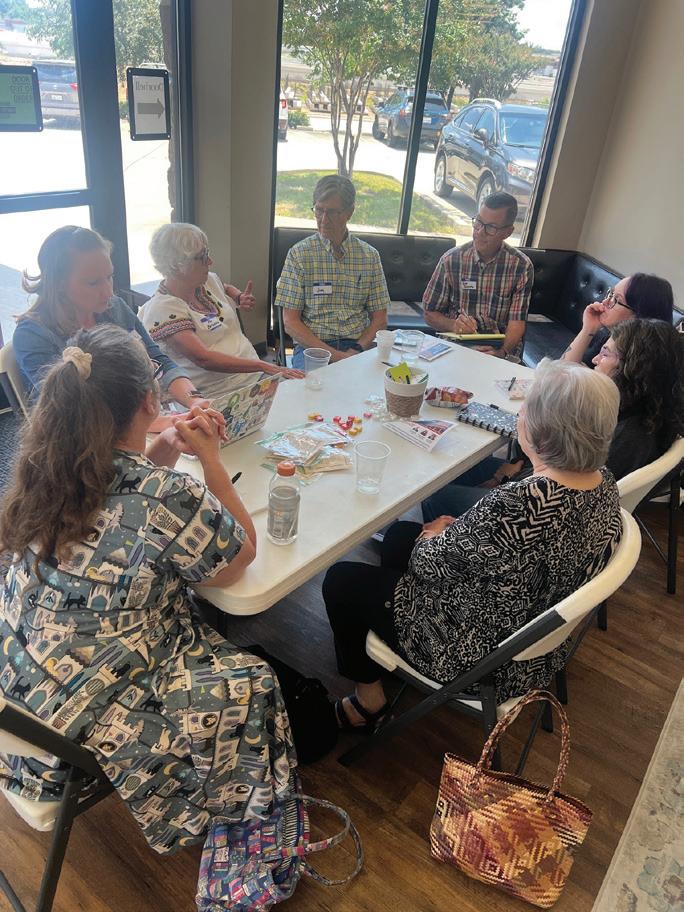
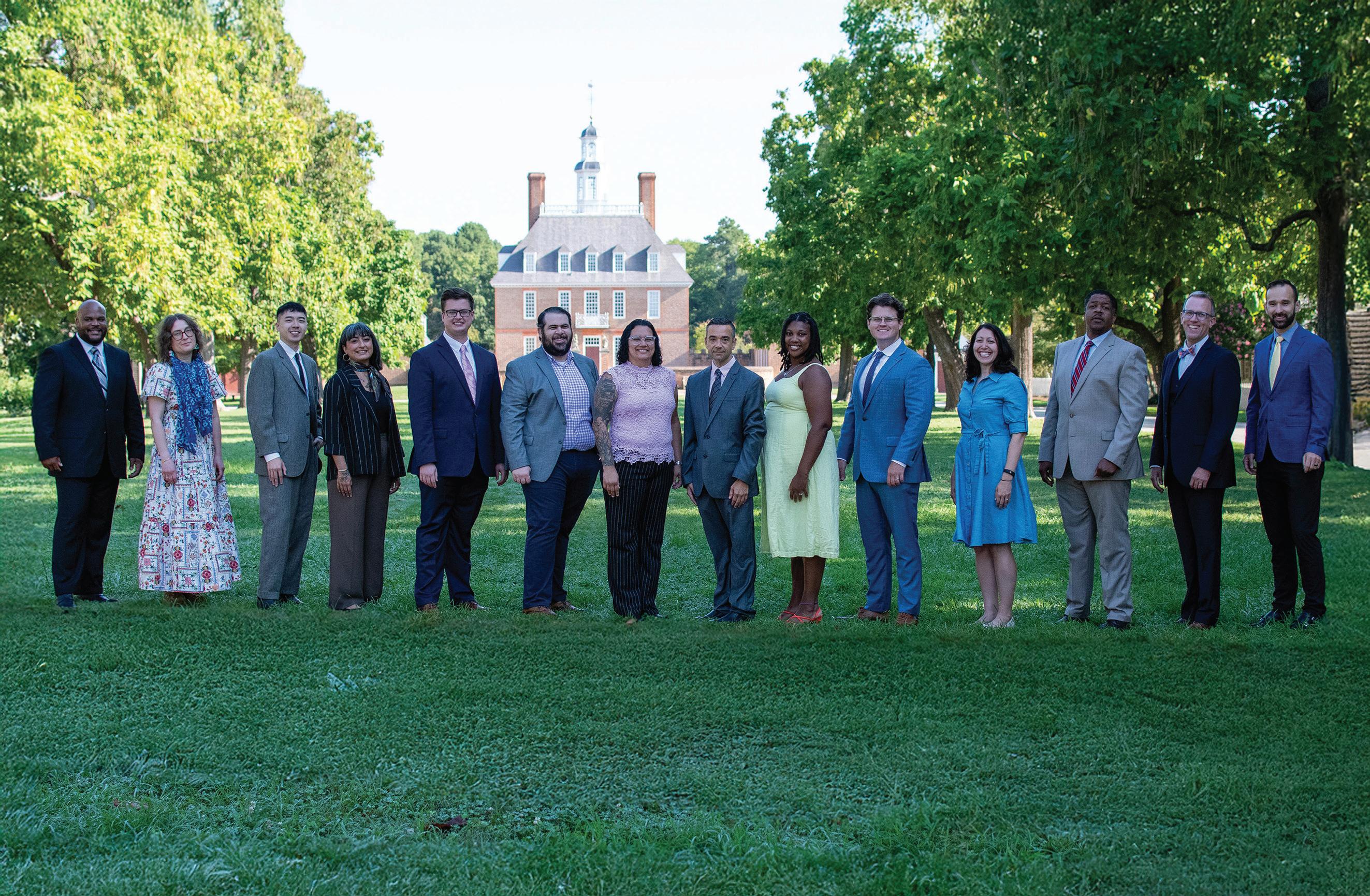
By Karlee Marshall BJC Media and Resource Manager
IIn the summer of 2015, the first class of BJC Fellows gathered in Colonial Williamsburg, Va., to learn about the theological, historical and legal foundations of religious freedom. Now, a decade later, we welcomed the 10th class of BJC Fellows to that same historic setting. What began as a small, pioneering program has blossomed into a robust network of 100 people — advocates, scholars, clergy and community leaders — who carry forward the vital work of protecting religious freedom for ALL people.
This year’s class brought together 14 young professionals from across the country, spanning from California to Massachusetts to Puerto Rico. Representing a range of professions — educators, clergy, nonprofit professionals, social workers and health care workers — the 2025 cohort highlights an important foundation of the program: that religious freedom isn’t just reserved for religious leaders and people of one — or any — faith. It intersects with issues across all sectors of society, and we all have a role to play in protecting it.
Over five hot summer days during the first week of August, the 2025 BJC Fellows participated in sessions on Christian nationalism, religious exemptions in our nation’s legal landscape, Baptist history and its deep connection

with religious freedom for all, and much more. While many sessions are interactive lectures, they also help develop tangible skills, such as talking to the media or facilitating effective faith-based advocacy strategies.
The BJC Fellows also heard from other voices who are part of the fight for faith freedom for all. A session on religious freedom in the 21st century featured an insightful and honest conversation between Arthur “Ro” Fibby, a music industry veteran, activist, educator and former minister of music; and Hurunnessa Fariad, a Muslim American leader and advocate. In a conversation facilitated by BJC Research Fellow Jaziah Masters, they talked about what it means to fight for faith freedom for all
as non-Christians in this country.
“Solidarity is not transactional. It cannot wait until our names are on the headline or our pain is at the center,” said 2025 BJC Fellow the Rev. Aaron Tinch after the session with Hurunnessa and Ro. “If I only show up for causes that promise me the favor of return, I’m not practicing justice — I’m managing alliances.”
The historic setting of Colonial Williamsburg served as a catalyst for deeper reflection of untold stories and marginalized voices. On the first full day of the seminar, the Rev. Dr. Nathan Taylor, executive director of the Virginia Baptist Historical Society and the Center for Baptist Heritage & Studies, and Dr. Corey D.B. Walker, dean of the Wake
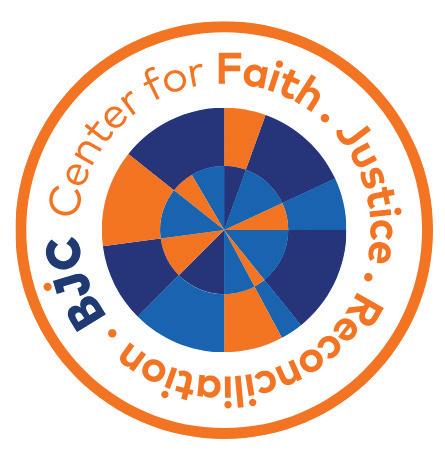
“Solidarity is not transactional. It cannot wait until our names are on the headline or our pain is at the center. If I only show up for causes that promise me the favor of return, I’m not practicing justice — I’m managing alliances.”
Rev. Aaron Tinch, 2025 BJC Fellow
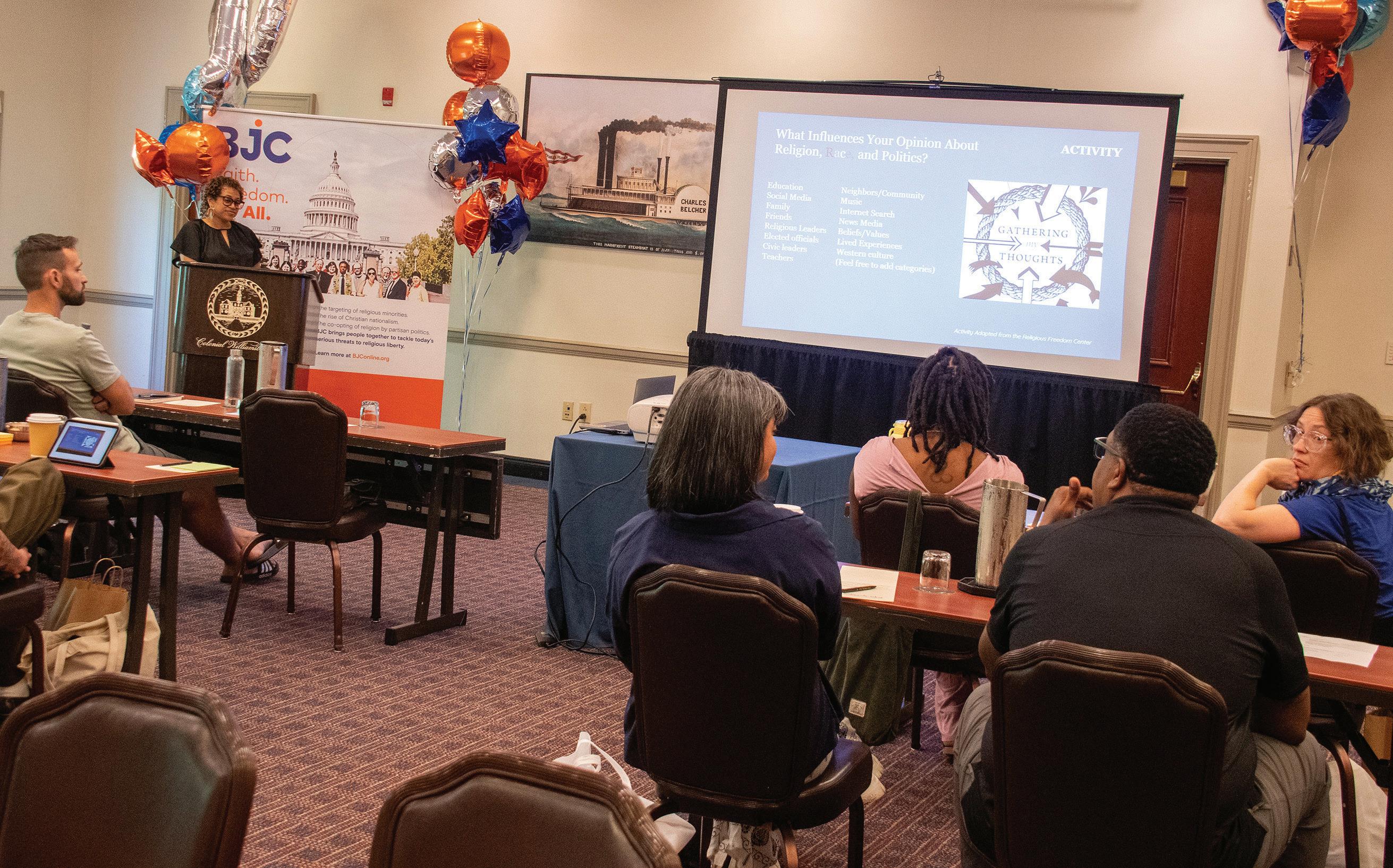

Rev. Abigaíl Medina Betancourt Cataño, Puerto Rico
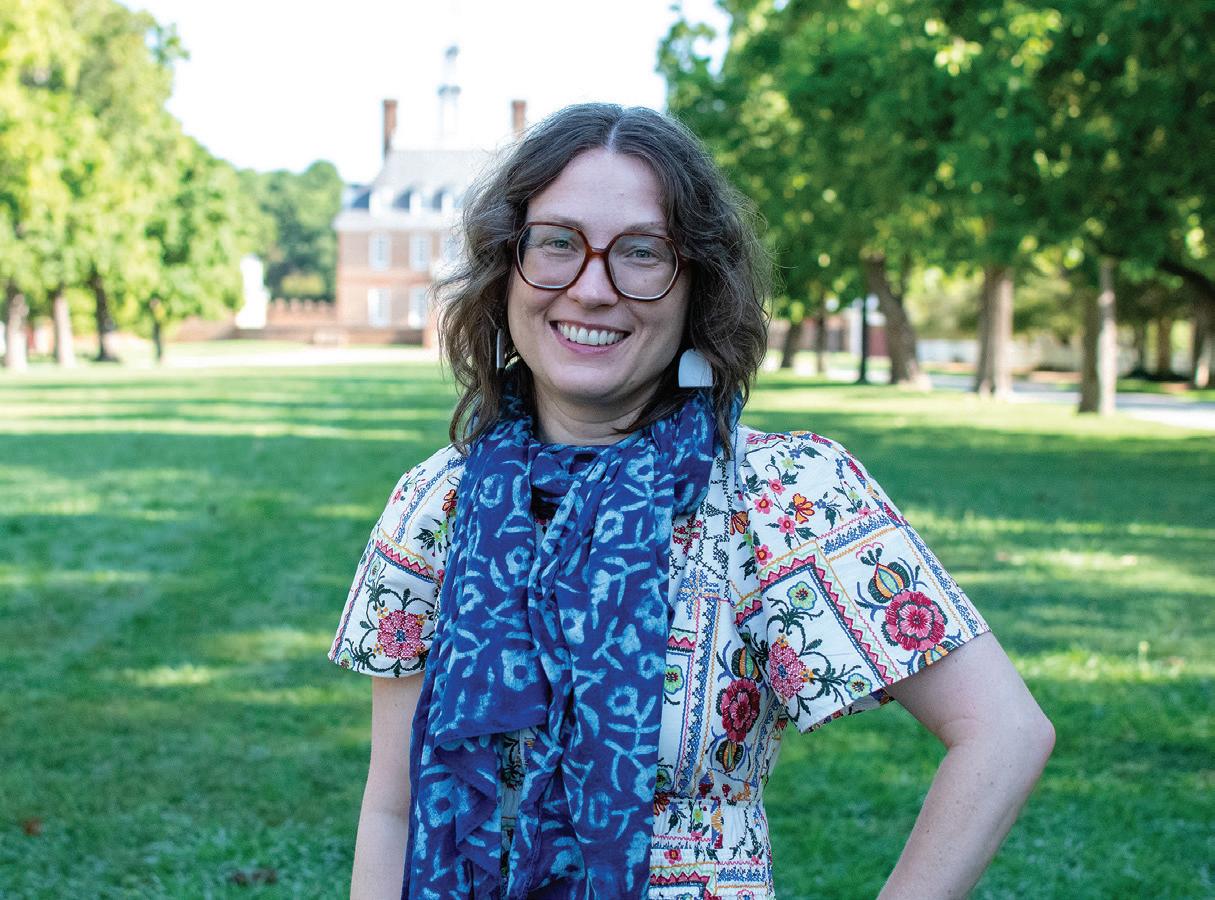
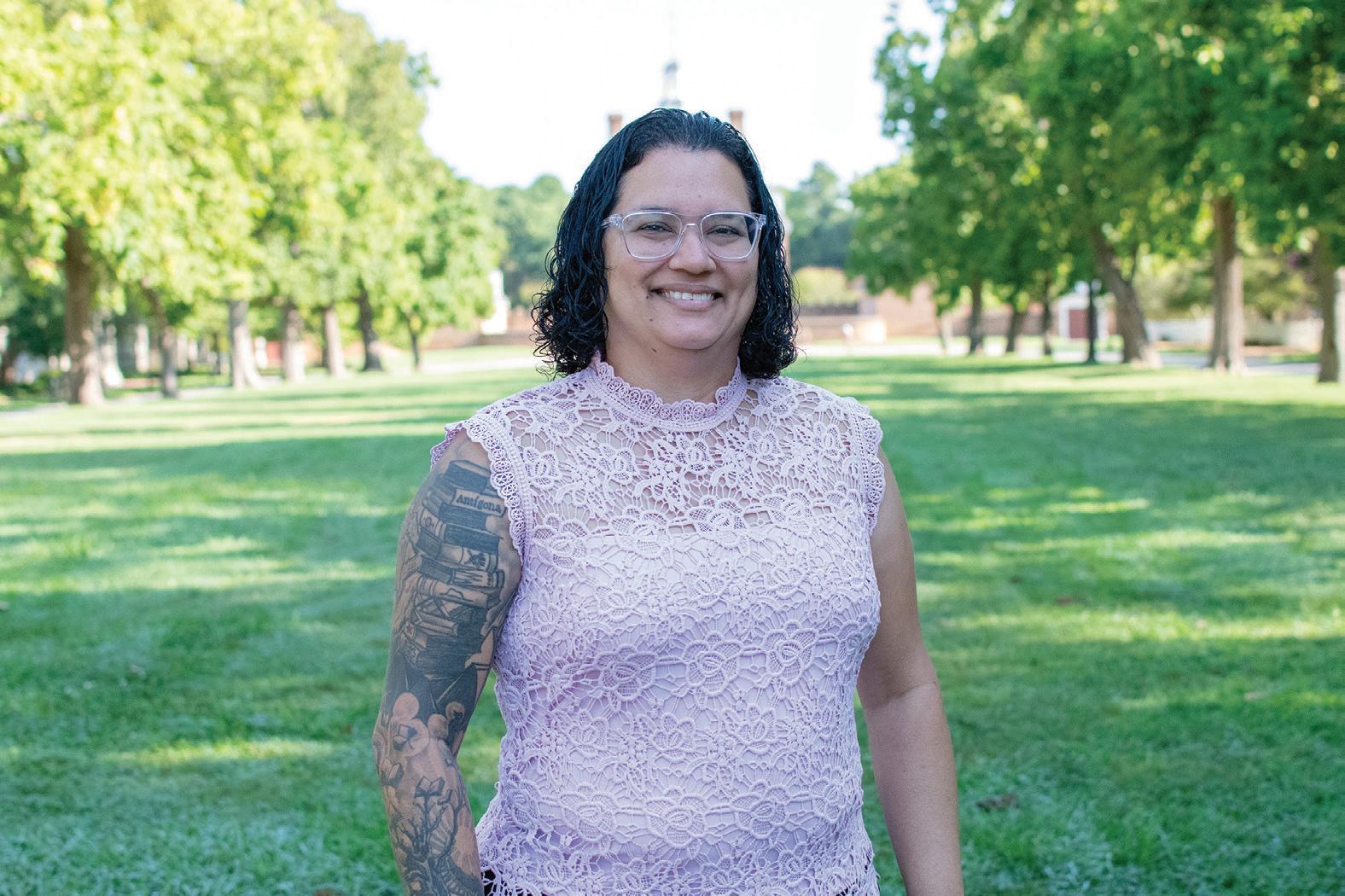
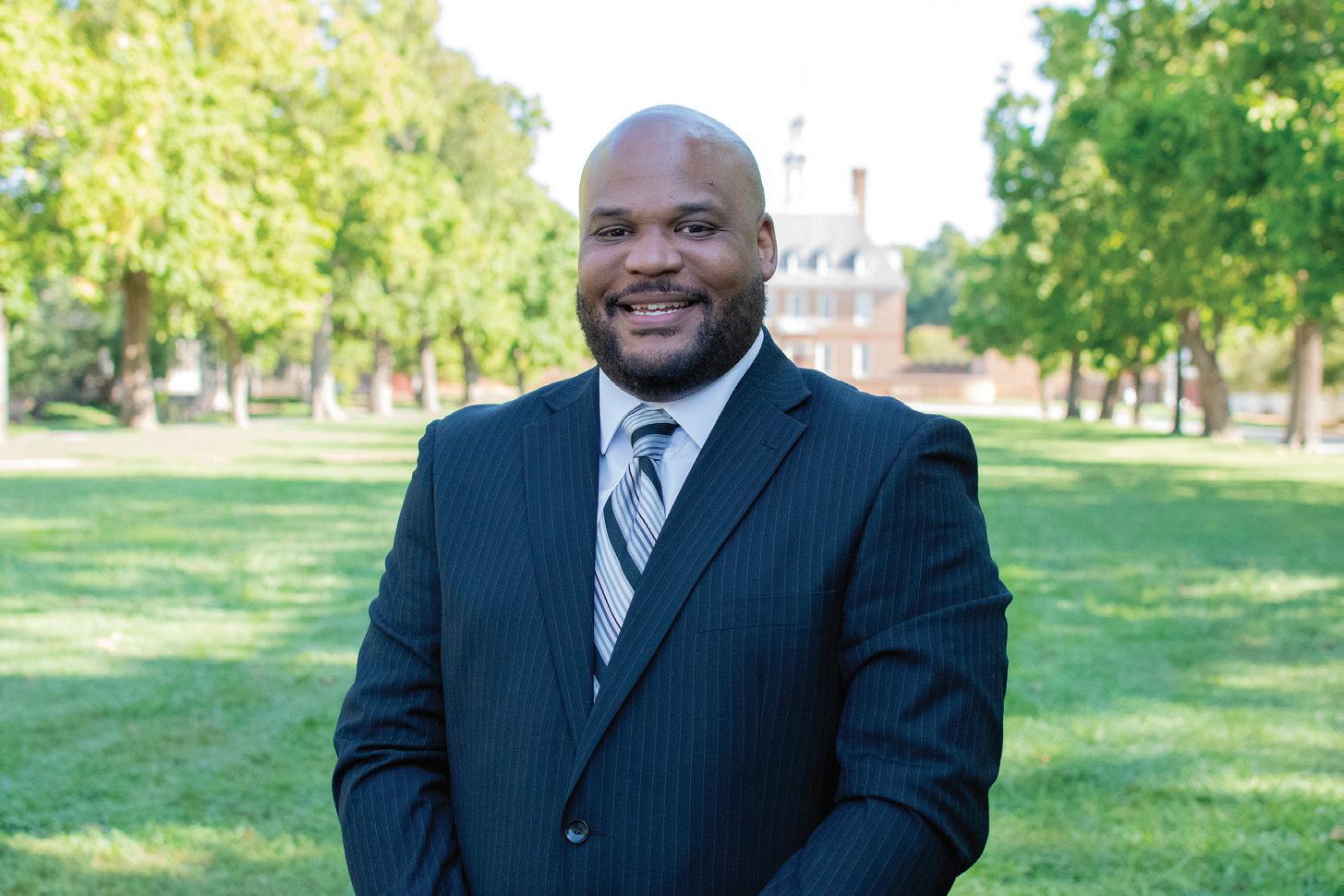
Rev. Christopher M. Coates Rocky Mount, Va.
Rev. Alexis Engelbrecht-Villafane Claremore, Okla.
Rev. Zack Jackson Hattiesburg, Miss.
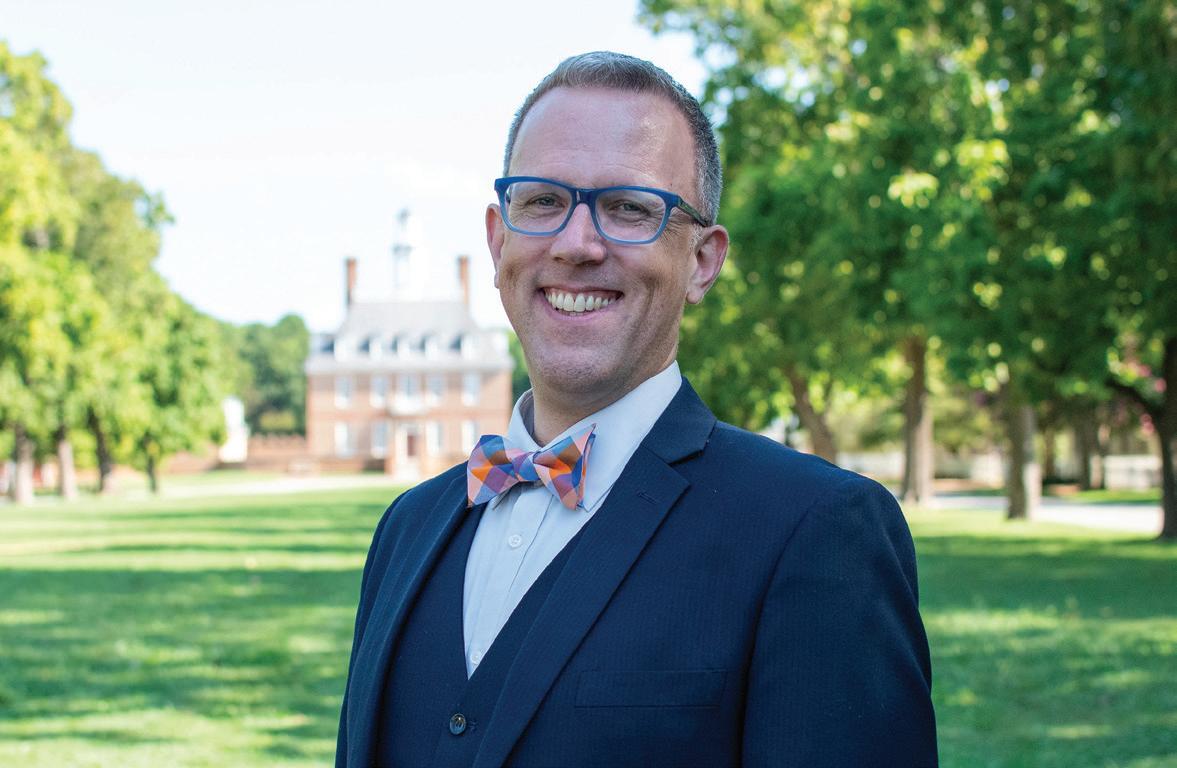
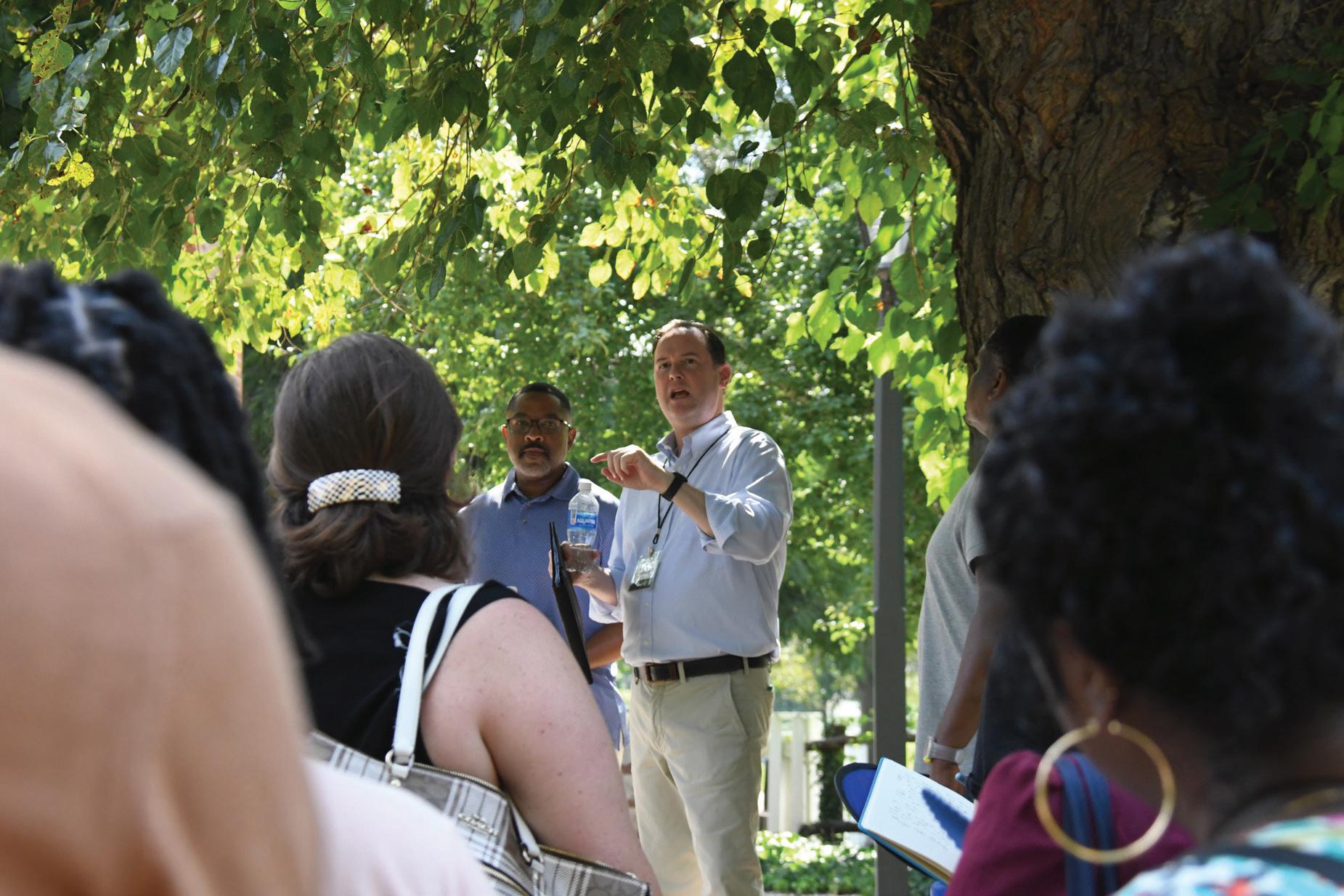
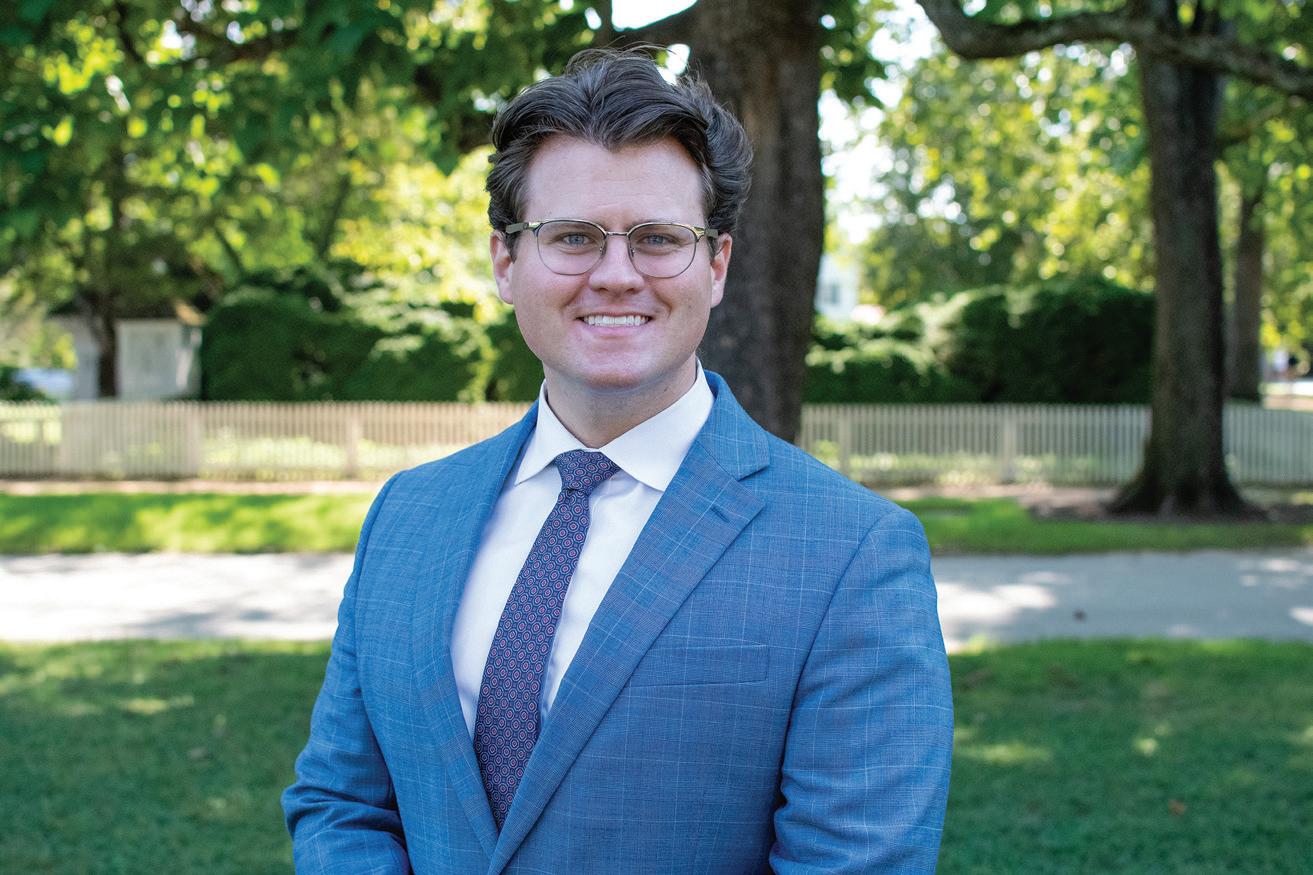
Caleb Cooke Bowie, Md.
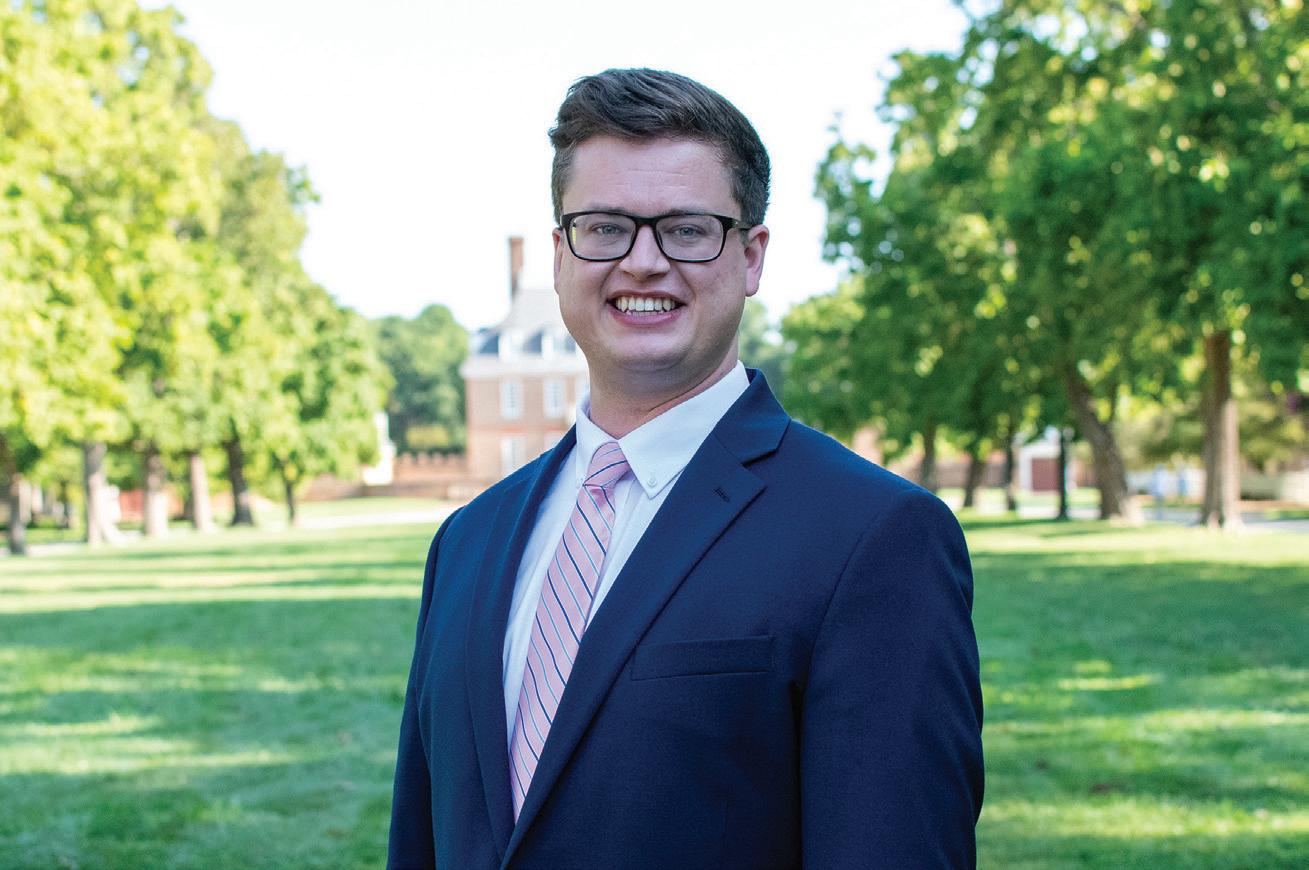
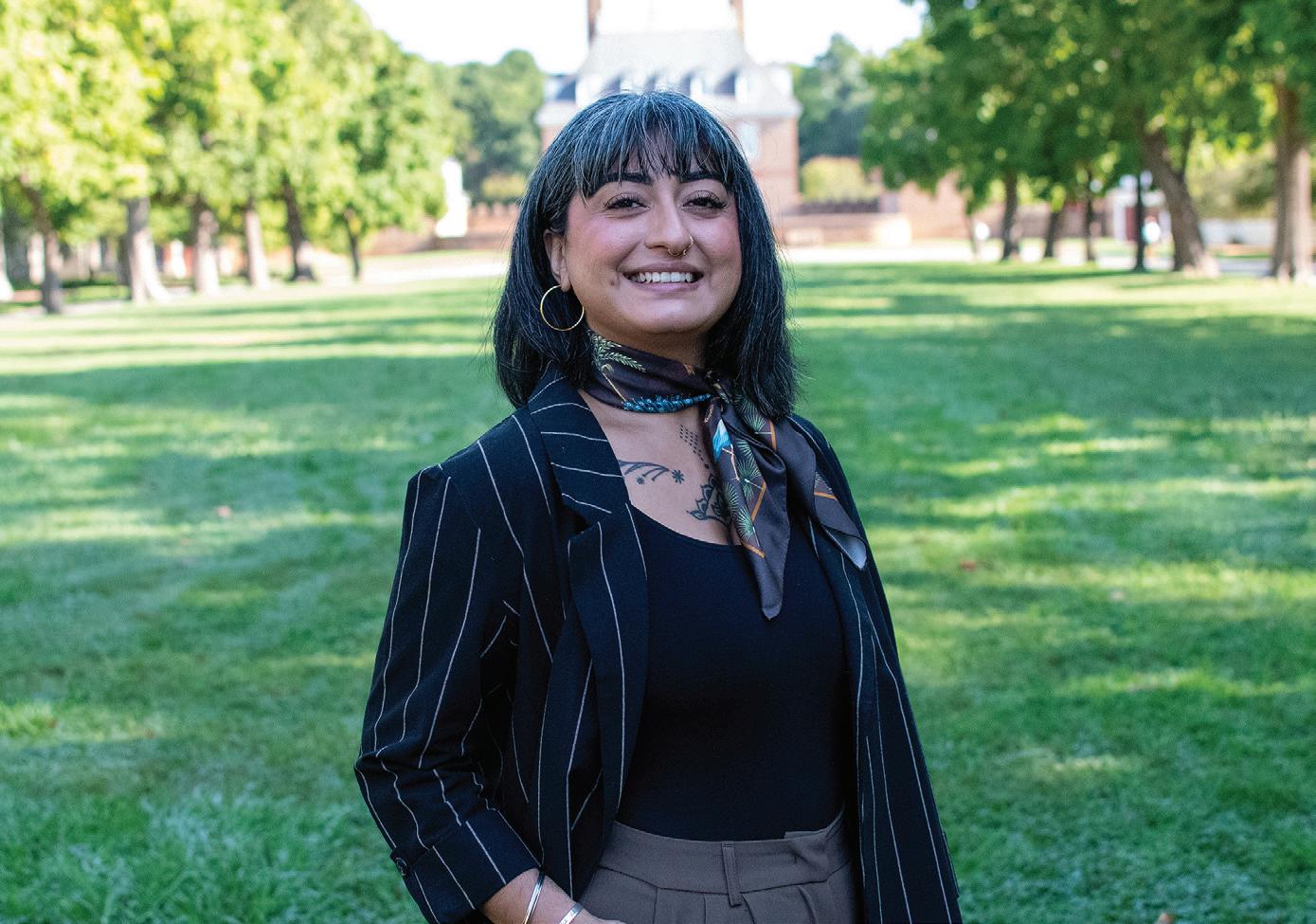
Harmeet Kaur Kamboj New York, N.Y.
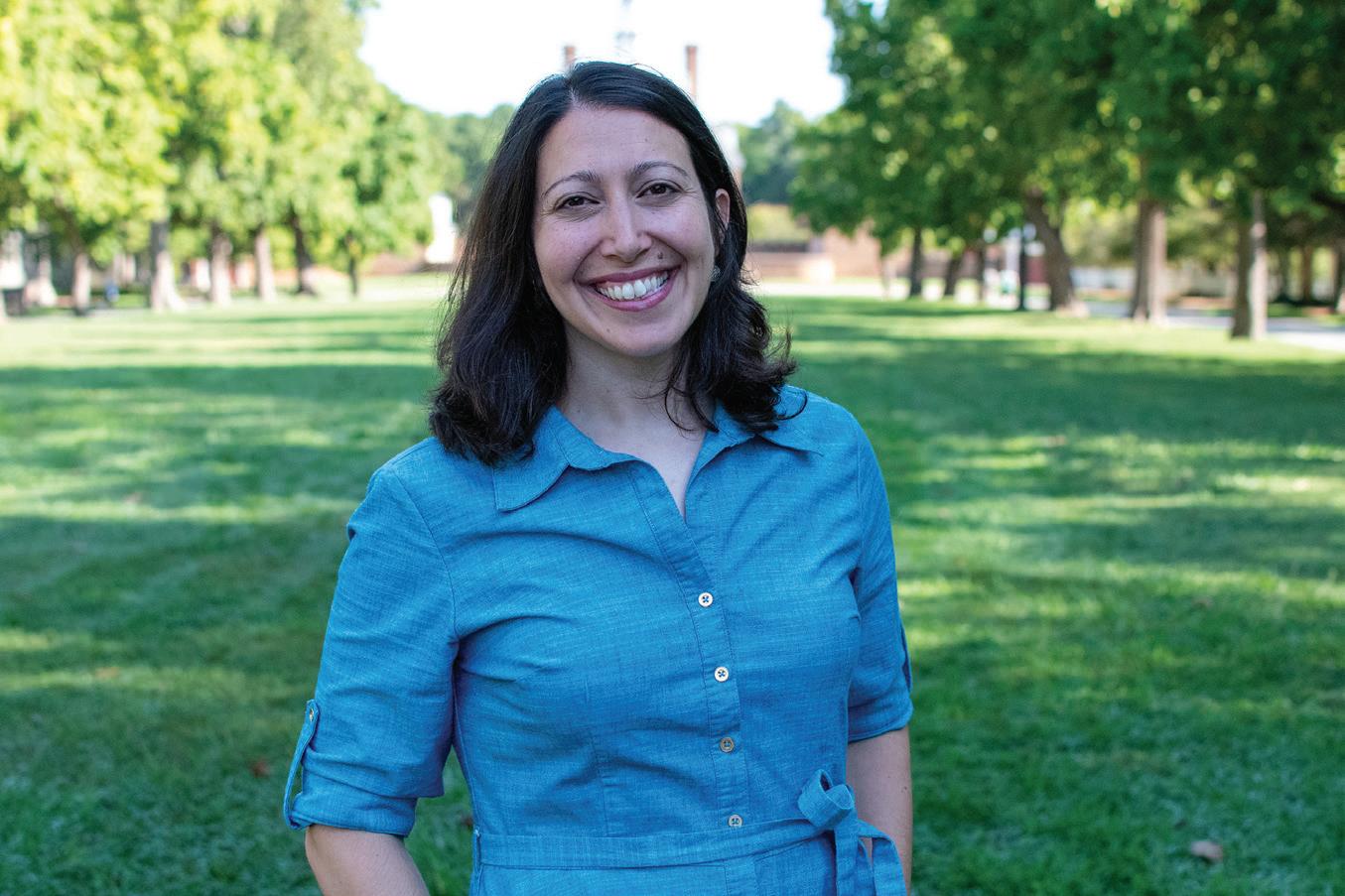
Krieger Baltimore, Md.
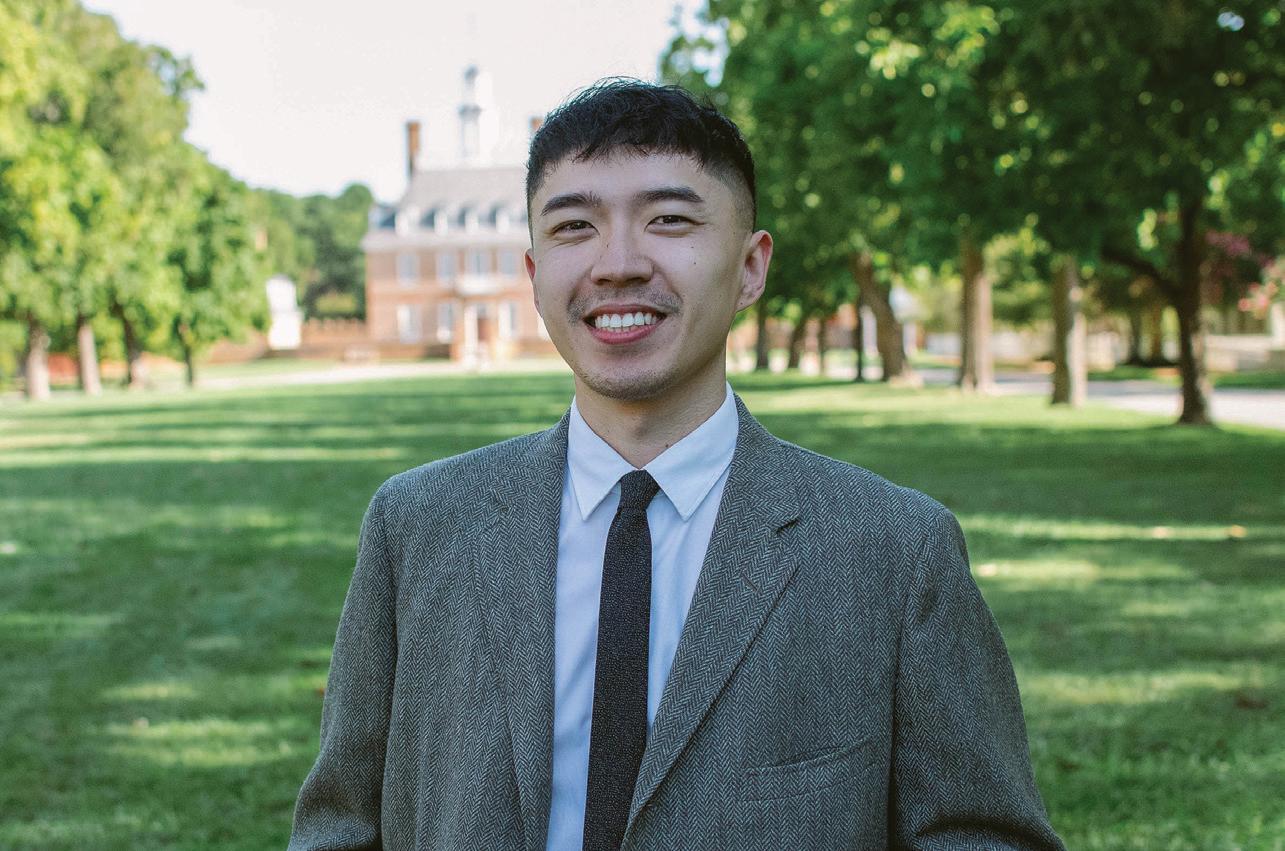
Lee Philadelphia, Pa.
Rev. Tom Reid Newton, Mass.
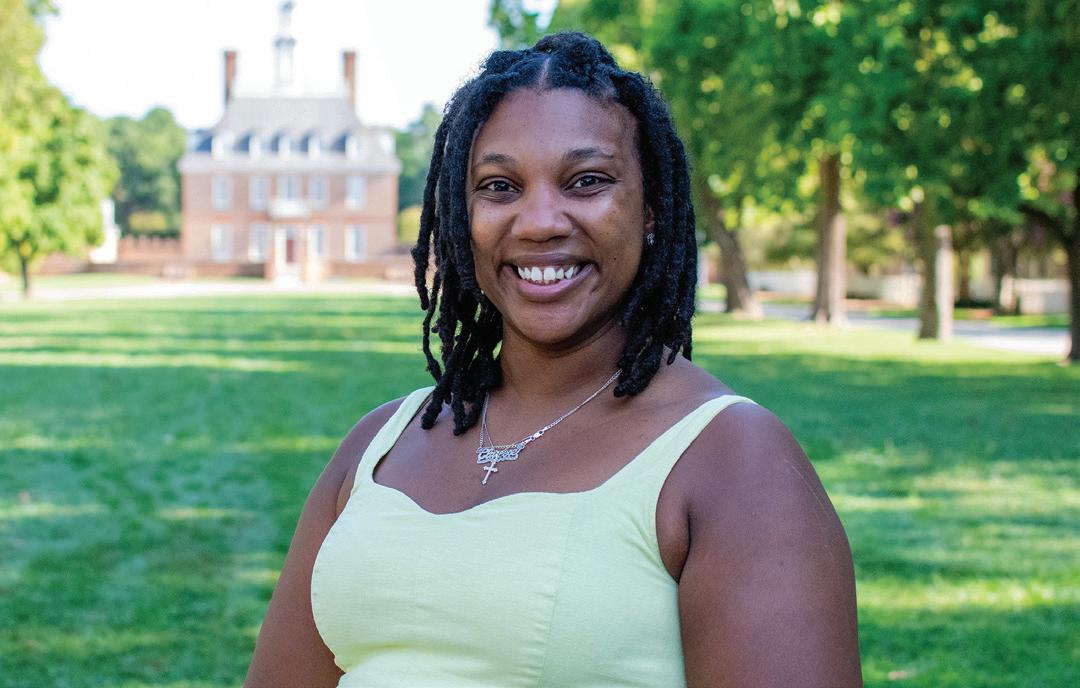
Clareese Saunders Queens, N.Y.

Lukas Smith Los Angeles, Calif.
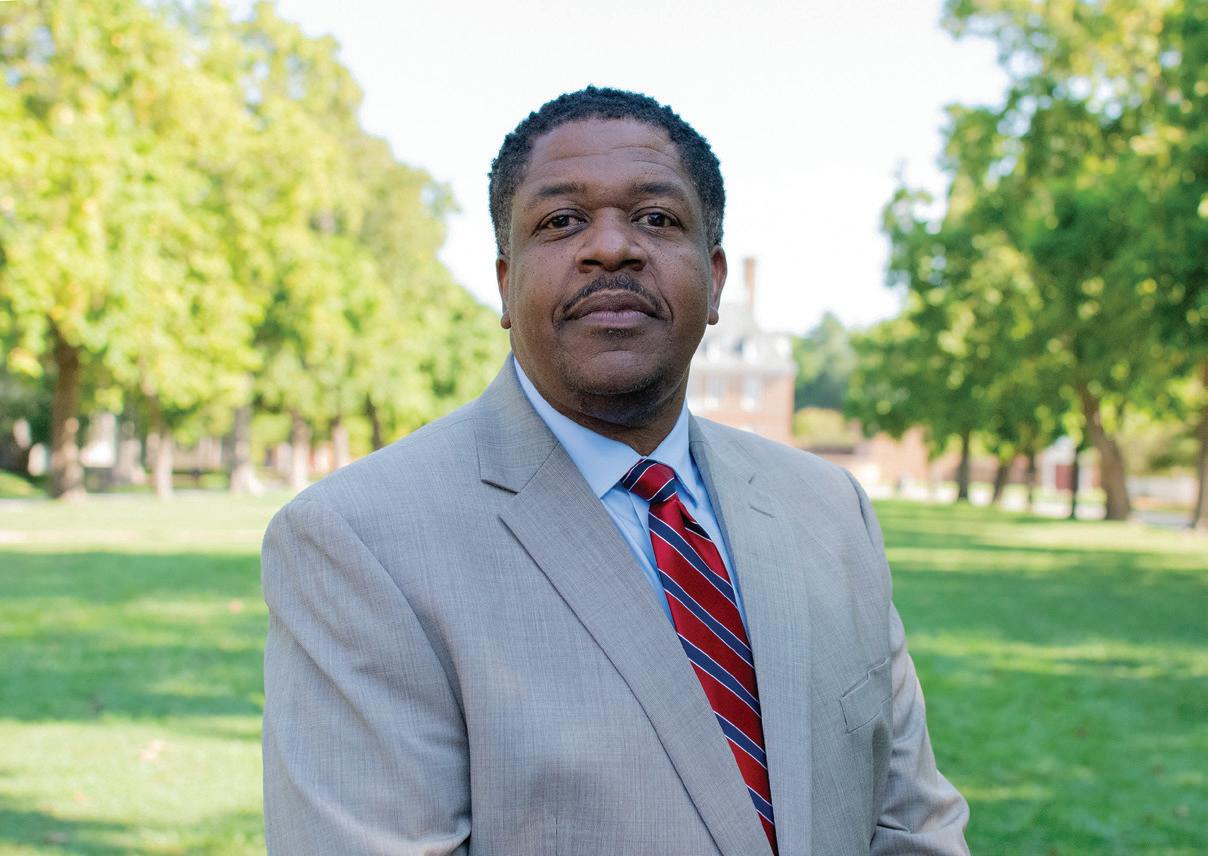
Rev. Aaron Tinch Bowie, Md.
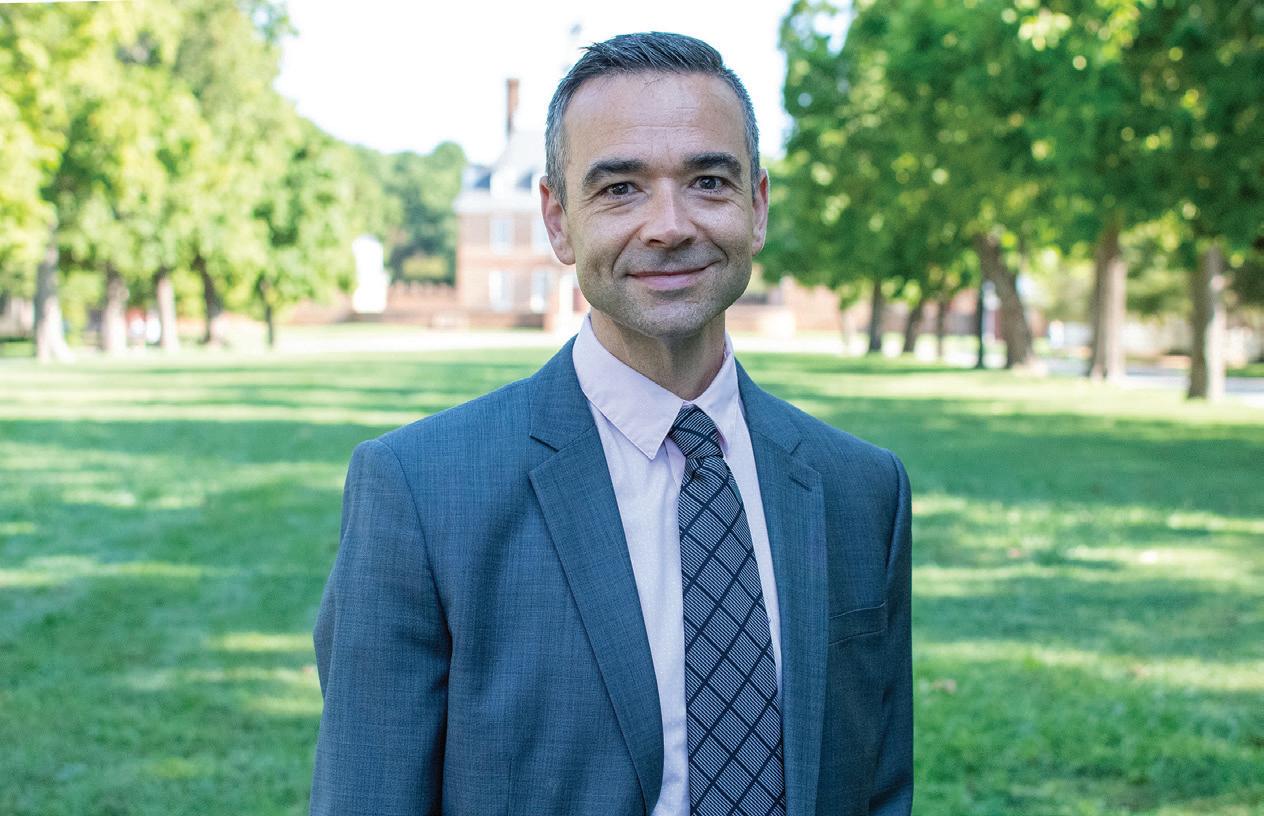
Zuber Pataskala, Ohio

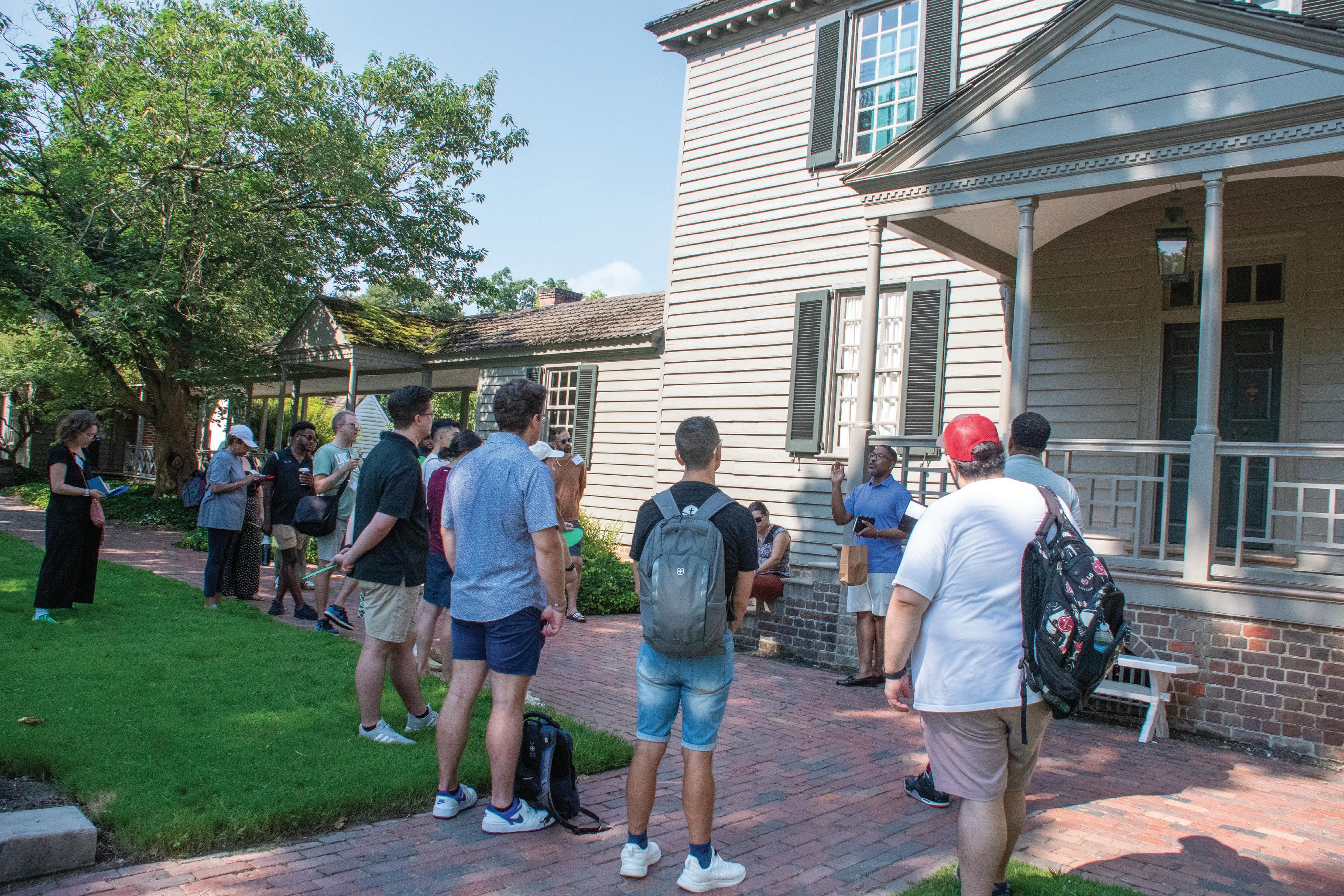
the roots of Black religious life and how enslaved and free Af rican Americans forged spiritual communities as an act of both faith and resistance. At Bruton Parish Church, they examined the legacy of government establishment of religion and the role of dissenting Baptists in pushing for disestablishment in this coun try and broader protections of conscience. One of the last stops was at the Public Gaol (“Jail”), where the BJC Fellows learned that religious dissent was criminalized and how early Baptists, Presbyterians and others pushed forward, navigating the law in their pursuit of religious freedom for all.
“From the reflections we all shared at the end of the week together, I could tell these ghosts were deeply felt by all,” said 2025 BJC Fellow Harmeet Kaur Kamboj. “Now, how do we make them seen and heard in the ways they deserve?”
The Rev. Abigaíl Medina-Betancourt, another member of the class, reflected on the people not often mentioned in history books who were part of the community. “What can I do to make sure that 300 years from now, the tour guide shares their stories? How can I continue reading the stories that silences tell? Let’s start writing them.”
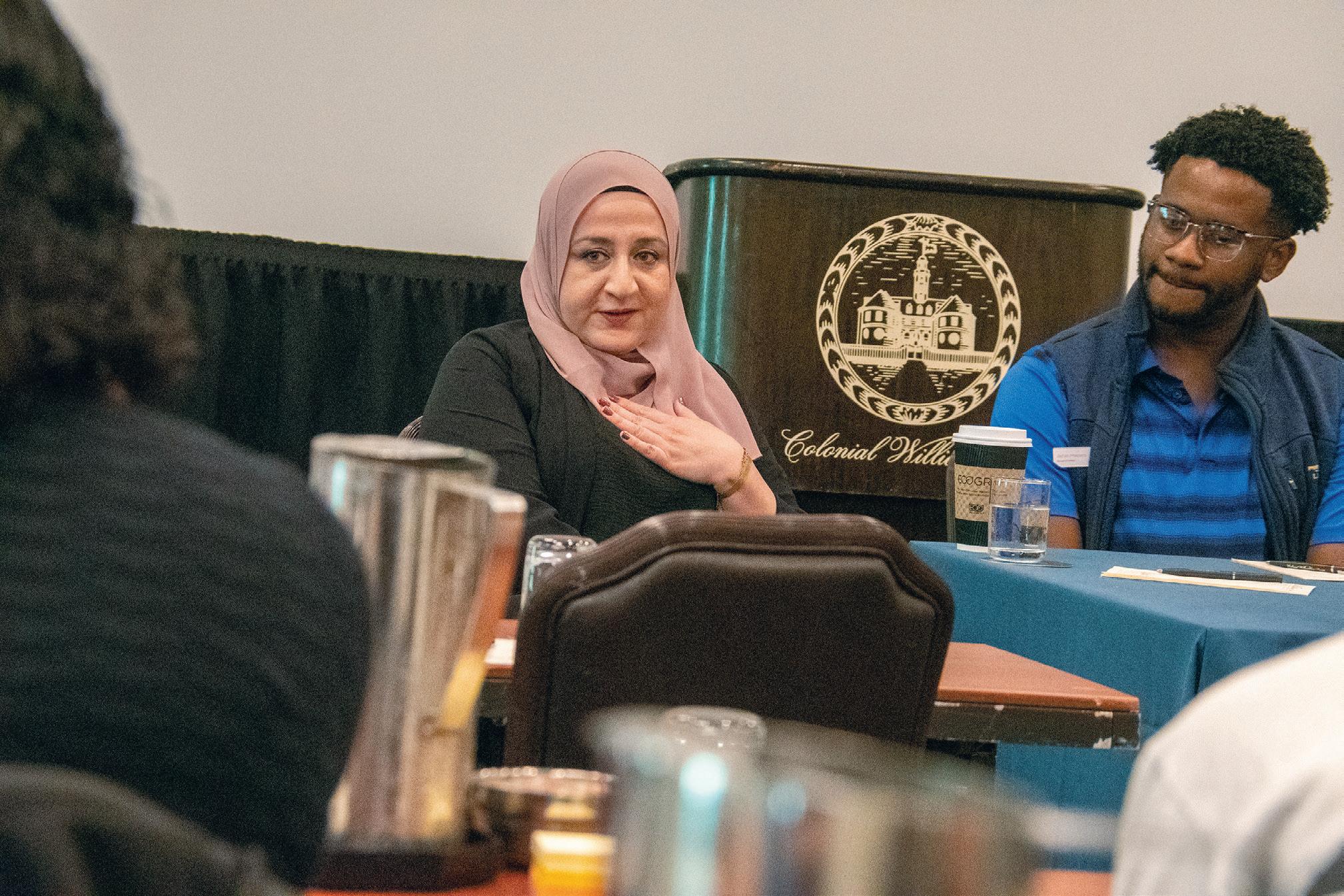
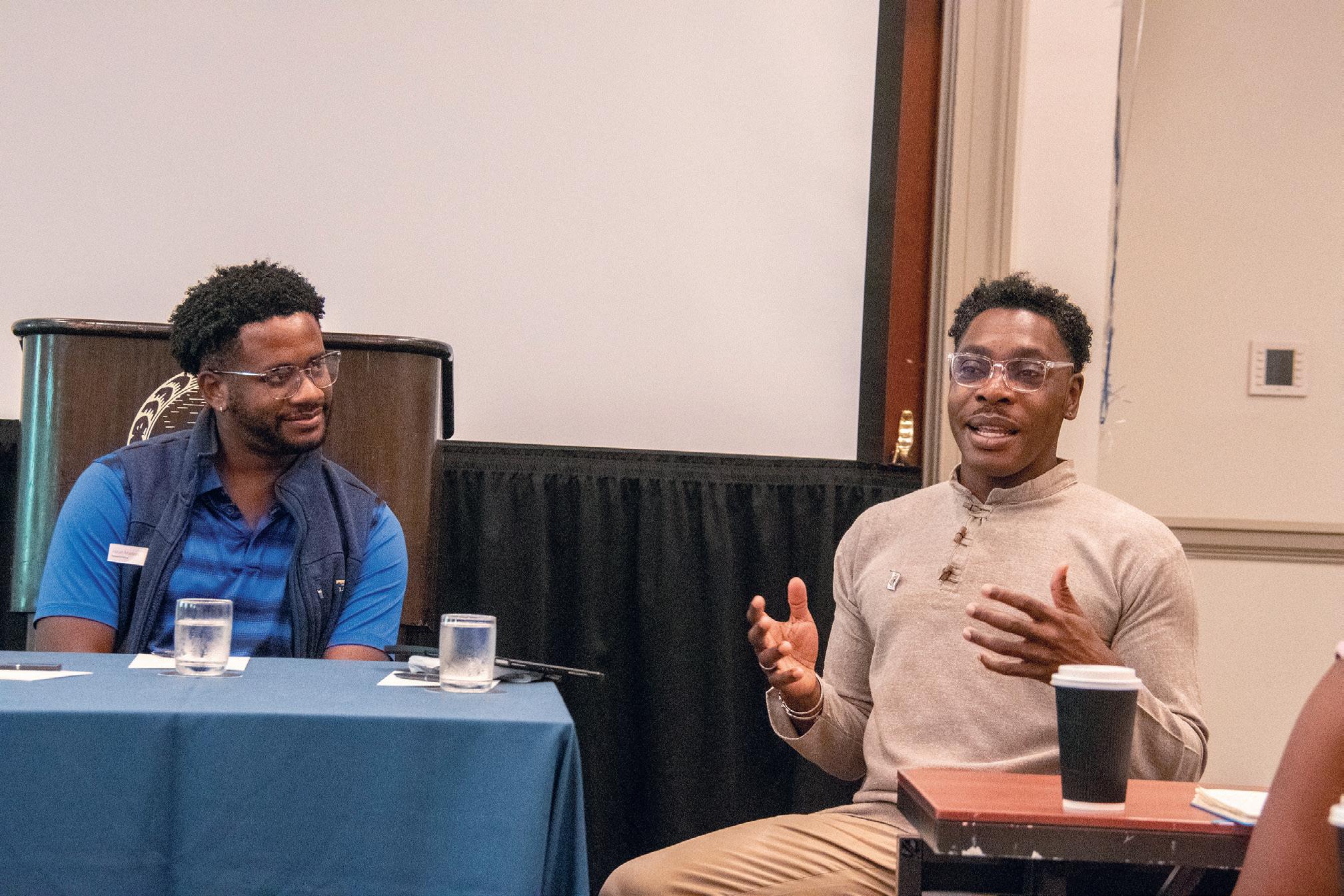
The five-day seminar also included other experts from BJC and beyond. Dr. Sabrina E. Dent, director of the BJC Center for Faith, Justice and Reconciliation and the leader of the BJC Fel lows Program, led a session on religious pluralism in America. The Rev. Jennifer Hawks, who serves as the director of advocacy for the Cooperative Baptist Fellowship, led sessions on the le gal foundations of religious freedom and religious exemptions. Melissa Rogers, the former director of the White House Office of Faith-based and Neighborhood Partnerships, spoke with the BJC Fellows about her book Faith in American Public Life and her time working in the Obama and Biden administrations. Following her session, Rogers engaged in a conversation with Dr. Walker on the theological and legal basis for religious freedom. The cohort also got a crash course on Christian nationalism and effective advocacy, featuring presentations from Joy Pettigrew, BJC’s community partnership manager, and Lisa Endean-Jacob, North Texas organizer for BJC’s Christians Against Christian Nationalism movement. BJC Communications Director Israel Igualate provided
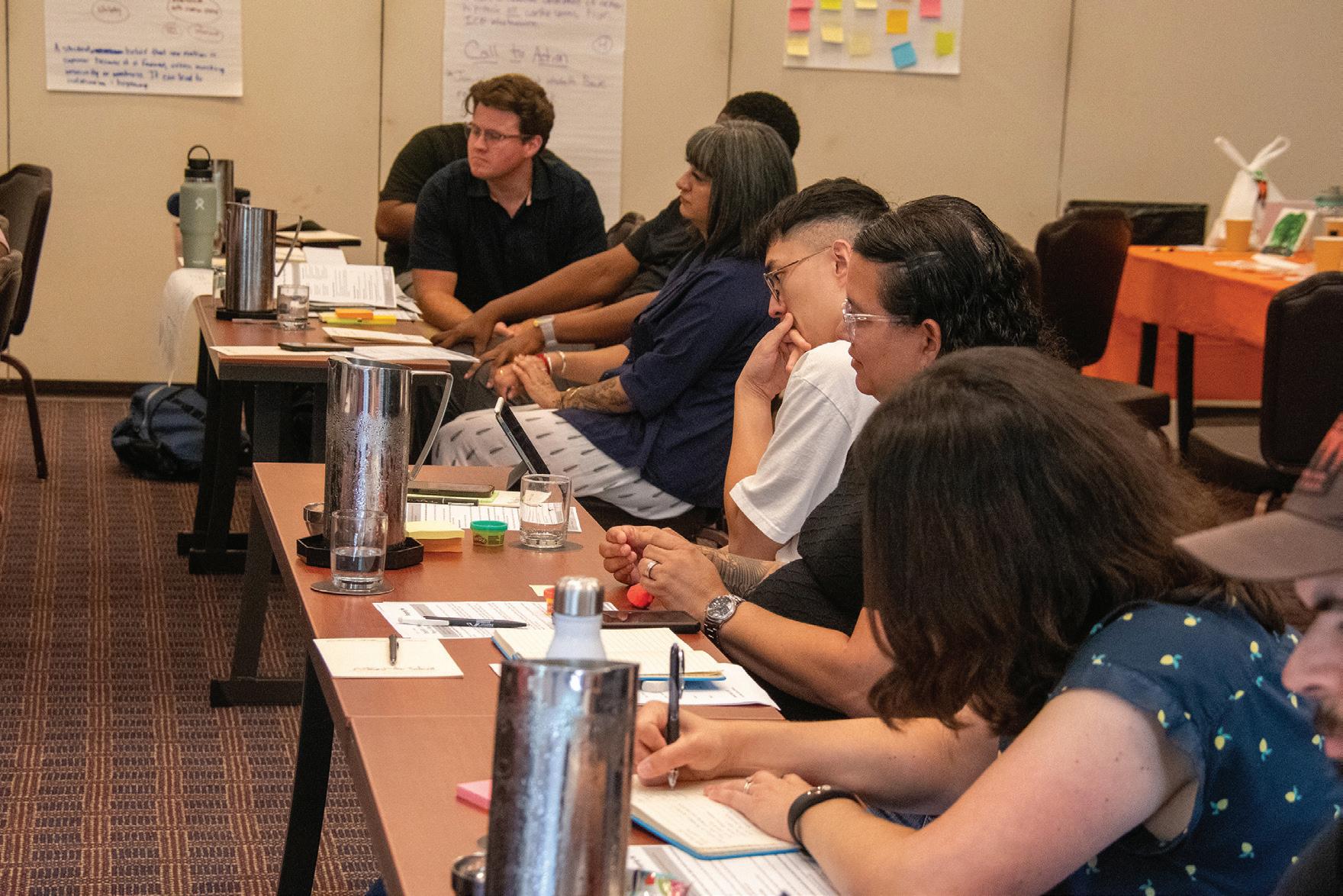
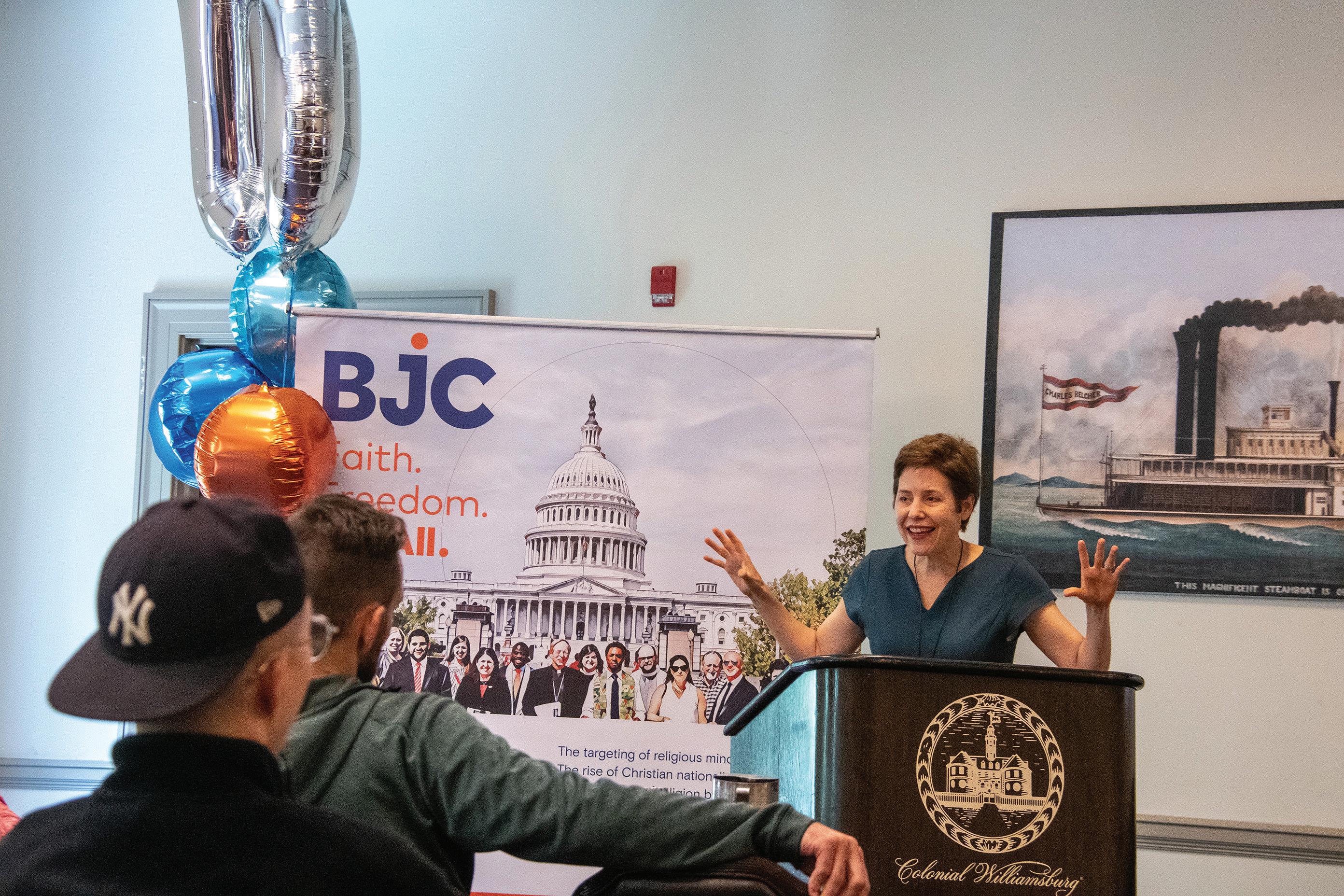
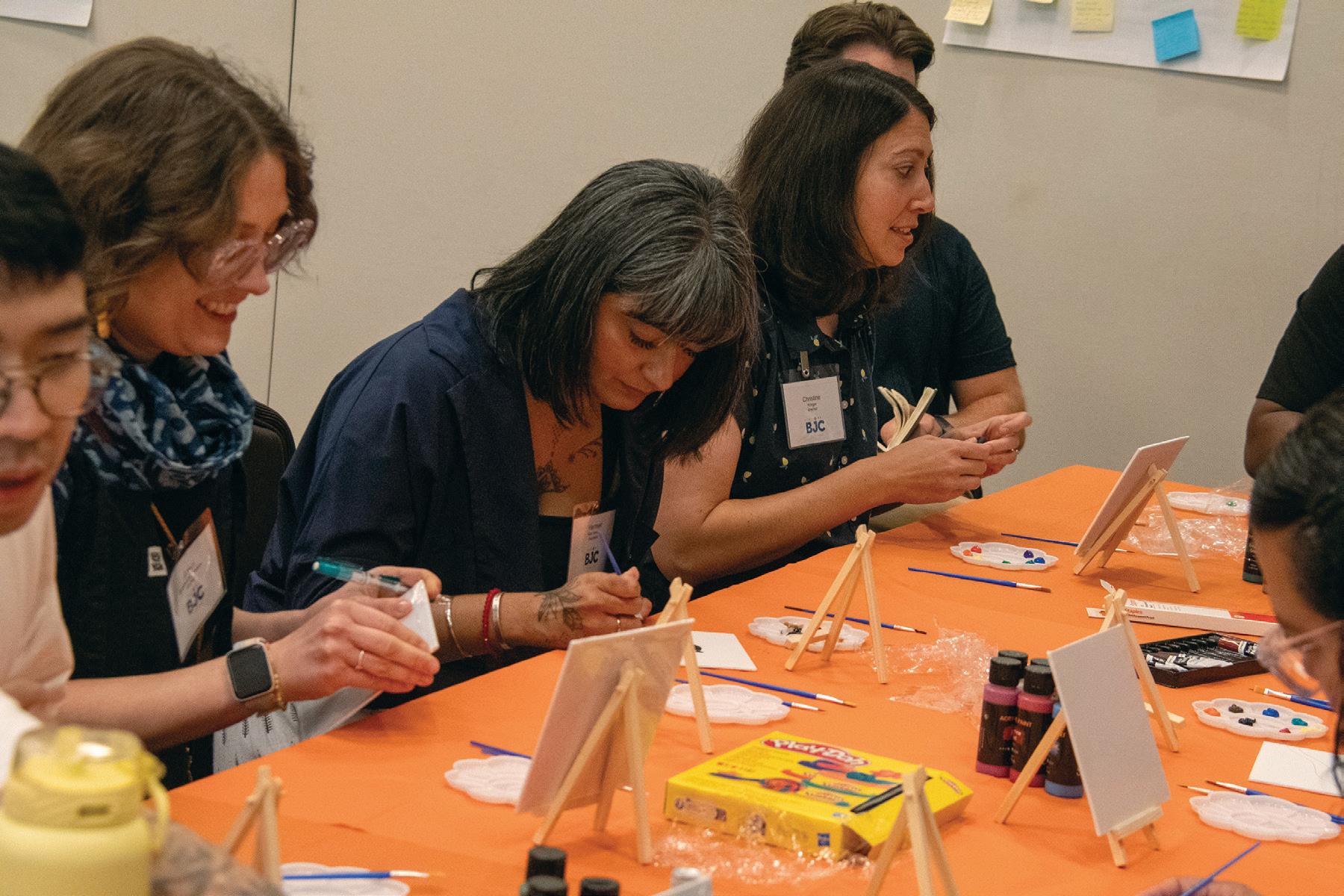
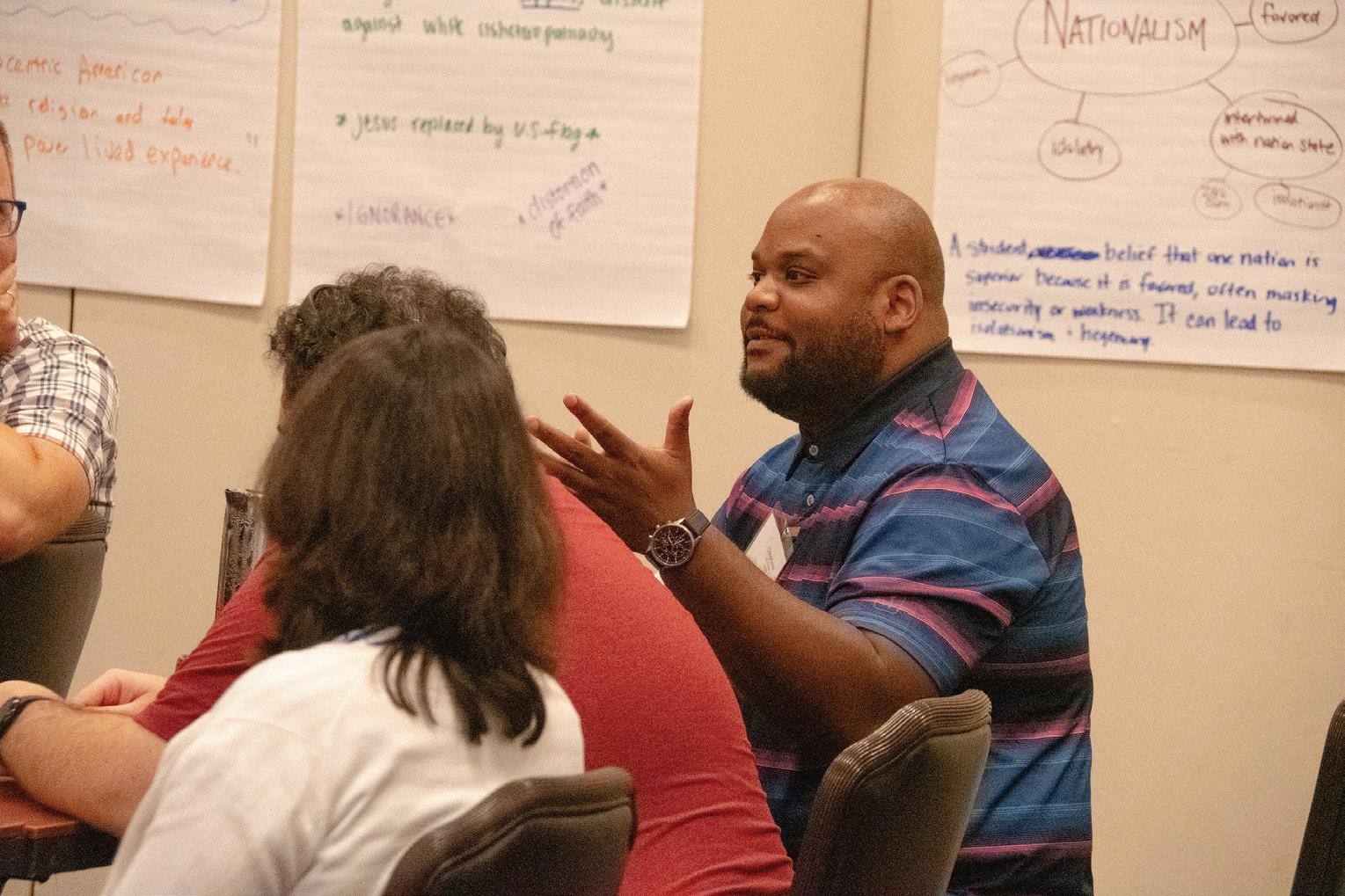
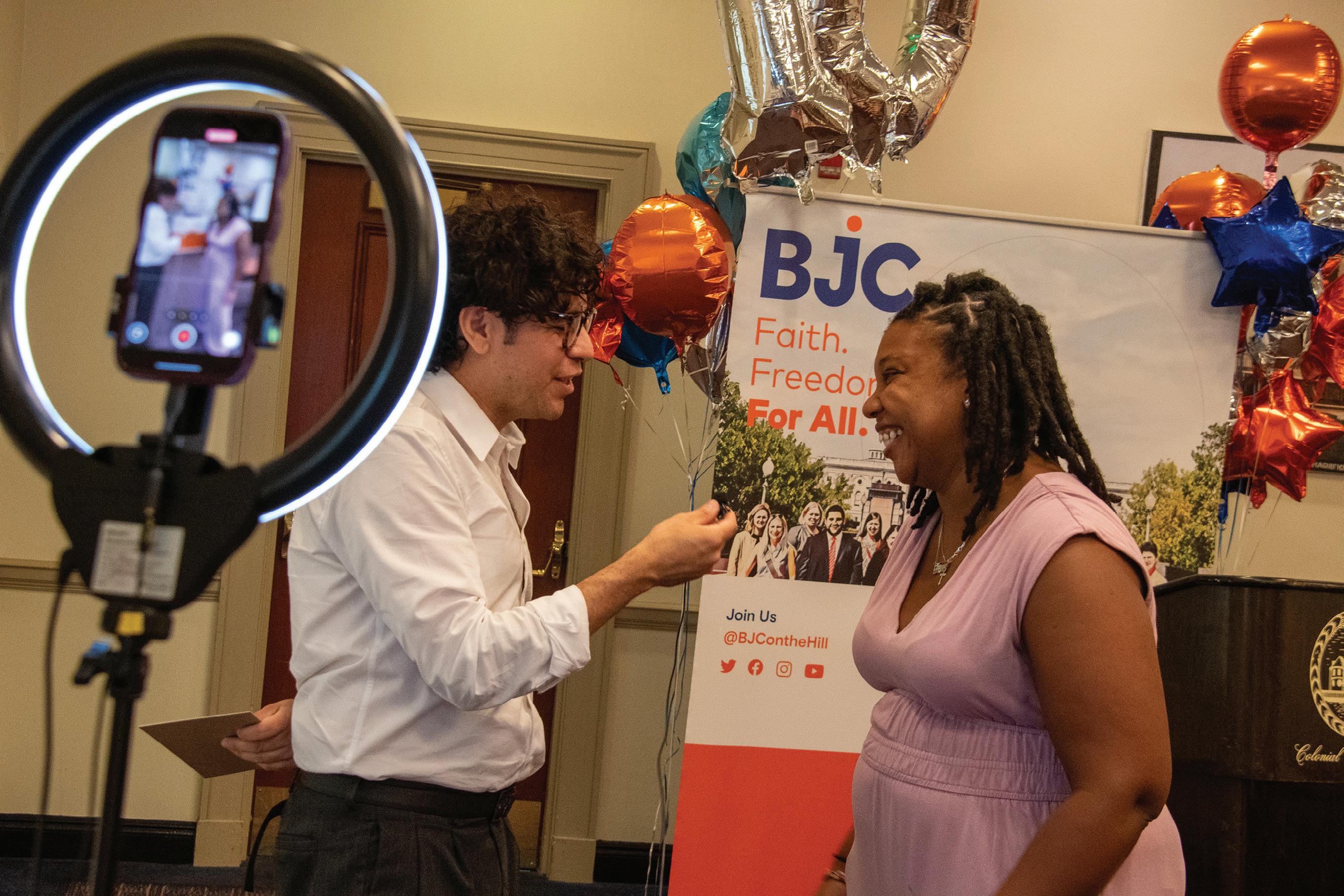

“What I really wish everyone knew is that religious freedom is not just about defending what I believe, but it’s also about protecting the rights of others to believe differently, or not to believe at all.”
Kyle Zuber, 2025 BJC Fellow


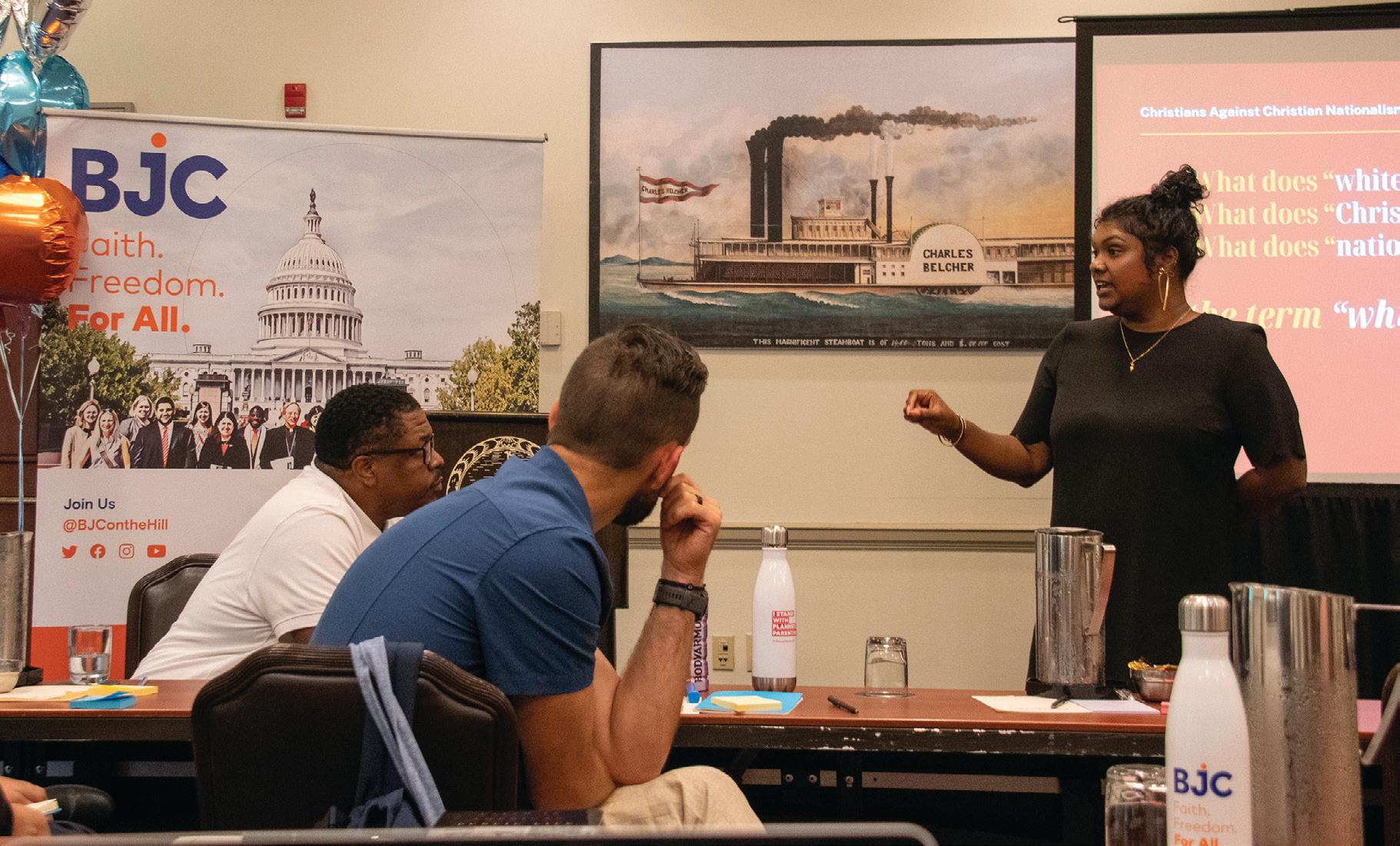
media training and some practice interview sessions for the cohort as well. The group also got to meet other BJC Fellows alumni who came to the session, creating new connections and expanding their networks.
And, no time in Colonial Williamsburg would be complete without hearing from historical interpreters, who interacted with the class as the people they portray. The BJC Fellows got to hear from and speak with a person portraying Patrick Henry, a founding father who was a staunch supporter of religious liberty throughout his political career, and the Rev. Gowan Pamphlet, an enslaved tavern worker who was also a preacher and the founder of Williamsburg’s First Baptist Church.
By the final day of seminar, the 2025 BJC Fellows emerged with an expanded vision of what religious liberty truly means. “What I really wish everyone knew is that religious freedom is not just about defending what I believe,” said 2025 BJC Fellow Kyle Zuber, “but it’s also about protecting the rights of others to believe differently, or not to believe at all.”
Each year, young professionals between the ages of 25 and 45 accepted into the program commit to more than just attending the seminar in Colonial Williamsburg; they pledge to advocate for religious liberty in their local communities and across the country. This commitment creates a ripple effect, as each person returns home equipped with knowledge as well as the tools and network necessary to effect real change.
The BJC Fellows Program is vital to the work of extending and defending faith freedom for all people. In an era marked by rising religious polarization, increasing challenges to pluralism and threats to the very foundations of religious liberty, this program stands as a symbol of hope and practical action.
“The 2025 BJC Fellows represent the future of faith freedom advocacy,” said Dr. Dent. “Their unique voices and experiences will help shape a more inclusive and equitable conversation around religious freedom.”
The BJC Fellows Program is possible thanks to our generous supporters. You can make a gift designated to programs like this from the BJC Center for Faith, Justice and Reconciliation at BJConline.org/Center

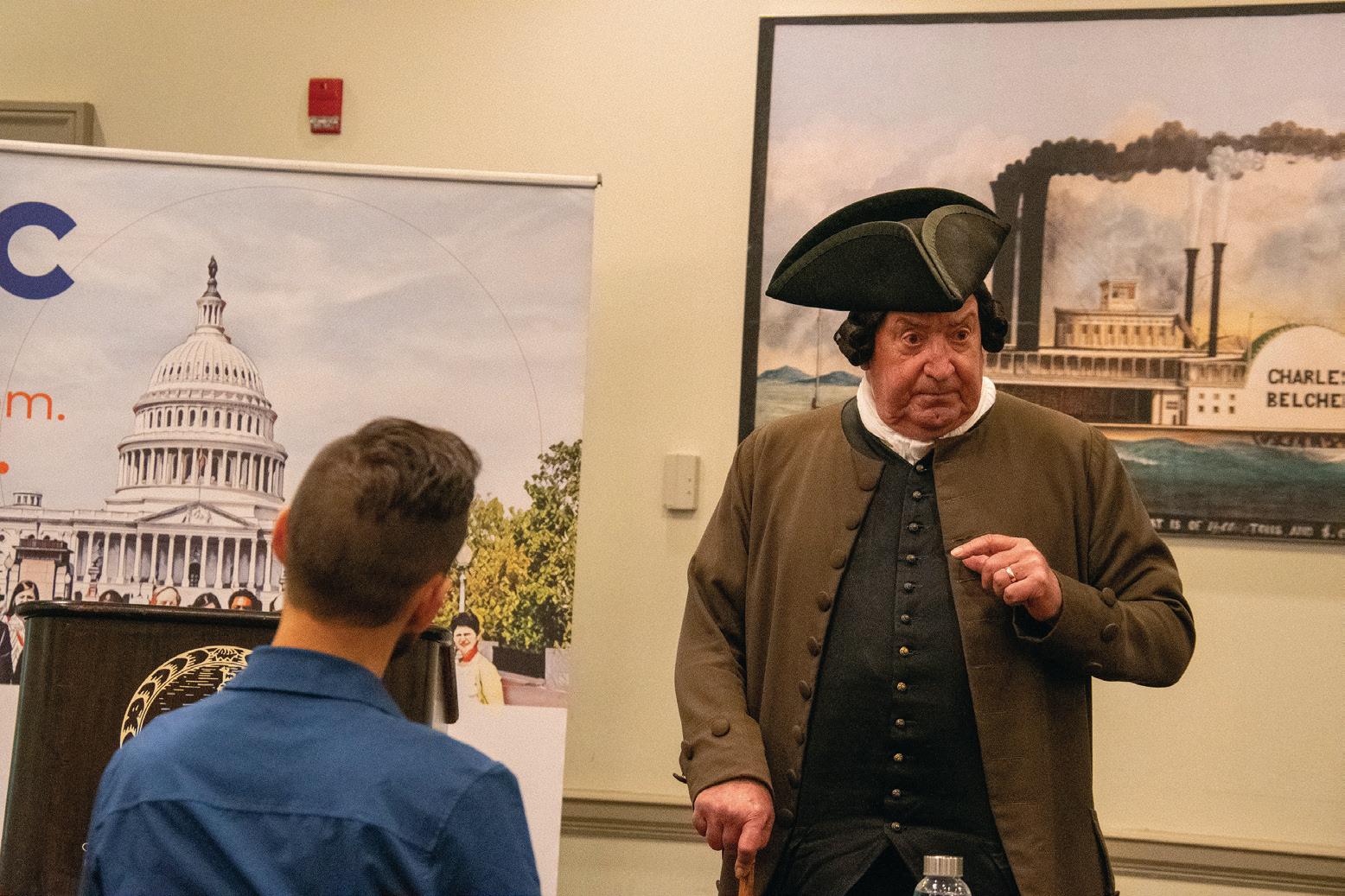
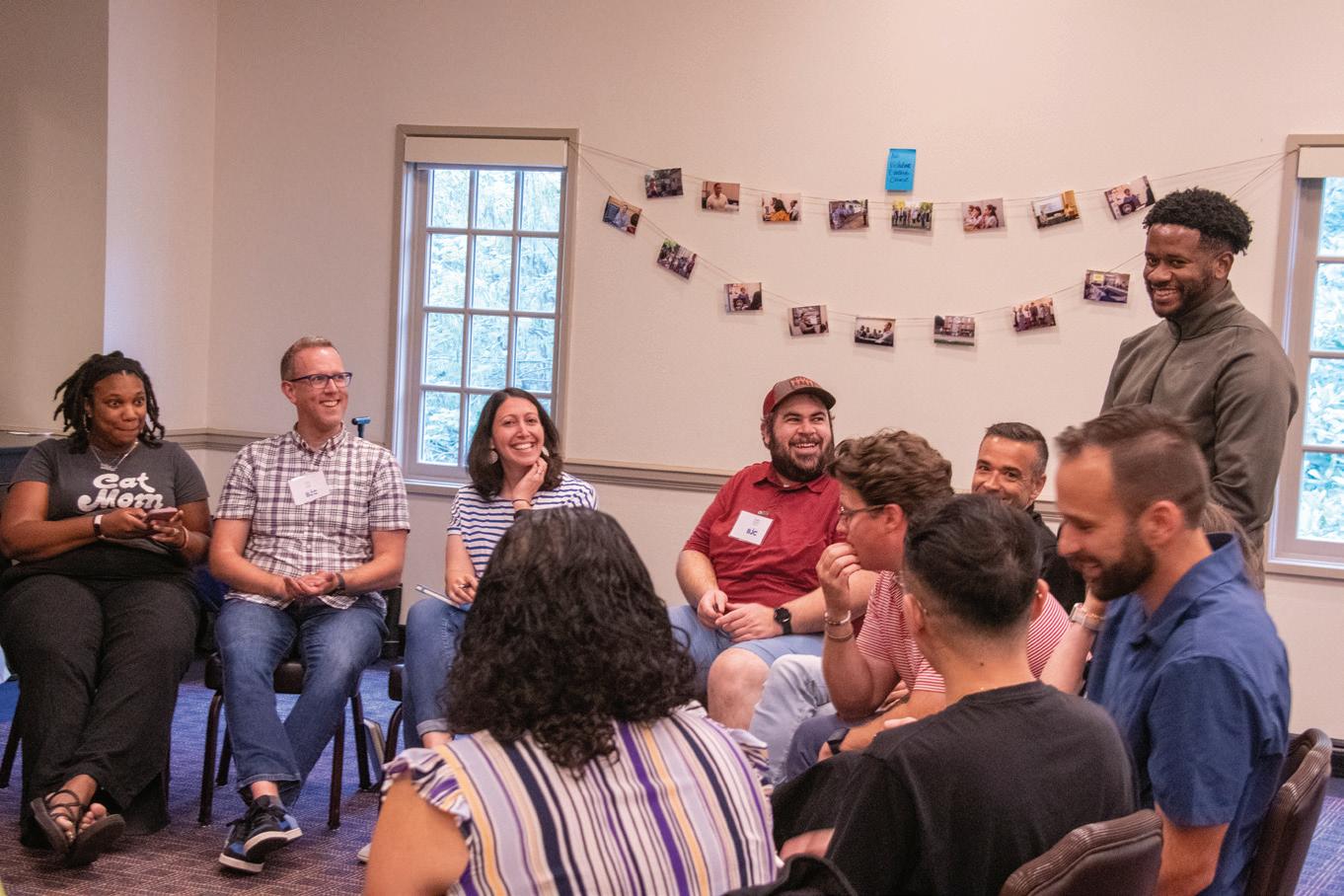

By Bob Smietana for Religion News Service, April 22, 2025
Department of Veteran Affairs Secretary Douglas Collins has instructed the agency’s employees to report any instances of anti-Christian bias, including any policies that are “hostile to Christian views” or punishments for displaying Christian symbols. ... The email also says the task force will “review all instances of anti-Christian bias” but makes no mention of how to report discrimination of any other faiths. ...
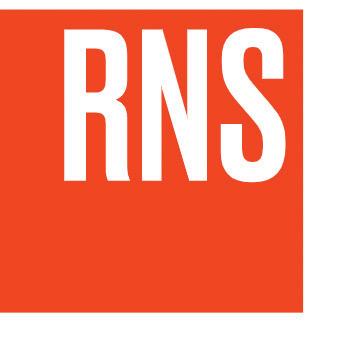
Amanda Tyler, executive director of the Washington, D.C.-based Baptist Joint Committee for Religious Liberty, expressed concerns with the focus on anti-Christian bias but not religious liberty when Trump issued his executive order in early February.
“We have strong concerns that this new task force could be weaponized to enforce a theological conformity that will harm everyone’s religious freedom, including those of Christians,” she said. “Today’s action is consistent with inflaming the completely unfounded claims of rampant Christian persecution in a majority-Christian nation.” ...
Published by MAZON, May 9, 2025
As Congress works to finalize the Trump administration’s economic agenda, basic needs programs like the Supplemental Nutrition Assistance Program (SNAP) and Medicaid are in danger of being slashed by hundreds of billions of dollars. In response, religious leaders and heads of faith-based organizations are speaking out in opposition to cutting these programs which millions of low-income Americans rely on to make life more affordable. ...
“As a single mother and person of faith, I am disgusted by this generational moral crisis of a significant magnitude that will impact how many babies, children, working parents, families and seniors will be able to survive and thrive right now and for years to come,” stated Dr. Sabrina E. Dent, Director, BJC Center for Faith, Justice and Reconciliation. “There was a time in my life when I benefited from life-sustaining programs such as Supplemental Nutrition Assistance Program (SNAP), WIC, and Medicaid, which helped me take care of my child when I couldn’t do it alone as a single parent. It is a humbling experience to apply for these programs at any stage of life. It is an egregious and cowardly act for Congress to even contemplate a budget that will cut social service programs. Thus, it is our moral obligation to protect children and families along with their dignity by saying NO to these budget cuts.”
‘We were called
By Fiona André for Religion News Service, June 30, 2025
On June 27, the Supreme Court ruled in favor of religious parents from Maryland’s Montgomery County who sought to remove their children from classes that discussed LGBTQ-themed storybooks. ...
Holly Hollman, general counsel at [BJC], a faith-based organization advocating for religious freedom, said the decision signals that the court’s majority seems to be concerned about the loss of some religious perspectives in culture. As many previous cases have indicated that exposing students to certain ideas, characters or themes through school curricula wasn’t sufficient to state a constitutional claim, this decision is notable in its “unwillingness to view this curriculum as simply exposure to ideas,” she said.
“For the majority’s perspective, this material or this curriculum, and perhaps the teacher’s guide more importantly that went with it, seem to be telling students what to think about issues of gender identity and sexual orientation in ways that the parents asserted interfered with their ability to provide the religious formation for their children at that age,” Hollman said. ..
The decision raises questions about public schools’ ability to enforce opt-out policies for classes that address contentious topics in the future, said Hollman. ...
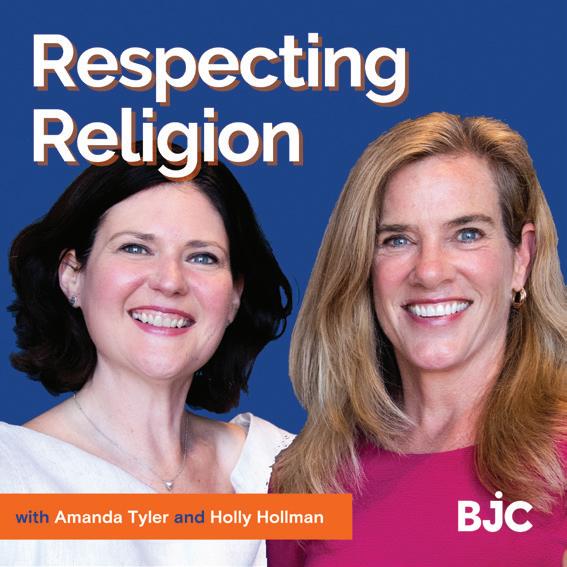
Subscribe to Respecting Religion wherever you get your podcasts!



Ep. 01: The Supreme Court is back … and so are we
Ep. 02: Oklahoma and Texas try to force Bible teaching in public schools
Ep. 03: On the road with How to End Christian Nationalism (featuring Bill Leonard)
Ep. 04: Election Day 2024: What happened and where do we go from here?
Ep. 05: Secularization and the fracturing of the American left with Dr. John Compton, Dr. Angela Parker, and Dr. David Gushee
Ep. 06: Oral arguments in U.S. v. Skrmetti: Medical care for transgender youth and the Equal Protection Clause
Ep. 07: Jimmy Carter: Baptist, president, servant leader
After discussing several Supreme Court cases, the 2024 elections, moves of the new Trump administration, the release of How to End Christian Nationalism, the passing of Baptist President Jimmy Carter, and more, BJC’s Respecting Religion podcast wrapped season 6 in July and was recognized for excellence.
The podcast earned a coveted “Best in Class” award from the Religion Communicators Council, presented during the 2025 DeRose-Hinkhouse Memorial Awards. “But ... is it Christian nationalism?” — Episode 21 from season 5 — took home the trophy. “For me, listening was a complete joy,” wrote one judge about the episode. “Every time a question was answered, my understanding of Christian nationalism was clarified.” This is the second time the podcast earned a “Best in Class” award, after winning one for season 3.
Our season 6 finale went in-depth on decisions in Trump v. CASA (the “birthright citizenship” case that is about national injunctions), Roake v. Brumley (a Ten Commandments case in Louisiana), Mahmoud v. Taylor (parents who want to opt-out of curriculum), and U.S. v. Skrmetti (medical care for transgender youth). Our live episode included a conversation about the decision in Oklahoma v. Drummond, which stopped a religious charter school.
With 20 episodes providing more than 13 hours of conversation, the latest season has something for everyone, and it’s available on your favorite podcasting platform. Check out the list of episodes below, and don’t miss your chance to catch up on insight and observations from BJC Executive Director Amanda Tyler and General Counsel Holly Hollman before a new season starts this fall. You also can access all episodes at BJConline.org/RespectingReligion
Ep. 08: Ten Commandments and Trump’s first week
Ep. 09: Threats to religious freedom from the Trump administration and a look at the growing resistance
Ep. 10: March Madness: Department of Education, school vouchers, and a Supreme Court preview
Ep. 11: African Americans and Religious Freedom (a conversation with Dr. Sabrina E. Dent and Dr. Corey D.B. Walker)
Ep. 12: Back to SCOTUS: Regular business in disturbing times
Special Episode: Kilmar Armando Ábrego García and the rule of law (featuring Melissa Rogers)
Ep. 13: Active citizenship: A conversation with Melissa Rogers about promoting religious freedom and the common good
Ep. 14: The blockbuster SCOTUS case over religious charter schools
Special LIVE Episode: Vouchers in the budget bill, SCOTUS stops religious charter schools, and new decision on the Dept. of Education

Ep. 16: What’s going on with the Supreme Court, a new travel ban, and the military in L.A.?
Ep. 17: Christian nationalism and the Texas public sphere
Ep. 18: End of term roundup
“Since lobbying is simply ‘attempting to influence legislation,’ every Christian should be a lobbyist,” said the Rev. Dr. James M. Dunn, in his typical wit and wisdom.
Rev. Dr. Dunn, who led BJC as executive director in the 1980s and 90s, believed government intrusion in matters of faith was a violation of soul freedom and a threat to the separation of church and state. More importantly, he believed that this intrusion should not go unchecked; it was the responsibility of people of faith to advocate for the protection of the separation of church and state.
When the Reagan administration insisted on changing church-state relations in the early 80s, Rev. Dr. Dunn and BJC stood against a Reagan-proposed amendment that would put government-sponsored prayer in schools. “It is despicable demagoguery,” he said at the time, “for the president to play petty politics with prayer. He knows that the Supreme Court has never banned prayer in schools. It can’t. Real prayer is always free.”
Sensing an opportunity to act, Rev. Dr. Dunn and BJC helped get a proposal passed that would guarantee students the right to gather and pray during noninstructional time (if they so choose). It made its way to Congress and passed in 1984, becoming the Equal Access Act. Working with people and organizations on both sides of the aisle, Rev. Dr. Dunn took a senseless proposal and turned it into a positive step forward for religious liberty, setting a tone for future efforts that accommodate students’ religious freedom in public schools while fighting state-sponsored religious exercises.
Almost a decade later, after a problematic Supreme Court ruling prohibited Native Americans from using peyote during religious ceremonies, Rev. Dr. Dunn and BJC again saw an opportunity for action. Together, they rallied a broad coalition to reinstate religious freedom protections through what became the Religious Freedom Restoration Act of 1993 (RFRA). Today, RFRA continues to give individual claims for religious exercise in the face of government-imposed burdens a chance to prevail. RFRA is used to allow individual exercise of religion in cases involving religious dietary requirements, grooming standards, Sabbath observance and more.
BJC, now led by Executive Director Amanda Tyler, is again on the front lines of the fight to champion religious liberty for all. In response to increased attacks on religious freedom at the local level, new local organizing groups are forming in 20+ communities. Through the podcast “Respecting Religion,” BJC continues to educate on matters related to religion and law. And when the current administration reinstated a travel ban targeting majority-Muslim countries, BJC immediately sent out a call to our supporters asking for them to support the NO BAN Act by contacting their legislators.
Attacks on religious freedom are not new in the United States, but the roadmap of fearless religious liberty advocacy that Rev. Dr. Dunn left behind offers us a guide on how to resist government encroachment and, more importantly, how to turn bad ideas into an opportunity to advocate for better ones. As Rev. Dr. Dunn liked to say, “We are free to fail. We are not free to fail to try.”
In honor of the legacy of James Dunn, BJC formed the James Dunn Legacy Circle — an opportunity to leave a planned gift to BJC. Learn more and make your commitment by visiting
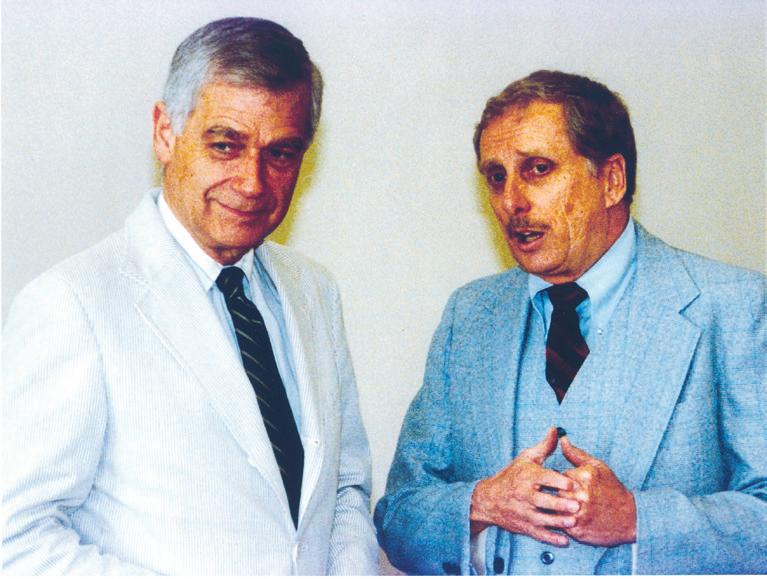
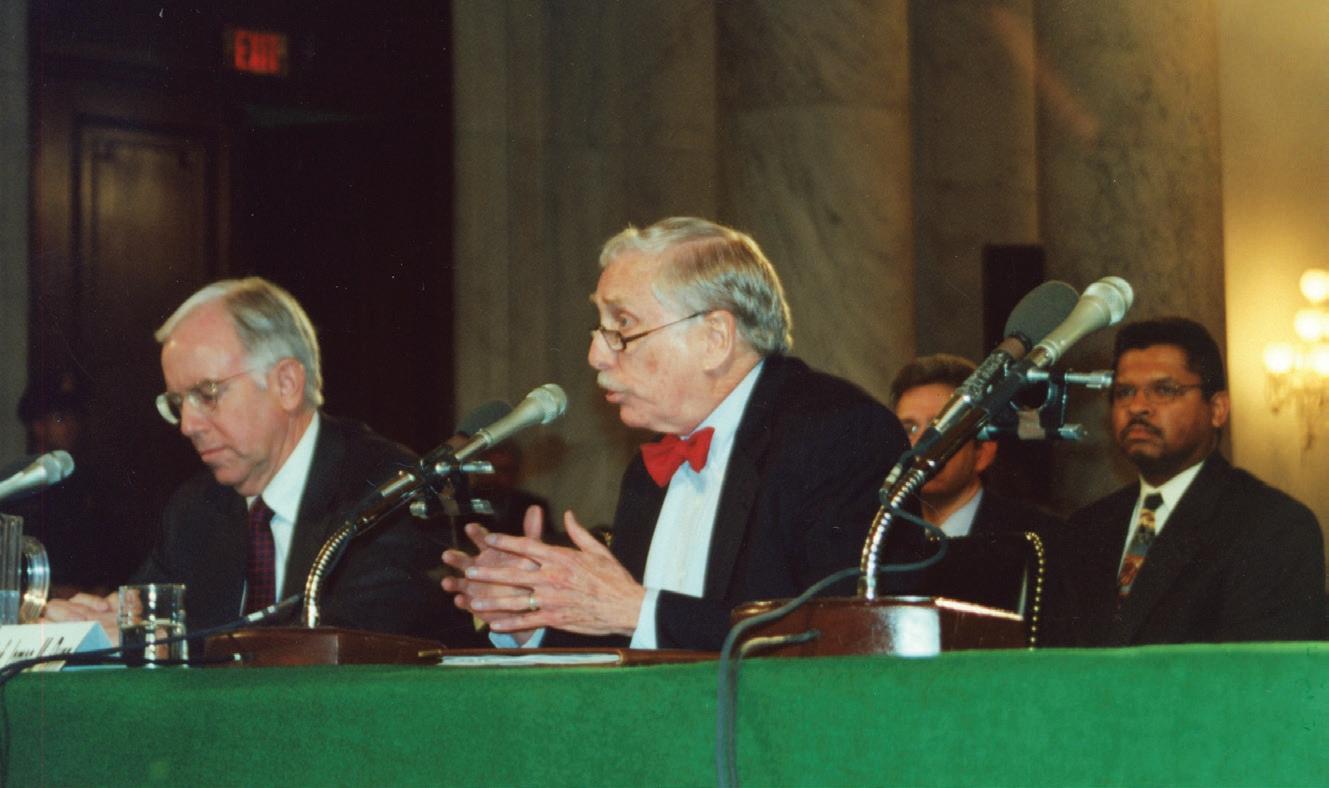

“When you look for answers remember to faith on, risk on, even fumble on
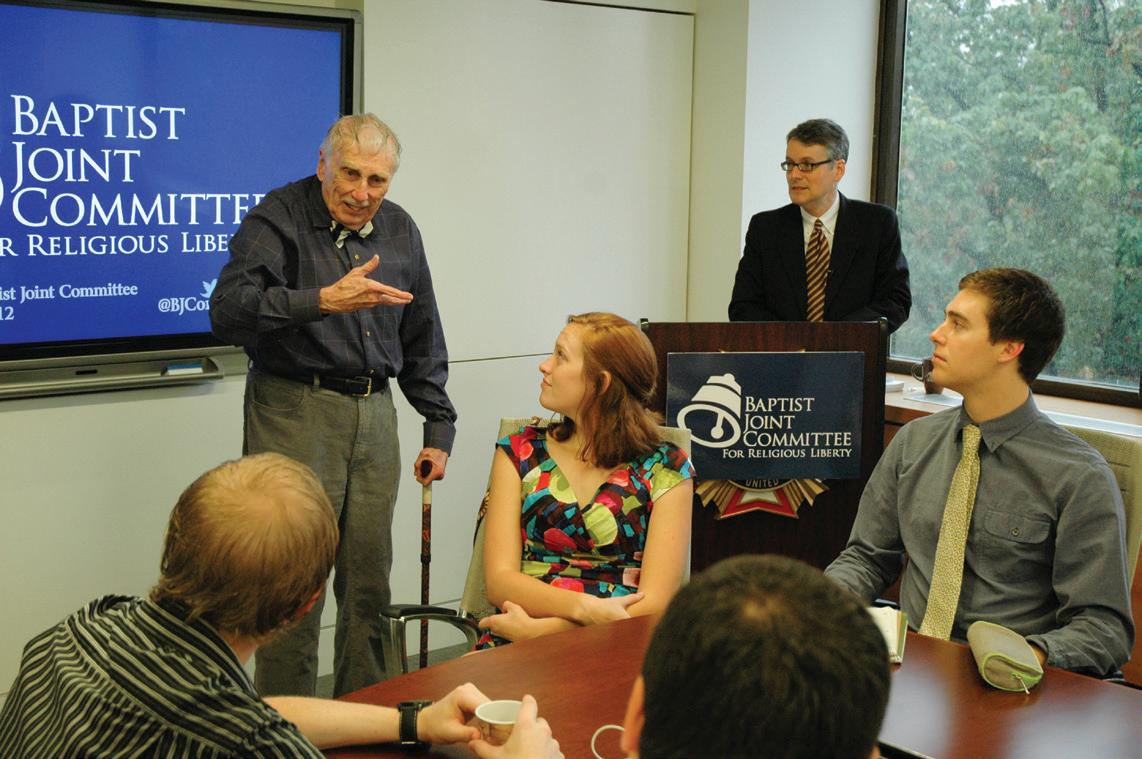
This summer, BJC staff members had the opportunity to connect with people across the country at various conventions hosted by some of the Baptist denominational bodies who are part of our work (you can see the full list on the back page of this magazine). Here are a few photos and highlights from four gatherings.

The Christians Against Christian Nationalism Action Center created new connections during the Cooper ative Baptist Fellowship General Assembly in June, providing avenues to connect with local groups across the country and serving as a catalyst for conversation and partnership. The booth included a physical map of our current and emerging groups so people could see where they could connect and where there are oppor tunities to grow.
BJC Executive Director Amanda Tyler led a workshop titled “To What Is the Church Called Today? A Faithful Witness in the Age of Christian Nationalism,” and she signed copies of her book How to End Christian Nation alism in an event sponsored by Judson Press.
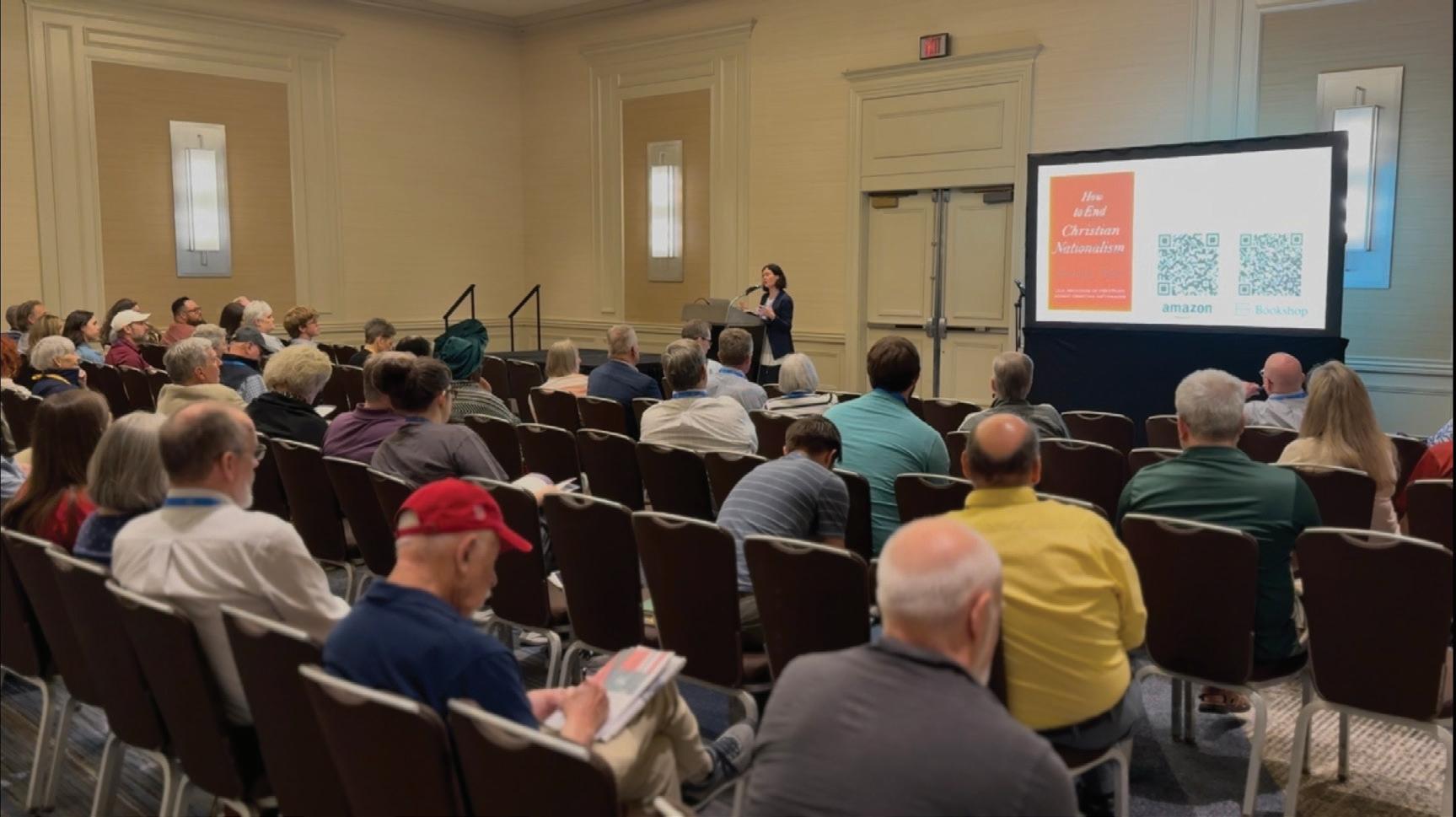

BJC hosted a booth and created connections during the Alliance of Baptists Annual Gathering in March, which had a theme on womanism and traditions of resistance. In addition to sharing materials and resources with those in attendance, we gathered for fellowship with BJC supporters, too, while they were in town for the event.
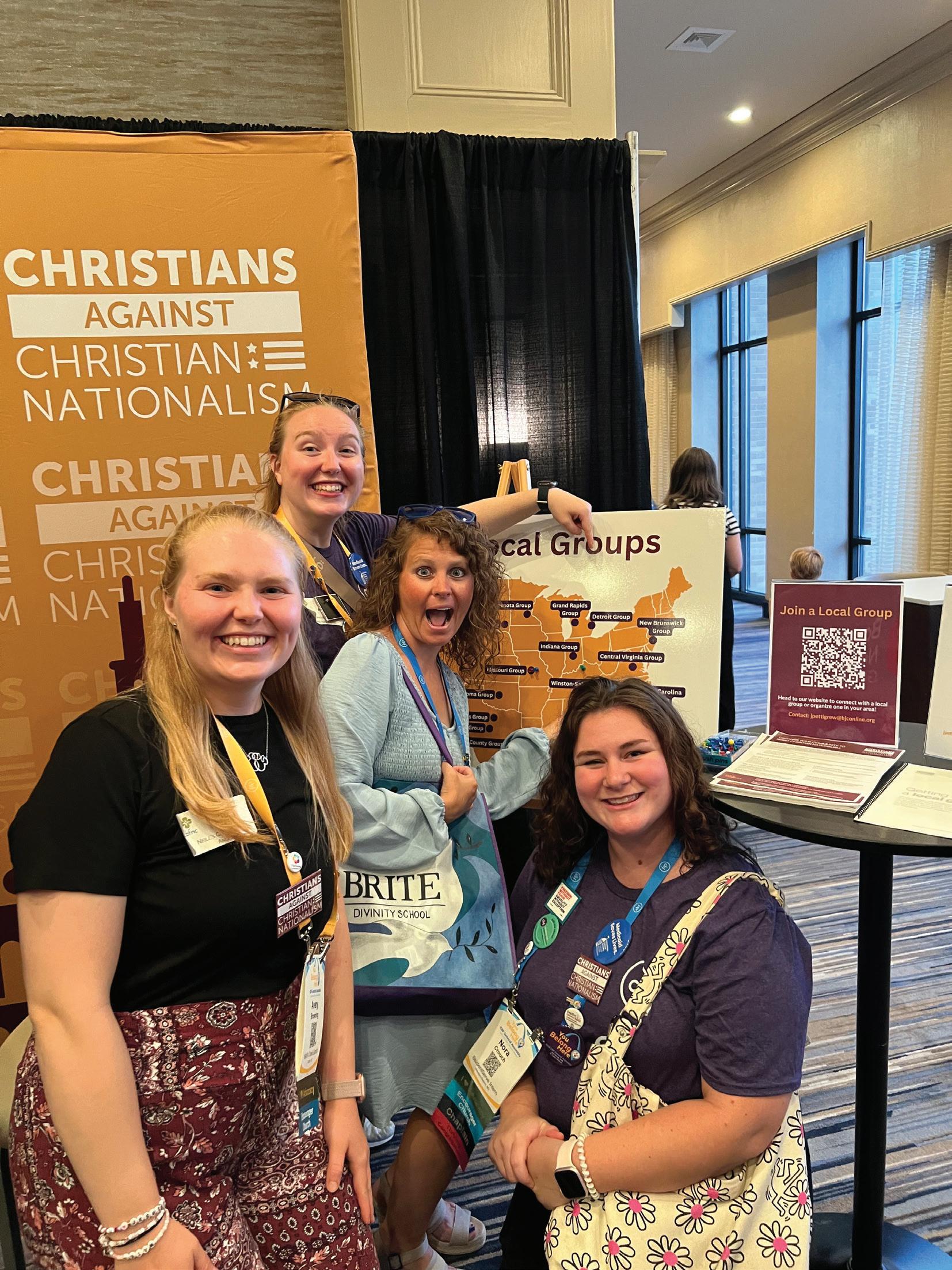


“It’s Time” to embrace, empower, emend, and evaluate was the theme of the 64th Annual Session of the Progressive National Baptist Convention. Dr. Sabrina E. Dent, director of the BJC Center for Faith, Justice and Reconciliation, brought greetings from BJC, and the multi-day event featured prophetic preaching from the Rev. Dr. Otis Moss III, the Rev. Dr. Frederick D. Haynes III, the Rev. Marissa Farrow, and the Rev. Dr. Howard-John Wesley, just to name a few. During one powerful moment, the Rev. Jesse Jackson came on stage and was presented with an award by the Rev. Dr. David Peoples, president of PNBC, recognizing the Rev. Jackson as “a pillar of strength for the Black community and the civil rights movement.”
Dr. Dent distributed copies of the book African Americans and Religious Freedom during the July event and spoke about the need to do the work of justice. She is pictured below with the Rev. Dr. Anthony Everett of BSK Theological Seminary, the Rev. Barbara Lavarin of Baptist Women in Ministry, and the Rev. Dr. Lynn Brinkley of the Pan African Koinonia of the Cooperative Baptist Fellowship.
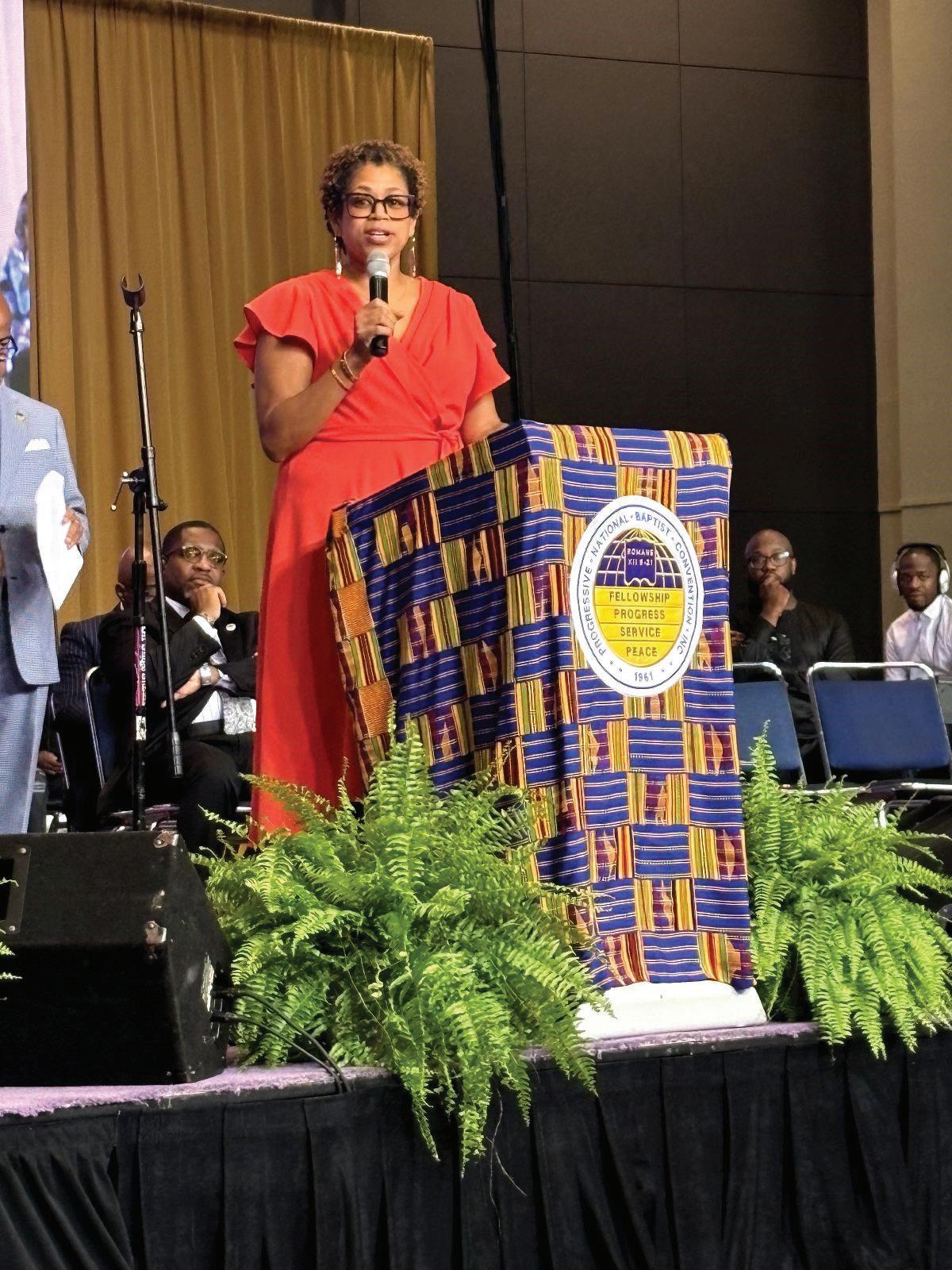
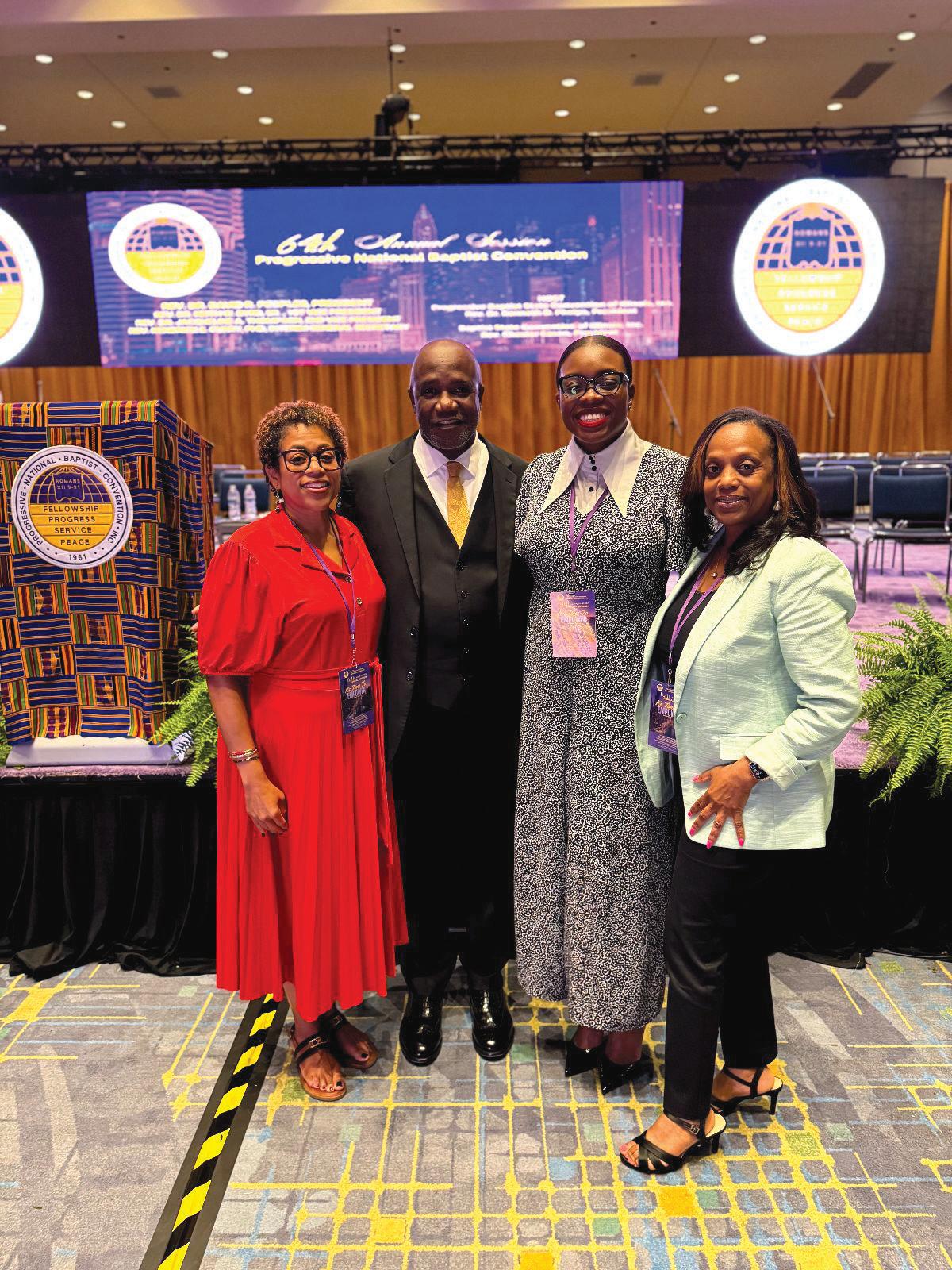
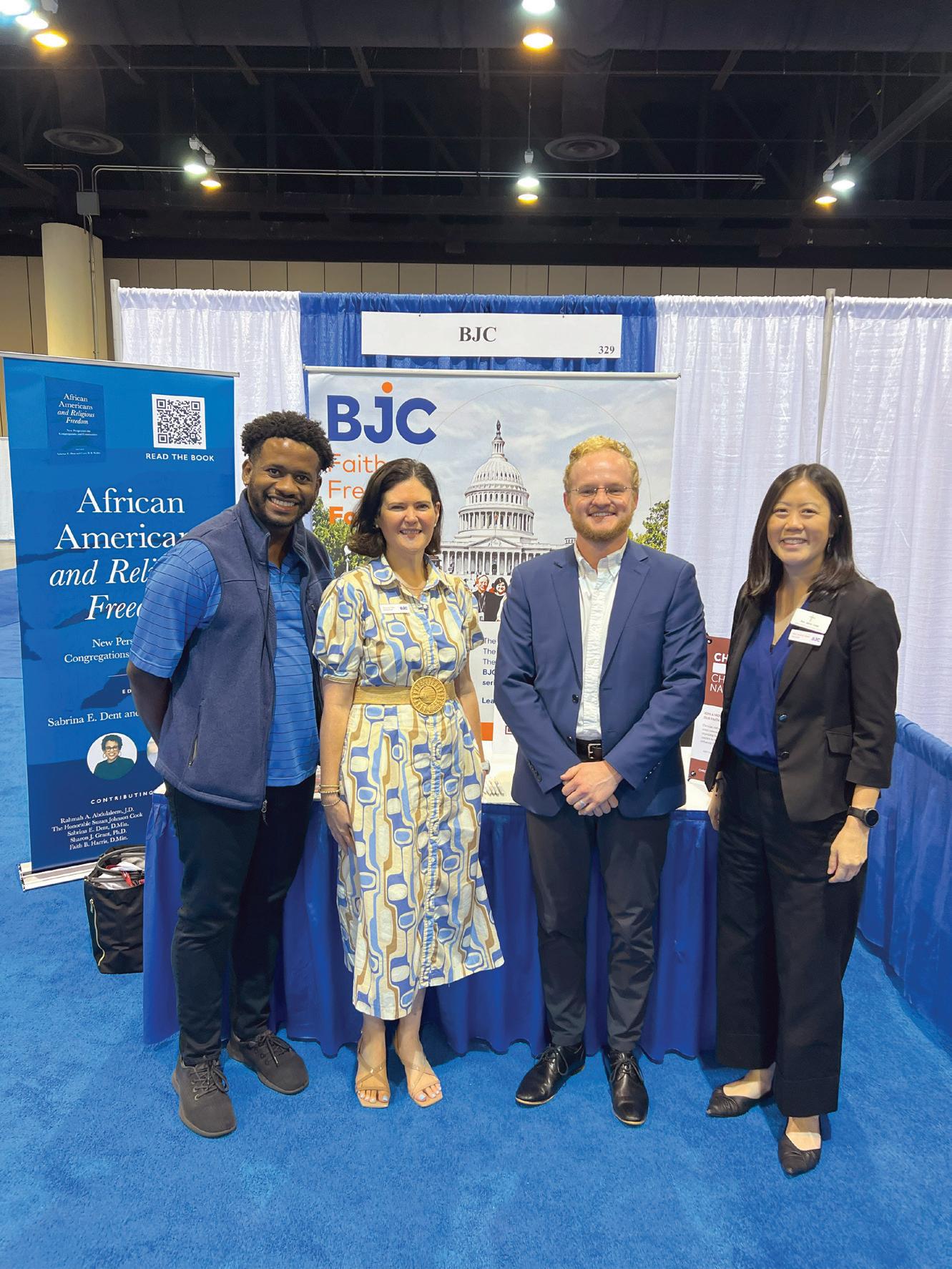
staff members participated in the 2025 Biennial Mission Summit the theme of “Come Seek Living Water.” BJC hosted a booth, allowing us to connect with many longtime supporters and people new to our work who want to get involved. People often stopped by to get resources, and we gave out several copies of the book Americans and Religious Freedom as well as copies of Report from the Capital
BJC Executive Director Amanda Tyler also signed copies of her book Press. She joined the Rev. Dr. Brian Kaylor, president & editor-in-chief of the expansion of local groups combating Christian nationalism and inviting everyone to get involved (see how you can join them on pages 16-17).
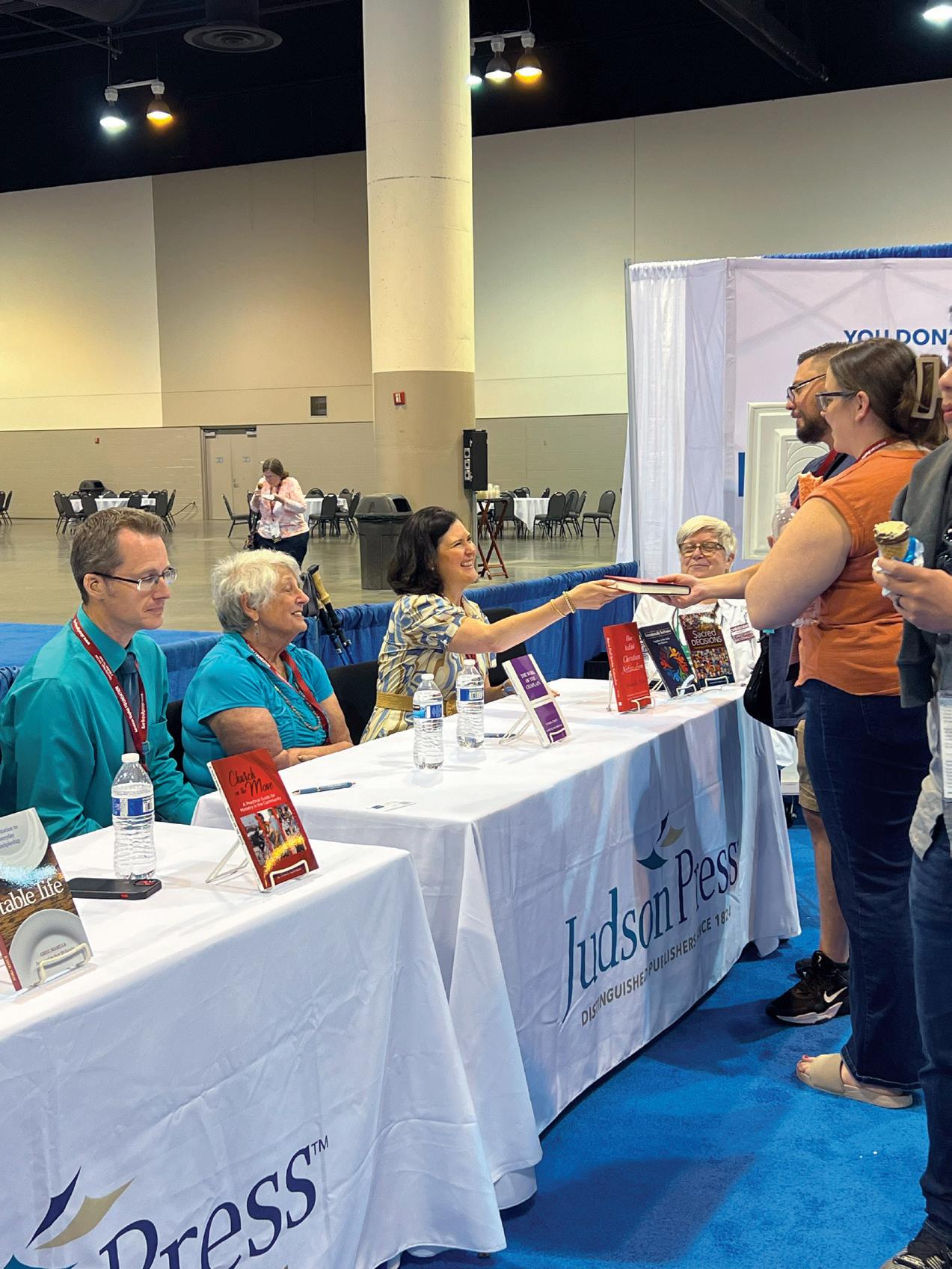
AUDREY WEST, from Lincoln, Neb., is a senior at Nebraska Wesleyan University. She is pur suing a double major in History and Gender/Sexuality Studies and a double minor in Political Science and Philosophy/Reli gion.
Previously, West completed an internship with the League of Women Voters of LincolnLancaster County in Nebraska, and she remains active in the organization.

West is the daughter of Tara Larsen and Paul West. Following graduation, she plans to attend law school and embark on a career in legal advocacy.
SONIA VARGHESE , from Gurn ee, Ill., is a student in her final semester at Loyola University Chicago, majoring in Political Science. She has experience interning with the city of Chica go and has done extensive re search work with the University of Chicago’s Political Science department, largely regarding foreign affairs and diplomacy. She is currently in the process of receiving her Paralegal Certification with Boston University’s Center for Professional Education.

The child of Paul and Gincy Varghese, Varghese grew up going to Indian-Pentecostal churches, but she now chooses to attend non-denominational Christian services. After the internship, Varghese plans to work as a paralegal and apply to law school.
Thank you to these donors whose generous support of BJC was given in honor of or in memory of someone. These gifts provide funding to help us continue to advocate for faith freedom for all.
In honor of G. W. Carlson By Douglas Carlson
In honor of Pamela Cooper-White By David Plaut
In honor of Joann Davis By Nancy Williams
In honor of Charles Foster Johnson By Robert Rhode
In honor of Fethullah Gulen By Fikret Burgazli
In honor of Jennifer Hawks By Angela Lowe
In honor of Johnny and Sharon Heflin By Heflin Family Foundation
In honor of Holly Hollman By Elizabeth Harris-Lamkin and James Lamkin
Kathryn Luckett Robert Tuttle
In honor of Walt Johnson By Irene Boczek
In honor of Jubilee Class, Grace Baptist Church of Richmond, Va. By Bernard Henderson
In honor of Kathryn Luckett By Johna Edwards
In honor of Skip Newman By Alejandro Ramirez
In honor of Amanda Tyler By Kathryn Luckett
Elizabeth Harris-Lamkin and James Lamkin
Julie and Michael Lowenberg
In honor of Anita Tyler By Johna Edwards
In honor of BJC Staff By Paula Settle
In honor of Brent Walker By Charles Haynes
In honor of Patricia Whiteside By Johna Edwards
In memory of Rev. Dr. Tommy Bratton By Deborah Miller
In memory of Mark R. Buckner By Mary Buckner
In memory of President Jimmy Carter By Nancy Moore
In memory of Beverly Davison By Nancy Moore
In memory of James M. Dunn By Elizabeth Denham Thompson Nancy Moore Charles Petty
In memory of James and Marilyn Dunn By Judy Higgins
In memory of Ray Gene Edge By Cindy Edge
In memory of J. Perry Hannah By Eunice Hannah
In memory of Robison B. James By Anne James
In memory of Orba Lee and Peggy Malone By David W. Malone and Mary Massar
In memory of Alicia Seavey By George Seavey
In memory of O. Marion Vance By Kathryn Vance
If you would like to give a gift in honor of or in memory of someone, simply send a note with your check or tell us online at BJConline.org/give.
RABBI DAVID SEGAL is BJC’s policy counsel, implementing legislative and policy reform strategies, conducting legal analysis on relevant litigation matters, and collaborating with BJC’s Christians Against Christian Nationalism network on grasstops mobilization.
After earning a bachelor’s degree at Princeton Universi ty, Segal worked as a legisla tive assistant at the Religious Action Center of Reform Judaism (RAC) in Washington, D.C.
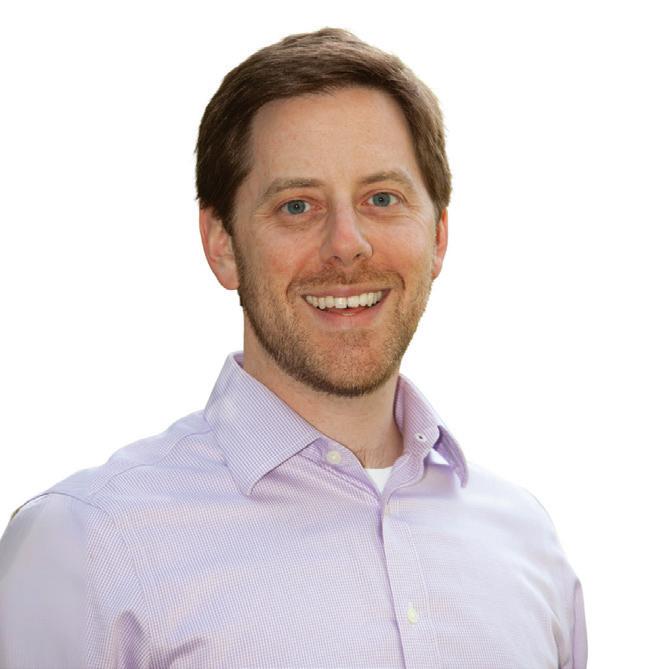
He attended rabbinical seminary at Hebrew Union College-Jewish Institute of Religion, studying in Jerusalem and New York City. After his 2010 ordination, Segal served a congregation in Aspen and the Roaring Fork Valley of Colorado with his wife and co-clergy, Cantor Rollin Simmons. In 2017, Segal founded RAC-TX as its lead organizer
While working as a community organizer, Segal felt called to law school in his path toward working at the intersection of faith and public life, and he earned his J.D. from the University of Houston Law Center in 2024.
Segal and his wife have two children and live in Houston. You can contact him at dsegal@BJConline.org
DEVIN WITHROW is the com munity engagement associ ate at BJC, providing support for BJC’s Christians Against Christian Nationalism net work and BJC’s educational outreach and programming.
A graduate of Friends University, Withrow earned his bachelor’s degree in Re ligion and Philosophy with a minor in Writing. He holds a Master of Divinity degree from Wake Forest University School of Divinity, with a concentration in Interfaith Literacy and Leadership. Currently, Withrow is working toward a Graduate Certificate in Conflict Transformation from Eastern Mennonite University’s Center for Justice and Peacebuilding.
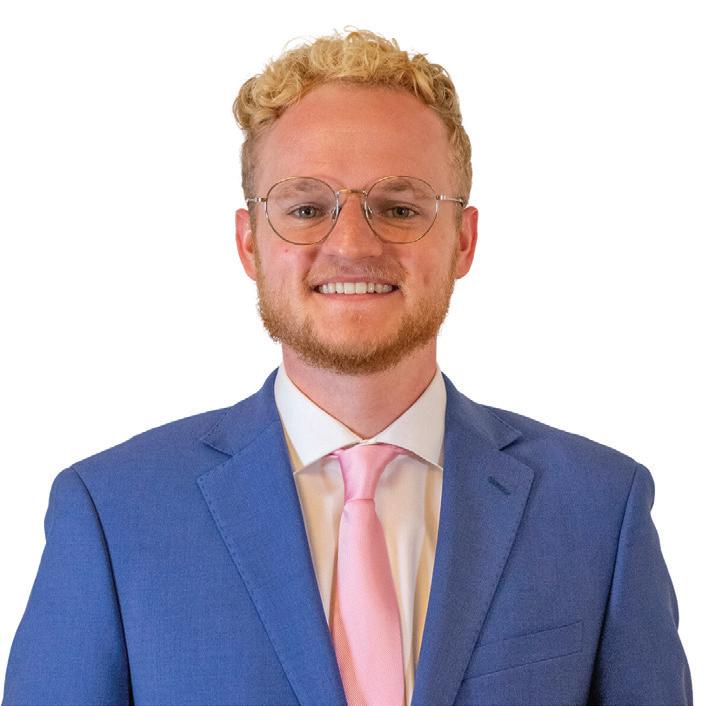
Married to Olena Withrow, he is a member of First Baptist Church on Fifth in Winston-Salem, N.C. You can contact him at dwithrow@BJConline.org
BJC welcomed three summer semester interns this year, who worked alongside our staff in Washington, D.C., from May until August.
JAELAYN GOWENS, from Green ville, S.C., is a 2025 graduate of Furman University, earning a Bach elor of Arts with a major in Business Administration and a concentration in Economics. During her time at Furman, she served as Vice Pres ident of the university’s NAACP chapter and was a pivotal leader in Unity, a mentorship initiative de signed to empower and support minority students on campus.
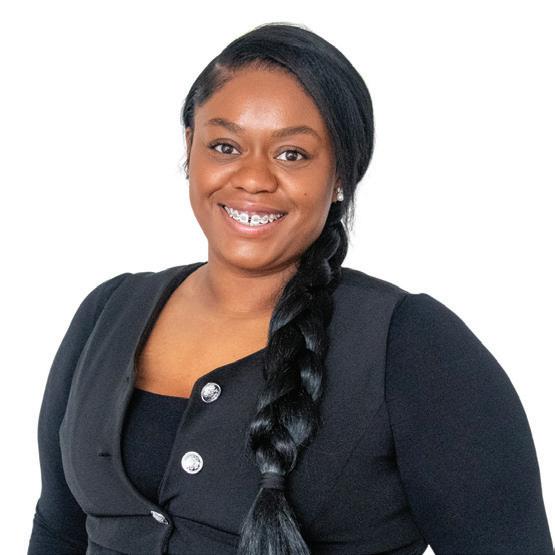
Gowens is the daughter of Ivory Hall and Derrick Gowens. After completing the internship, she plans to attend law school and pursue a career advocating for justice and systemic change.
MOHAMMAD MUSTAFA , from Dayton, Ohio, is a rising senior at The Ohio State University, ma joring in Philosophy, Politics and Economics. Originally from Nablus in Palestine, he is the founder and executive director of the Palestine Diaspora Movement, a nonprofit leading grassroots advocacy for Palestinian liberation. He has expe rience organizing national campaigns, leading political actions against the Cincinnati City Council and working on Capitol Hill with AJP Action to promote justice-centered foreign policy.
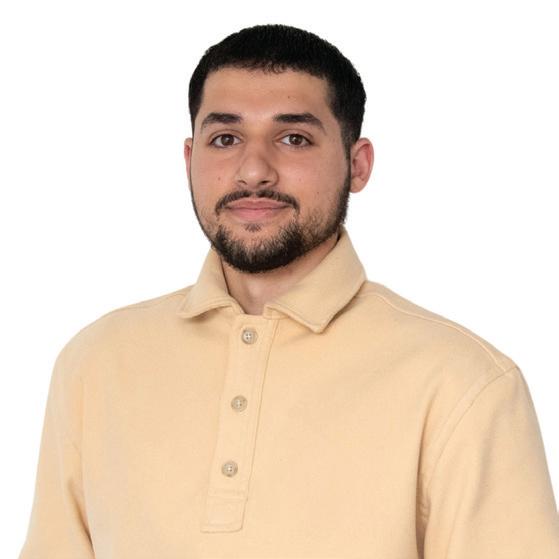
After the internship, Mustafa plans to pursue a joint law and graduate degree in law and public policy, with the goal of continuing advocacy work through legal and legislative channels.
SOPHIE ESTEVES VARVELLA
VICENTE is Brazilian-American and was raised in Mexico City, Mexico, and Springfield, N.J.
A 2024 graduate of Northeast ern University, she is a student at Vanderbilt Divinity School working towards a Master of Divinity with concentrations in Spirituality & So cial Activism and Prison & Carceral Studies. She is a James Lawson Institute Research Fellow, studying the binary of violence/non-violence.
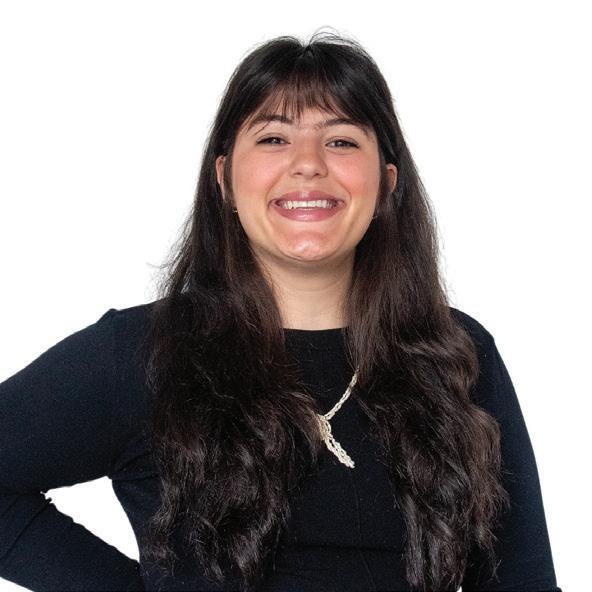
A letter-writer in Spanish and Portuguese to ICE detainees, Vicente also serves as a meditation instructor to formerly incarcerated people. She is the eldest child of Lucia Esteves Varvella Vicente and sister to Thomas Esteves Varvella Vicente. After her internship, she will begin her field education with The Porch TN, facilitating writing workshops for vulnerable populations.
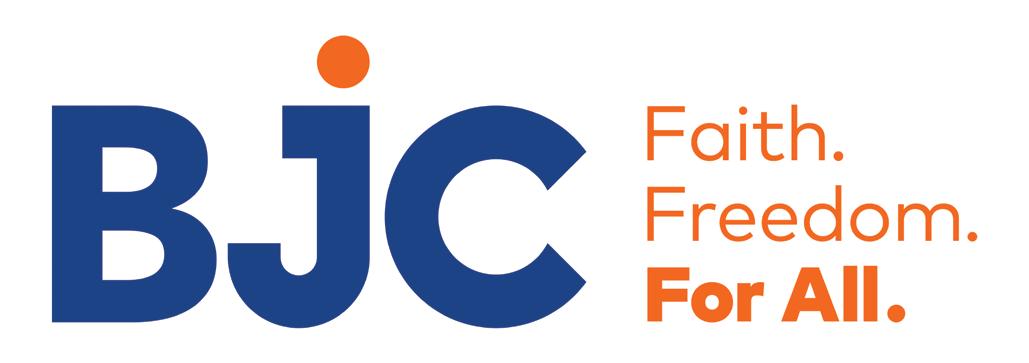
200 Maryland Ave., N.E.
Suite 301
Washington, D.C. 20002
202.544.4226
BJC@BJConline.org
BJConline.org BJConline.org/blog Facebook.com/ReligiousLiberty
@BJContheHill
Alliance of Baptists
American Baptist Churches USA
Baptist General Association of Virginia
Baptist General Convention of Texas
Convención Bautista Hispana de Texas (Hispanic Baptist Convention of Texas) Converge
Cooperative Baptist Fellowship
Cooperative Baptist Fellowship of North Carolina
Fellowship Southwest
National Baptist Convention of America
National Baptist Convention USA Inc.
National Missionary Baptist Convention
North American Baptist Conference
Progressive National Baptist Convention Inc.
Religious Liberty Council
We are attorneys, Capitol Hill insiders, ministers, mobilizers and scholars. We file briefs in pivotal Supreme Court cases, advocate for and against legislation, testify in Congress and unite with others across faiths to ensure that all Americans have, and will always have, the right to follow their spiritual beliefs. REPORT FROM THE CAPITAL
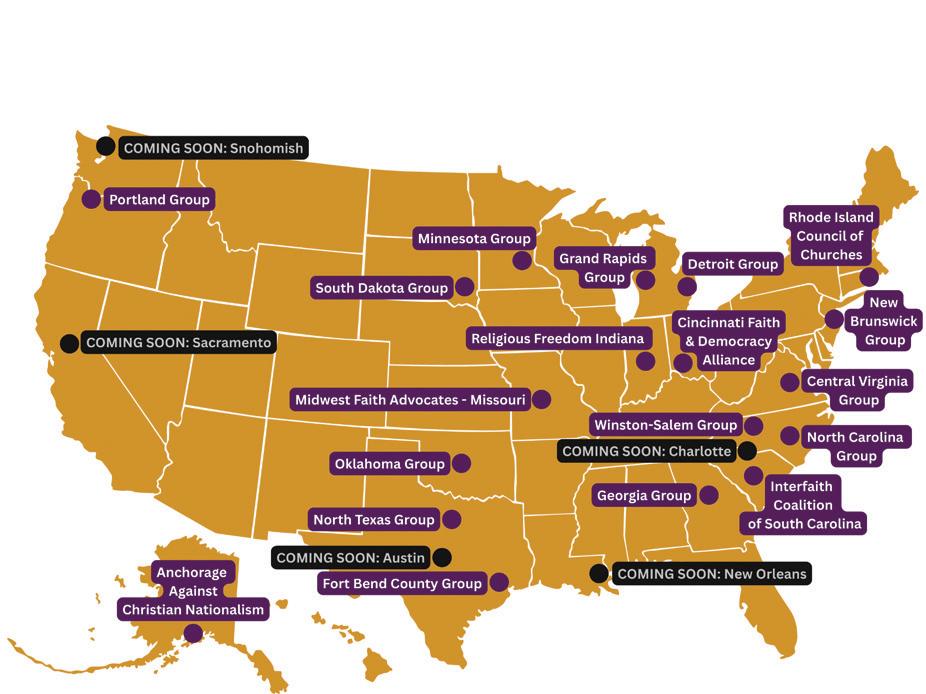
Local groups are working to counter Christian nationalism, and more are being added. See how you can connect with one near you on pages 16-17.

